Risultati: 487
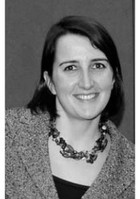
Funzione/Ruolo
Ricercatrice presso la Banca d’Italia, Dipartimento Economia e Statistica, Servizio Struttura Economica, Divisione Economia e Diritto
Percorso professionale
Ha conseguito la laurea specialistica in Discipline Economiche e Sociali presso l’Università Commerciale L. Bocconi nel 2007, sotto la supervisione della prof.ssa Eliana La Ferrara. Nello stesso anno ha svolto un periodo di internship presso la Commissione Europea, DG Development, a Bruxelles. Nel 2014 ha ottenuto il PhD in Economics presso la University College London. Dal 2012 lavora come ricercatrice presso il Dipartimento Economia e Statistica della Banca d’Italia.
Risultati scientifici
L’attività di ricerca di Lucia Rizzica si sviluppa nel campo della microeconomia applicata, spaziando tra temi diversi: da quelli legati all’emigrazione dai paesi in via di sviluppo e ai suoi effetti sul paese d’origine, a quelli dell’economia del lavoro, in particolare l’offerta di lavoro femminile e il pubblico impiego, a quelli legati allo sviluppo del capitale umano, con particolare attenzione all’accesso all’istruzione universitaria.
Negli ultimi anni, inoltre, ha avviato alcuni progetti di ricerca volti a misurare l’entità e stimare l’impatto dell’attività criminale sull’economia italiana, focalizzandosi specialmente sulla criminalità organizzata e sulla corruzione.
Attività editoriali e pubblicazioni
Lucia Rizzica è autrice delle seguenti pubblicazioni scientifiche:
(2018) Carta F , Rizzica L. Early Kindergarten, maternal labor supply and children’s outcomes: evidence from Italy. Journal of Public Economics,58: 79–102.
(2018) Rizzica L.When the cat’s away…the effect of spousal migration on investments on children.The World Bank Economic Review, forthcoming, doi: 10.1093/wber/lhw050.
(2008) Rizzica L. The Impact of Skilled Migration on the Sending Country: Evidence from African Medical Brain Drain. Rivista di Politica Economica, vol. 98(6).
Ha inoltre pubblicato i seguenti articoli sulle collane editoriali della Banca d’Italia:
(2016) Rizzica L.Why go public? A study on the individual determinants of public sector employment choice.Questioni di Economia e Finanza (Occasional Papers) 343, Bank of Italy, Economic Research and International Relations Area.
(2016) Giorgiantonio C, Orlando T, Palumbo G, Rizzica L.Incentivi e selezione nel pubblico impiego.Questioni di Economia e Finanza (Occasional Papers) 342, Bank of Italy, Economic Research and International Relations Area.
(2016) Occhilupo R, Rizzica L. Incentivi e valutazione dei dirigenti pubblici. Questioni di Economia e Finanza (Occasional Papers) 310, Bank of Italy, Economic Research and International Relations Area.
(2015) Rizzica L.,The use of fixed term contracts and the (adverse) selection of public sector workers.Temi di discussione (Economic working papers) 1041, Bank of Italy, Economic Research and International Relations Area.
(2015) Rizzica L, Tonello M. Exposure to media and corruption perceptions. Temi di discussione (Economic working papers) 1043, Bank of Italy, Economic Research and International Relations Area.
(2014) Cassetta A, Pauselli C, Rizzica L, Tonello M. Exploring flows to tax havens through means of a gravity model: evidence from Italy.Questioni di Economia e Finanza (Occasional Papers) 236, Bank of Italy, Economic Research and International Relations Area.
(2013) Rizzica L.Home or away? Gender differences in the effects of an expansion of tertiary education supply.Questioni di Economia e Finanza (Occasional Papers) 181, Bank of Italy, Economic Research and International Relations Area.
Riconoscimenti e premi
Durante gli studi all’università Bocconi, Lucia Rizzica ha ricevuto la borsa di studio per studenti eccellenti (Bocconi Graduate Merit Awards).
Con la tesi di laurea specialistica Doctors on the move: an empirical study on African Medical Brain Drain ha vinto il premio Angelo Costa, indetto da Confindustria, e il premio Fausto Vicarelli, promosso dall’EIEF.
Nel corso degli studi di dottorato, ha ricevuto prima la borsa di studio del Centro Studi Luca d’Agliano, poi la borsa di studio intitolata a B. Stringher, erogata dalla Banca d’Italia e, infine, la borsa W. M. Gorman della Univeristy College of London. Ha inoltre vinto, rinunciandovi per incompatibilità con le altre borse di studio, la borsa di studio Giovanna Crivelli finanziata da Unicredit.
Nel 2015, con l’articolo Female Employment and pre-kindergarten: on the unintended effects of an Italian reform, ha vinto, con Francesca Carta, il premio “Etta Chiuri”, promosso dalla Società Italiana di Economia Pubblica (SIEP) e l’International Institute of Public Finance (IIPF) Young Economist Award. Nello stesso anno, con Marco Tonello, ha vinto il premio Giorgio Rota dell’Istituto Einaudi, per il paper Persuadable Perceptions: media exposure and corruption measures.

Funzione/Ruolo
Proprietaria, fondatrice e Amministratrice delegata di Communis srl s.u. Presidente di Assist Ass. Naz. Atlete
Percorso professionale
Professionista esperta di comunicazione, relazioni istituzionali, eventi, marketing sportivo.
Giornalista e formatrice, è una esperta di politiche di genere ed attivista per i diritti delle donne e delle persone LGBTIQA+.
Ha acquisito un’esperienza trentennale nell’ambito della comunicazione istituzionale e degli uffici stampa, gestiti per grandi clienti e prestigiose realtà istituzionali e associative. Al momento responsabile ufficio stampa di Differenza Donna Aps e del 1522 numero nazionale del Dipartimento Pari Opportunità
Presidente e fondatrice dal 2000 di Assist Associazione Nazionale Atlete, realtà impegnata nella tutela dei diritti collettivi delle donne nello sport, è anche nel board dell’Italian Organizing Commettee, One Billion Rising, coordinamento italiano dell'evento mondiale contro la violenza sulle donne voluto dalla drammaturga statunitense Eve Ensler.
Ha ricoperto la direzione marketing di numerose realtà sportive professionistiche e ha organizzato numerosi grandi eventi di pallavolo e beach volley.
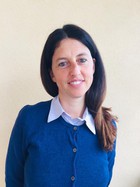
Funzione/Ruolo
Docente a contratto di due laboratori di Cooperazione allo sviluppo nazionale e internazionale presso l’Università degli Studi di Milano-Bicocca, Dipartimento di Sociologia, e Cultrice della materia Storia e Istituzioni dei paesi islamici presso l’Università degli Studi di Milano, Dipartimento di Studi internazionali, giuridici e storico-politici
Percorso professionale
Dopo la laurea in Storia conseguita cum laude presso l’Università degli Studi di Milano con una tesi sulla Tunisia di Ben Ali (2005), prosegue la formazione accademica con un master sul mondo arabo-musulmano presso la Université Aix-Marseille (Aix-en-Provence, 2006) e quindi presso la facoltà di Scienze Politiche dell’Università degli Studi di Milano con un dottorato di ricerca in Storia Internazionale (2010). In quel periodo comincia la sua collaborazione con il prof. Gian Paolo Calchi Novati, insigne africanista dell’Università degli Studi di Pavia, che continuerà sino alla sua scomparsa (2017). Svolgeranno insieme brevi progetti di ricerca sulla politica estera dell’Italia verso il Nord Africa (per il Centro Studi per l’Asia e l’Oriente, Roma 2013-2014), sulle relazioni UE-Nigeria (report ISPI, Milano 2014) e UE-Israele (numero speciale de Il Ponte, Firenze 2015), attività di docenza e pubblicazioni. Nel 2012 è stata tutor e docente del corso “MediOrienti. Attori, dinamiche, prospettive” organizzato presso la Fondazione Collegio delle Università milanesi. Nel 2014 ha collaborato con la Fondazione Eni Enrico Mattei (FEEM, Milano) per l’organizzazione della Summer School all’interno del progetto “Economy and Society” e nel biennio 2014-2015 ha partecipato alla ricerca “Conoscere il meticciato-governare il cambiamento” della Fondazione Oasis (Venezia, Milano). Dal 2014 è docente presso l’Università degli Studi di Milano-Bicocca di un laboratorio sulla cooperazione nazionale e internazionale allo sviluppo (corso di laurea in Sociologia) che coinvolge direttamente in aula organizzazioni no profit e che nel 2017 è stato istituito anche nel corso di laurea in Scienze dell’organizzazione. Dal 2017 è cultrice della materia presso la cattedra di Storia e istituzioni dei paesi islamici, ruolo già in precedenza ricoperto presso le cattedre di Storia e istituzioni dell’Africa (2011-2014) e di Storia delle Relazioni Internazionali (2006-2007) dell’Università degli Studi di Milano.
Risultati scientifici
Si occupa dal 2009 di storia contemporanea algerina. La sua ricerca di dottorato svoltasi tra gli archivi algerini e militari francesi e poi pubblicata per Mimesis edizioni (2012) si è inserita nel trend emergente di studi sull’internazionalizzazione della Guerra d’Algeria (1954-1962). I suoi filoni di ricerca riguardano: la storia politica istituzionale algerina dall’epoca coloniale a oggi, con particolare riferimento alle dinamiche tra forze politiche algerine e all’uso dei nazionalismi; la storia regionale nordafricana, intesa e analizzata come un’area in cui i cinque paesi (Marocco, Algeria, Tunisia, Libia ed Egitto) hanno vissuto fasi storiche comuni dominate da ideologie transnazionali declinate localmente. Ha curato l’aggiornamento bibliografico e nei contenuti (riedizione del 2018) del rinomato testo sulla storia dell’Algeria dall’indipendenza in poi di Calchi Novati per Bompiani per cui ha anche scritto una sintesi divulgativo-scientifica di storia regionale del Nord Africa (2019). Tiene lezioni e seminari sulla storia contemporanea e attualità dell’Algeria, del Nord Africa e delle relazioni euro-mediterranee presso Università, Centri Studi e Think Tank ed è chiamata a intervenire come ospite da emittenti radio e testate giornalistiche. Partecipa a convegni e simposi accademici, conciliando l’attività di ricerca con quella divulgativo-scientifica.
Attività editoriali e pubblicazioni
[2019] Roggero C., Storia del Nord Africa indipendente. Tra imperialismi, nazionalismi e autoritarismi, Bompiani, Milano.
[2019] Roggero C., Il popolo e l’esercito, i due fronti della storia contemporanea algerina, Il Ponte, anno LXXV, n. 3, maggio-giugno 2019.
[2018] Roggero C., Calchi Novati, G.P., Storia dell’Algeria indipendente. Dalla guerra di liberazione a Bouteflika, Bompiani, Milano.
[2016] Roggero C., Equilibrismi europei tra solidarietà e sicurezza: la sfida delle migrazioni, in Pin A. e Pellegrino C., (eds.), Europa e Islam: attualità di una relazione, Marsilio e-book, Venezia.
[2016] Roggero C., Parabole di conversione. Viaggio insolito attraverso la secolarizzazione, in Salmeri G., (ed.), Troppa religione o troppo poca? Cristiani e musulmani alla prova della secolarizzazione, Marsilio e-book, Venezia 2016.
[2016] Roggero C., Algerian Tightrope: a Balancing Exercise on the Brink of a Crisis, in IEMed Mediterranean Yearbook 2016, European Institute of the Mediterranean, Barcelona.
[2015] Roggero C., L’Unione europea tra scelte e non scelte, in Calchi Novati, G.P. e Roggero C.(eds.), La questione israeliana, numero speciale de Il Ponte, anno LXXI nn. 11-12, novembre-dicembre 2015.
[2015] Roggero C., Sahara, nucleo del disordine. Dalla Libia alla costa atlantica(Sahara, Heart of the Disorder. From Libya to the Atlantic Coast), in Pilati, A, Sapelli G., (eds.), Il nuovo disordine internazionale. Conflitti politici, cambiamenti tecnologici ed evoluzioni strategiche, Centro Studi Fondazione Magna Carta-Osservatorio Politico.
[2015] Roggero C., Lo Stato islamico tra realtà e utopia. Nord Africa e modelli globali,in Plebani, A., Diez, M., (eds.), La galassia fondamentalista. Tra jihad armato e partecipazione politica, e-book Marsilio, Venezia.
[2015] Roggero C., Riconoscersi cittadini. Per una nuova indipendenza algerina, in Massimo Zaccaria, Airò B. (eds.), I confini della cittadinanza nel nuovo Medio Oriente, Quaderni di Asia, Major n. 2, Viella, Roma.
[2014] Roggero C., Le organizzazioni regionali: incroci, contraddizioni, debolezze, in Aliboni R., e Calchi Novati, G.P. (eds.), Il Nord Africa nel nuovo contesto mediterraneo e la politica dell’Italia, Rapporto Csiao-Centro studi italiano per l’Africa e l’Oriente, marzo 2014.
[2014] Roggero C., Un accordo particolare con l’Unione europea, in Calchi Novati, G.P. e Montanini, M., (eds.), La Nigeria in Africa e la politica dell’Italia, Rapporto Ispi per il Ministero degli Affari esteri e della cooperazione internazionale, Oct. 2014.
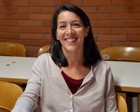
Funzione/Ruolo
Professoressa associata di Economia aziendale all’Università di Pisa.
Percorso professionale
Dopo aver conseguito la laurea in Economia aziendale all’Università di Pisa, lavora alla Consob nella divisione Intermediari e nella divisione Ispettorato. Frequenta il corso di specializzazione in Borse Valori e altri mercati regolamentati presso l’Università Bocconi di Milano e consegue il dottorato in Economia aziendale all’Università di Pisa. Dal 2009 è ricercatrice a tempo indeterminato di Economia aziendale e insegna Corporate governance nella laurea magistrale di Strategia, Management e Controllo presso l’Università di Pisa. Dal 2018 è Professoressa Associata e insegna anche Economia dei servizi pubblici e dei settori regolamentati e Economia aziendale. È stata visiting scholar presso l’Università di Lisbona (CERIS/CESUR) e l’Università di Granada (Instituto del Agua). È membro, fra gli altri, del centro ricerca REMARC (Responsible Management Research Center) e del network Advances in Cleaner Production. Ha collaborazioni di ricerca multidisciplinari con studiosi e studiose in Italia e all’estero.
Risultati scientifici
L’attività di ricerca di Giulia Romano riguarda la corporate governance e le performance di aziende di diversa tipologia. Dopo una prima fase in cui si è concentrata sulle società quotate e sul ruolo del private equity, si è concentrata sui settori di pubblica utilità come il settore idrico e quello della gestione dei rifiuti urbani e sulla sostenibilità economica, ambientale e sociale. Particolare interesse è stato dedicato allo studio delle relazioni fra azionariato e corporate governance e performance e strategie aziendali. Più recentemente si sta occupando di economia circolare e modelli di governance cooperativi e partecipativi.
Attività editoriali e pubblicazioni
[2022] Romano G, Marciano C, Minoja M. Successful remunicipalization processes in Italian waste management: triggers, key success factors, and results. International Review of Administrative Sciences, 10.1177/00208523221077574.
[2022] Romano G, Rapposelli A, Lombardi GV, Gastaldi M. The factors affecting Italian provinces’ separate waste-collection rates: An empirical investigation. Waste Management, 139:217-226.
[2021] Minoja M, Romano G. Managing intellectual capital for sustainability: Evidence from a Re-municipalized, publicly owned waste management firm, Journal of Cleaner Production, 279:123213.
[2021] Romano G, Marciano C, Fiorelli MS. Best practices in Urban Solid Waste Management: Ownership, Governance, and Drivers of Performance in a Zero Waste Framework, Emerald Publishing, Bingley, UK.
[2021] Romano G, Masserini L, Lombardi GV. Environmental performance of waste management: Impacts of corruption and public maladministration in Italy, Journal of Cleaner Production, 288:125521.
[2019] Romano G. Le cooperative idriche in Italia e in Europa. Evoluzione, assetti di governance, performance e prospettive della gestione delle community-owned water supplies, FrancoAngeli, Milano.
[2019] Romano G, Rapposelli A, Marrucci L. Improving waste production and recycling through zero-waste strategy and privatization: An empirical investigation, Resources, Conservation & Recycling, 146:256-263.
[2014] Romano G, Guerrini A. The effects of ownership, board size and board composition on the performance of Italian water utilities, Utilities Policy, 31:18-28.
[2014] Guerrini A, Romano G. Water Management in Italy. Governance, Performance and Sustainability, Springer.
[2012] Romano G, Guerrini A. Corporate Governance and Accounting Enforcement Actions in Italy, Managerial Auditing Journal, 27:622-638.
[2012] Romano G. Strategie aziendali e quotazione in borsa. p. 1-282, Milano: GIUFFRE' EDITORE.
[2011] Romano G, Guerrini A. Measuring and comparing the efficiency of water utility companies: A data envelopment analysis approach. Utilities Policy, 19:202-209.
Riconoscimenti e premi
Premio giovani ricercatori dell’Università di Pisa (2011 e 2013).
Due dei suoi articoli sono stati inclusi fra i “most cited” Utilities Policy articles.
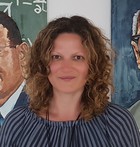
Funzione/Ruolo
Professoressa di Economia Politica alla Lancaster University (UK)
Percorso professionale
Dopo aver conseguito la laurea in Scienze Politiche presso l'Università di Roma La Sapienza nel 2000, prosegue la sua formazione con il master in Economia e Metodi Quantitativi presso l’Università degli studi di Roma Tor Vergata, nella stessa università nel 2006 consegue il dottorato di ricerca in Economia e Istituzioni. Dal 2005 al 2006 è ricercatrice a progetto presso l’Istituto Nazionale di Statistica. Dal 2006 al 2008 è assegnista di ricerca presso l’Università Cattolica del Sacro Cuore di Milano. Nel 2008 diventa ricercatrice universitaria presso il Dipartimento di Scienze Economiche e Aziendali dell’Università degli Studi di Pavia, dove nel 2014 diventa professoressa associata e poi ordinaria di Economia politica. Nel settembre 2021 si trasferisce in Inghilterra alla Lancaster University. È stata visiting professorpresso diversi atenei tra cui l’University of British Columbia (UBC), il CREI dell’University of Pompeu Fabra di Barcellona, la Christian Albrecht Universitye l’IfWdi Kiel, l’EIEF di Roma. Dal 2017 svolge attività di consulente esperta per la Commissione Europea. E’ membro dell’Editorial Board dell’Italian Economic Journal.
Risultati scientifici
L’attività di ricerca di Lorenza Rossi si svolge nel campo dell’economia politica e della macroeconomia, con attenzione all’analisi del ciclo economico e agli effetti delle politiche monetarie e fiscali. In questo ambito ha studiato gli effetti delle politiche monetarie in una situazione di accesso limitato ai mercati finanziari, dimostrando che ci possono essere importanti effetti redistributivi associati a tali politiche. Un secondo filone di ricerca riguarda l’analisi della dinamica delle imprese, in entrata e in uscita dal mercato, e dei suoi effetti sull’andamento del prodotto interno lordo e del ciclo economico nel suo complesso. In uno dei suoi studi ha analizzato la scelta delle imprese di entrare e di uscire dal mercato in presenza di mercati finanziari inefficienti. La sua analisi dimostra che l’interazione tra la dinamica delle imprese e i mercati finanziari riveste un ruolo fondamentale per le fluttuazioni del ciclo economico. In particolare, in presenza di elevata volatilità sui mercati, le decisioni delle imprese di uscire dal mercato dipendono dalla fonte di incertezza, sia essa di natura reale o di natura monetaria.
Attività editoriali e pubblicazioni
Lorenza Rossi è autrice di numerose pubblicazioni, tra cui:
[2018] Rossi L. Are Uncertainty Shock Aggregate Demand Shocks?.Economics Letters, vol. 167, pp. 142-146, with Stefano Fasani.
[2018] Rossi L. Firms Endogenous Entry and Monopolistic Banking in a DSGE model. Macroeconomic Dynamics, vol. 22, pp. 153-171, with Carla La Croce.
[2017] Rossi L. Limited Asset Market Participation, Sticky Wages and Monetary Policy. Economic Inquiry, vol. 75, pp. 879-897, with Guido Ascari and Andrea Colciago.
[2015] Rossi L. New-Keynesian Phillips Curve with Bertrand Competition and Endogenous Entry. Journal of Economic Dynamics and Control, vol. 51, pp. 318-340, with F. Etro.
[2015] Rossi L. Policy Games, Distributional Conflicts and the Optimal Inflation. Macroeconomic Dynamics, vol. 19(6), 12 61-1293, with A. Albonico.
[2015] Rossi L. Firms Dynamics, Endogenous markups and the Labor Share of Income. Macroeconomic Dynamics, vol. 19(6) 1309-1331, with A. Colciago.
[2015] Rossi L. Taylor Rules, Long-Run Growth and Real Uncertainty. Economics Letters, vol. 133, pp. 31-34, with B. Annicchiarico.
[2013] Unions Power, Collective Bargaining and Optimal Monetary. Economic Inquiry, vol. 51(1), pp. 408-427, with E. Faia.
[2012] Rossi L. Trend Inflation and Firms Price-Setting: Rotemberg vs. Calvo. The Economic Journal, vol. 122, Issue 563, pp. 115-1141, with G. Ascari.
[2011] Rossi L. Monetary Policy and Automatic Stabilizers, the Role of Progressive Taxation. Journal of Money, Credit and Banking, vol.44(5), pp. 825-862, with F. Mattesini.
[2011] Rossi L. Calvo vs. Rotemberg in a Trend Inflation World: An Empirical Investigation. Journal of Economic Dynamics and Control, vol. 35, pp. 1852--1867, with G. Ascari and E. Castelnuovo.
[2009] Rossi L. Optimal Monetary Policy in Economies with Dual Labor Markets. Journal of Economic Dynamics and Control, vol. 33, 1469-14, with F. Mattesini.
Riconoscimenti e premi
Lorenza Rossi è fellow dell’EABCN (Euro Area Business Cycle Network), e del CEIS di Tor Vergata. Nel 2011 ha vinto il premio “Mela D'oro” della XXIII Edizione del Premio della Fondazione Marisa Bellissario dal titolo: "Donne Innovazione e Capitale Umano”, come migliore ricercatrice under 35 dell’area Area Economica 13 del CUN. E’ inoltre vincitrice di diversi progetti di ricerca finanziati dal MIUR e dalla Commissione Europea.

Area STEM: Chimica
Competenze: alternative alle sperimentazioni animali, autorizzazioni alimentari, componenti cosmetici, cromatografia, dossier sostanze chimiche, validazione nuovi metodi
Parole chiave: cosmetici, mangimi, metodi tossicologici ufficiali, regolamento reach, sperimentazioni animali, test in vitro, test su animali
Regione: Lombardia
Funzione/Ruolo
Scientific Officer presso CAAT-Europe (Università di Konstanz in Germania, Project Manager presso REACH Mastery)
Percorso professionale
Dopo la laurea in Chimica a indirizzo bio-organico all'Università degli Studi di Milano nel 1989, trascorre 10 mesi in Germania come chemist trainee presso la Hewlett Packard (ora Agilent Technology). Da giugno dello stesso anno è Applicant specialist in Cromatografia (tecnica che permette il riconoscimento quantitativo e qualitativo dei diversi componenti presenti in una miscela). Ricopre nell'arco di 15 anni vari ruoli organizzativi e dirigenziali in aziende e istituzioni internazionali, per arrivare nel 2005 a un incarico triennale all'ECVAM (Centro per le convalide dei metodi alternativi della Commissione Europea) dove partecipa a due gruppi di lavoro: sviluppo del RIP 3.3 (REACH Implementation Project, Technical Guidelines to Industries) e, come coordinatrice, al progetto europeo sullo sviluppo di metodi integrati e alternativi ai test sugli animali. Dal 2009 è Scientific Officer per il progetto di collaborazione con CAAT - Europe (Centro per le Alternative ai test sugli Animali) presso l'Università di Konstanz in Germania e lavora in stretta collaborazione con CAAT presso la John Hopkins University di Baltimora (USA). Da 7 anni Maria Costanza Rovida è anche Project Manager Presso REACH Mastery, società di consulenza per gli adempimenti del regolamento Reach, adottato dalla Ue per migliorare la protezione della salute dell'uomo e dell'ambiente dai rischi delle sostanze chimiche.
Risultati scientifici
Maria Costanza Rovida è da anni impegnata nell'individuare strategie che possano ridurre o evitare l'utilizzo di animali vertebrati nei test di laboratorio. Come Project Manager REACH Mastery e in quanto esperta nella costruzione di testing strategies, si occupa anche di compilare e registrare dossier per valutare le sostanze chimiche, per le autorizzazioni in ambito alimentare o a uso zootecnico, e per definire linee guida per gli ingredienti dei cosmetici, in conformità a regolamenti UE o extra UE. Maria Costanza Rovida è anche docente presso l'Associazione Ambiente & Lavoro relativamente agli aspetti della sicurezza previsti dai regolamenti REACH e CLP (che garantiscono che i rischi presentati dalle sostanze chimiche siano chiaramente comunicati ai lavoratori e ai consumatori nell'Unione europea attraverso la classificazione e l'etichettatura delle sostanze chimiche). Il suo impegno costante resta quello di organizzare incontri e divulgare attraverso numerosi articoli scientifici lo sviluppo e la promozione di test tossicologici scientificamente avanzati che non prevedano l'utilizzo di animali in laboratorio, e di diffondere la cultura della sicurezza attenendosi alle linee guida della farmacopea europea, della ICH (International Conference on Harmonisation), della FDA (Food and Drug Administration) e del Centro per le convalide dei metodi alternativi della Commissione Europea.
Attività editoriali e pubblicazioni
È autrice di numerose pubblicazioni scientifiche internazionali, fra cui:
(2015) Rovida C, Asakura S, Daneshian M, Hofman-Huether H, Leist M, Meunier L, Reif D, Rossi A, Schmutz M, Valentin JP, Zurlo J, Hartung T. Toxicity testing in the 21st century beyond environmental chemicals. ALTEX Alternatives to Animal Experimentation, 32(3):171-81.
(2015) Rovida C, Alépée N, Api AM, Basketter DA, Bois FY, Caloni F, Corsini E, Daneshian M, Eskes C, Ezendam J, Fuchs H, Hayden P, Hegele-Hartung C, Hoffmann S, Hubesch B, Jacobs MN, Jaworska J, Kleensang A, Kleinstreuer N, Lalko J, Landsiedel R, Lebreux F, Luechtefeld T, Locatelli M, Mehling A, Natsch A, Pitchford JW, Prater D, Prieto P, Schepky A, Schuurmann G, Smirnova L, Toole C, van Vliet E, Weisensee D, Hartung T. Integrated Testing Strategies (ITS) for safety assessment. ALTEX Alternatives to Animal Experimentation, 32(1): 25-40.
(2014) Rovida C, Vivier M, Garthoff B, Hescheler J. ESNATS Conference — The Use of Human Embryonic Stem Cells for Novel Toxicity Testing Approaches. ATLA Alternatives to Laboratory Animals, 42, 97-113.
(2014) Knight J, Rovida, C. Safety Evaluations under the Proposed US Safe Cosmetics and Personal Care Products Act of 2013: Animal Use and Cost Estimates. ALTEX Alternatives to Animal Experimentation, 31(2):177-208.
(2013) Rovida C, De Angelis I, Lorenzetti S. Alternative in vitro methods to characterize the role of Endocrine Active Substances (EASs) in hormone-targeted tissues. ALTEX Alternatives to Animal Experimentation, 30(2):253-5.
(2013) Rovida C, Martin SF, Vivier M, Weltzien HU, Roggen E. Advanced tests for skin and respiratory sensitization assessment. Summary Report on the Sens-it-iv End Congress in Brussels, November 23-25, 2011. ALTEX Alternatives to Animal Experimentation, 30(2), 231-252.
(2011) Rovida C, Longo F, Rabbit RR. How are Reproductive Toxicity and Developmental Toxicity Addressed in REACH Dossiers? ALTEX Alternatives to Animal Experimentation, 28(3), 111-132.
(2011) Rovida C. Local Lymph Node Assay: How testing laboratories apply OECD TG 429 for REACH purposes. ALTEX Alternatives to Animal Experimentation, 28(2), 117-129.
(2010) Rovida C. Food for Thought... Why No New In Vitro Tests Will Be Done for REACH by Registrants. ALTEX, Alternatives to Animal Experimentation, 27(3), 175-183.
(2009) Hartung T, Rovida C. Opinion. Chemical regulators have overreached. Nature, 460, 1080-1.
Riconoscimenti e premi
Maria Costanza Rovida è Consigliera presso l'Ordine interprovinciale dei chimici della Lombardia e Accredited Stakeholder presso l'Agenzia Europea per le Sostanze Chimiche (ECHA). Fa parte del Gruppo di esperti per il Centro di Referenza Nazionale per i Metodi Alternativi, Benessere e Cura degli Animali da Laboratorio (Istituto Zooprofilattico di Brescia), di ESTAF (ECVAM Stakeholder Forum), IPAM (Italian Platform for Alternative Methods) e del board di ECOPA (Eropean Platform for Alternative Methods). Fa parte inoltre di diverse società scientifiche, fra cui la EUSAAT (European Society for Alternatives to Animal Testing), la ESTIV (European Society of in vitro testing) e l'AFI (Associazione Farmaceutici e Industria). È nell'elenco dei consulenti STOA (European Parliament Science and Technology Options Assessment).

Funzione/Ruolo
Professoressa ordinaria di Neuroscienze Cognitive presso la SISSA (Scuola Internazionale Superiore di Studi Avanzati) di Trieste
Percorso professionale
Dopo aver conseguito la laurea in Filosofia (indirizzo Psicologico) presso l'Università di Bologna nel 1990, prosegue la sua formazione nella stessa università e nel 1995 consegue il dottorato di ricerca in Psicologia. Durante il dottorato collabora per la sua ricerca con il professor Glyn Humphreys, della School of Psychology della Birmingham University, in Gran Bretagna. Tale collaborazione sfocia nel conseguimento della specializzazione in Neuropsicologia Cognitiva. Nel 1995 entra a far parte del settore di neuroscienze cognitive, presso la SISSA (Scuola Internazionale Superiore di Studi Avanzati) di Trieste, prima come research fellow, successivamente come borsista post-dottorato, e infine come assegnista. Sempre presso la SISSA, nel 1999 è ricercatrice, e nel 2003 diventa professoressa associata. Nel dicembre del 2011 prende servizio come professoressa straordinaria, e dal dicembre del 2014 è professoressa ordinaria di Neuroscienze Cognitive. Nel 2017 è nominata consigliera dell'ANVUR, di cui è vice-presidente per il biennio 2018-2019.
Risultati scientifici
Il principale interesse di ricerca di Raffaella Rumiati è lo studio delle basi neurali delle funzioni cognitive umane. Per circa 25 anni si è dedicata a caratterizzare la relazione tra sistema motorio e cognizione. Avvalendosi di diversi metodi di neuropsicologia (TMS e fMRI), ha dimostrato come il sistema motorio è sì coinvolto in funzioni non tipicamente motorie (per esempio, immaginazione, riconoscimento di azioni e oggetti, e comprensione del linguaggio), ma che tale coinvolgimento non è automatico bensì avviene solo in determinate circostanze. La scoperta è che l'immaginazione motoria agisce come una "colla" fra queste due aree apparentemente molto diverse. Più recentemente, Rumiati ha affrontato nuove linee di ricerca. La prima riguarda studio del decision making economico, perseguita ricorrendo a esperimenti sia comportamentali, sia di neuroimmagine. La seconda riguarda la rappresentazione neurale delle conoscenze sociali, indagata prevalentemente esaminando le prestazioni a prove lessicali-semantiche di pazienti con lesioni cerebrali di diversa eziologia. La terza linea di ricerca è volta a identificare i fattori che influenzano il riconoscimento dei cibi, le scelte e preferenze alimentari. Questi argomenti vengono esplorati sia in individui neurologicamente intatti, sia in pazienti affetti da malattie neurodegenerative (come demenze e morbo di Parkinson), avvalendosi anche delle tecniche di neuroimmagine. Infine, con la collaborazione di Medialab, il laboratorio di Raffaella Rumiati ha realizzato FoodIE, un'applicazione che permette di scoprire le proprie reali preferenze alimentari, e che è stata disponile al pubblico di CasaCorriere all'Expo di Milano per vari mesi.
Attività editoriali e pubblicazioni
Raffella Rumiati è autrice di numerose pubblicazioni, tra cui:
(2016) Rumiati R, Foroni F, et al. Lexical-semantic deficits in processing food and non-food items. Brain and Cognition, S0278-2626(16)30197-X.
(2016) Turella L, Rumiati R, Lingnau A. Hierarchical Organization of Action Encoding Within The Human Brain. Journal of Vision, 16(12):24.
(2016) Aiello M, Silani V, Rumiati R. You stole my food! Eating alterations in frontotemporal dementia. Neurocase, 22(4).
(2016) Rumiati R, Foroni F. We are what we eat: How food is represented in our mind/brain. Psychonomic Bulletin & Review, 23(4):1043-54.
(2016) Turella L, Tucciarelli R, […] Rumiati R. Beta band modulations underlie action . NeuroImage, 136:197-207.
(2016) Foroni F, Rumiati R, et al. A bait we cannot avoid: Food-induced motor distractibility. Brain and Cognition, doi:10.1016/j.bandc.2015.12.003.
(2016) Ambron E, Rumiati R, Foroni F. Do emotions or gender drive our actions? A study of motor distractibility. Cognitive Neuroscience, 7:1-4.
(2015) Rumiati R. Cognitive neuroscience goes social. Cortex, 70:1-4.
(2015) Piretti L, Carnaghi A, Campanella F, Rumiati R. The neural network associated with lexical- semantic knowledge about social groups. Cortex, 70, Special issue: Neuro-cognitive mechanisms of social interaction, 155-168.
(2015) Mengotti P, Ripamonti E, Pesavento V, Rumiati R. Anatomical and spatial matching in imitation: Evidence from left and right brain-damaged patients. Neuropsychologia, 79(Pt B):256-71.
È anche autrice del volume Donne e Uomini (il Mulino, 2010).
Riconoscimenti e premi
Nel 2003 la Alexander von Humboldt-Stiftung le conferisce il Friedrich Wilhelm Bessel Research Award. Il premio viene attribuito a scienziati e studiosi che si sono affermati a livello internazionale nel proprio campo. Nel 2006 riceve il "Women in Cognitive Science Mentorship Award" che viene di solito attribuito a scienziate e scienziati che abbiano dimostrato di aver effettivamente seguito e promosso la formazione scientifica e accademica di studentesse e giovani ricercatrici. Nel 2013 vince il premio "Pulcheria. Donne, talenti, professioni".

Funzione/Ruolo
Ricercatrice e docente di Relazioni internazionali e Studi sulla sicurezza all'Università di Trento.
Percorso professionale
Dopo una laurea in Relazioni Internazionali e Studi Europei, ha conseguito un Dottorato in Politica, Diritti Umani e Sostenibilità presso la Scuola Superiore Sant’Anna di Pisa, con una tesi supervisionata anche presso l’Università di Oxford. Ha avuto incarichi di ricerca in Germania (Freie Universitat Berlin), Francia (Sciences Po Bordeaux) e Belgio (Université Libre de Bruxelles) prima di approdare all’Università di Trento come ricercatrice e docente di Relazioni Internazionali e Studi sulla Sicurezza. Ha partecipato a progetti collettivi di ricerca europei e ricevuto finanziamenti per due progetti individuali (“International Determinants in the Production of Regional Counter-crime Norms, Policies and Practices” e “Countering Terrorism, Radicalisation, Extremism: EU’s Schemes and Local Responses”). Dal 2017 è co-direttrice della rivista scientifica Interdisciplinary Political Studies; dal 2022 è coordinatrice dello Standing Group Russia e Spazio Post-Sovietico della Società Italiana di Scienza Politica.
Risultati scientifici
Le sue attività di ricerca si concentrano sulle seguenti tematiche:
1. Regionalismo comparato e studio delle organizzazioni regionali,
con particolare interesse per il loro ruolo dell’area ex-sovietica e il contributo dei paesi post-sovietici all’architettura di governance globale. Muovendo da queste questioni, è impegnata nello studio del rapporto tra norme, politiche e pratiche internazionali e loro traduzione/localizzazione.
2. Sicurezza europea secondo approcci critici e guardando al contrasto alla criminalità organizzata transnazionale e al terrorismo, con riferimento all’area del vicinato orientale/partenariato orientale dell’Unione Europea.
3. Pratiche ed etica della ricerca qualitativa e sul campo, guardando al nesso tra libertà accademica, sicurezza della ricerca nelle sue molteplici sfaccettature, specialmente in contesti di crisi e fragilità socio-politica.
Attività editoriali e pubblicazioni
[2022] Russo A., Selenica E., “Counter-radicalisation and countering violent extremism in the Western Balkans and South Caucasus: the cases of Kosovo and Georgia”. Critical Studies on Terrorism, DOI: 10.1080/17539153.2022.2111777
[2022] D’Amato S., Dian M., Russo A., “Reaching for allies? The dialectics and overlaps between International Relations and Area Studies in the study of politics, security and conflicts”. Italian Political Science Review/Rivista Italiana di Scienza Politica 52(2): 153-171
[2021] Russo A., Stambøl E., “The External Dimension of the EU’s Fight against Transnational Crime: Transferring Political Rationalities of Crime Control”. Review of International Studies 48(2): 326-345
[2021] Russo A., Selenica E., “Actors and Sites for Knowledge Production on Radicalisation in Europe and Beyond” (with Ervjola Selenica). Journal of Contemporary European Studies, DOI 10.1080/14782804.2021.1997729
[2021] Buscemi F., Russo A., “The State Before Criminal Firearms”. In Felia Allum and Stan Gilmour (eds.) Routledge Handbook of Transnational Organized Crime 2nd edition. London: Routledge
[2020] Saliba I., Lust E., Beals E., Diab O., Russo A., “In the Field”. In J. Grimm, K. Koehler, E. Lust, I. Saliba, I. Schierenbeck (eds.) Safer Field Research in the Social Sciences: A Guide to Human and Digital Security in Hostile Environments. London: SAGE
[2020] Russo A., Strazzari F., “The Politics of Safe Research in Violent and Illiberal Contexts”. In Berit Bliesemann de Guevara and Morten Boas (eds.) Doing Fieldwork in Areas of International Intervention. Bristol: Bristol University Press
[2020] Loschi C., Russo A., “Whose Enemy at the Gates? Border Management in the Context of EU Crisis Response in Libya and Ukraine”. Geopolitics (26)5: 1486-1509
[2018] Russo A., Stoddard E., “Why do Authoritarian Leaders do Regionalism? Ontological Security and Eurasian Regional Cooperation”. The International Spectator 53(3): 20-37
[2018] Russo A., Regions in Transition in the Former Soviet Area: Ideas and Institutions in the Making (2018). Basingstoke: Palgrave
[2018] Russo A., Giusti S., “The Securitisation of Cultural Heritage” (2018). International Journal of Cultural Policy, DOI: 10.1080/10286632.2018.1518979
[2017] Russo A., Gawrich A., “Overlap with contestation? Comparing norms and policies of regional organisations in the former Soviet area”. Central Asian Survey 36(3): 331-352
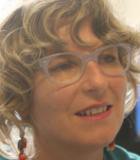
Funzione/Ruolo
Professoressa associata di Biologia molecolare presso l'Università La Sapienza di Roma
Percorso professionale
Dopo la laurea in Scienze Biologiche all'Università La Sapienza di Roma nel 1998, consegue un dottorato di ricerca in Biologia Molecolare presso la stessa università. Si trasferisce poi in Olanda per un post doc all'Università di Utrecht, nel dipartimento di Genetica e Biologia cellulare dal 1998 al 2003. Lì si occupa dei meccanismi molecolari degli ormoni vegetali come l'auxina. Questi studi rivelano il ruolo cruciale di questo ormone nel regolare processi fondamentali come la divisione, la polarità e il fato di una cellula. Dal 2003 al 2006 rientra in Italia come professoressa a contratto presso la Facoltà di Scienze Matematiche, Fisiche e Naturali della Sapienza di Roma grazie agli "Incentivi a favore della mobilità dei docenti italiani e stranieri impegnati all'estero" e all'assegnazione del prestigioso Career Development Award da parte della Giovanni Armenise - Harvard Foundation della Harvard University (USA). È la prima volta che questo premio viene assegnato a un progetto di Biologia Vegetale. Nel 2008 diventa ricercatrice presso il Dipartimento Generale di Biologia Molecolare presso la Sapienza e dal 2010 lavora in qualità di professoressa associata presso il Dipartimento di Biologia e Biotecnologie "Charles Darwin". Nel 2010 risulta vincitrice di un prestigiosissimo ERC starting grant assegnato dall' European Reasercher Council per un valore di 1.500.000 €.
Risultati scientifici
Sabrina Sabatini si è affermata come leader a livello internazionale nella biologia dello sviluppo delle piante. Studiando la radice della arabidopsis thaliana, Sabatini e i suoi collaboratori sono riusciti a comprendere il meccanismo di azione dei fitormoni, scoperta che apre una nuova strada per accelerare i processi evolutivi delle specie coltivate. Da questa scoperta deriva tra l'altro la possibilità di velocizzare e aumentare la crescita delle radici per farle sprofondare nel terreno fino al raggiungimento della falda acquifera o, viceversa, impedire che le radici scendano troppo in profondità evitando che raggiungano zone con concentrazioni saline eccessivamente elevate. Future applicazioni di questa scoperta segnerebbero dunque un punto di svolta nella produzione dei tanto odiati/amati Ogm, che potrebbero risultare surclassati.
Attività editoriali e pubblicazioni
Sabrina Sabatini è autrice di numerosi articoli tra cui:
(2015) Pacifici E, Polverari L, Sabatini S. Plant hormone cross-talk: the pivot of root growth.Journal of Experimental Botany, 66(4):1113-21.
(2014) Heidstra R, Sabatini S. Plant and animal stem cells: similar yet different.Nature Reviews Molecolar Cell Biology, 15(5):301-12.
(2013)Perilli S, Perez-Perez JM, Di Mambro R, Peris CL, Díaz-Triviño S, Del Bianco M, Pierdonati E, Moubayidin L, Cruz-Ramírez A, Costantino P, Scheres B, Sabatini S. RETINOBLASTOMA-RELATED protein stimulates cell differentiation in the Arabidopsis root meristem by interacting with cytokinin signaling.Plant Cell, 25(11):4469-78.
(2013) Mattei B, Sabatini S, Schininà ME. Proteomics in deciphering the auxin commitment in the Arabidopsis thaliana root growth.Journal of Proteome Research, 12(11):4685-701.
(2013)Moubayidin L, Di Mambro R, Sozzani R, Pacifici E, Salvi E, Terpstra I, Bao D, van Dijken A, Dello Ioio R, Perilli S, Ljung K, Benfey PN, Heidstra R, Costantino P, Sabatini S. Spatialcoordination between stem cell activity and cell differentiation in the root meristem.Developmental Cell, 26(4):405-15.
(2011) Perilli S., Di Mambro R., Sabatini S. Growth and development of the root apical meristem.Current Opinion in Plant Biology,Current Opinion in Plant Biology, 15(1):17-23.
(2011) Kim K, Ryu H, Cho YH, Scacchi E, Sabatini S, Hwang I. Cytokinin-facilitated Proteolysis of ARABIDOPSIS RESPONSE REGULATOR2 Attenuates Signaling Output in Two-component Circuitry.Plant Journal, 69(6):934-45.
(2011) Aichinger E, Villar CB, Di Mambro R, Sabatini S, Köhler C. The CHD3 chromatin remodeler PICKLE and polycomb group proteins antagonistically regulate meristem activity in the Arabidopsis root. Plant Cell, 23:1047-60.
(2010)Moubayidin L., Perilli S, Dello Ioio R., Di Mambro R, Costantino P and Sabatini S.Root meristem growth is controlled by an increase in the rate of cell differentiation relative tocell division.Journal of Biotechnology,150, Supplement 1, S110.
(2010)Moubayidin L, Perilli S, Dello Ioio R, Di Mambro R, Costantino P and Sabatini S.The rate of cell differentiation controls the Arabidopsis root meristem growth phase.Current Biology, 20:1138-1143.
Riconoscimenti e premi
Nel 2003 vince il Career Development Award da parte della Giovanni Armenise-Harvard Foundation della Harvard University (USA), per la prima volta assegnato a un progetto di Biologia Vegetale. Nel 2010 risulta vincitrice di un prestigiosissimo ERC starting grant assegnato dall'European Reasercher Council.

Funzione/Ruolo
Campionessa di sci della Federazione Italiana Sport Invernali Paralimpici (FISIP),guida della sciatrice paralimpica ipovedente Martina Vozza
Percorso professionale
Maestra e allenatrice di sci alpino, ma soprattutto Guida di Martina Vozza, atleta della Federazione Italiana Sport Invernali Paralimpici che compete nella categoria Visually Impaired, dedicata a sciatori con problemi visivi. Un binomio che da oltre 5 anni condivide emozioni, sfide e successi, e che ha già portato a ottimi risultati: il loro palmares include podi in coppa Europa e Coppa del Mondo, medaglie ai campionati Mondiali e la coppa del mondo di specialità di SuperG 22/23. L’obiettivo finale rimane però la Paralimpiade di casa, per la quale Martina e Ylenia si sono allenate in simbiosi per arrivare il più preparate possibile, dal punto di vista tecnico, fisico ma anche e soprattutto mentale.
Il suo palmares include:
Giochi Paralimpici: 2022 Pechino (CHN), 8° Slalom gigante.
Campionati Mondiali: 2023 Espot (ESP), 2° Discesa libera, 2° SuperG; 2022 Lillehammer (NOR), 3° Slalom.
Coppa del Mondo: 2024 Sella Nevea (ITA), 2° Slalom Gigante; 2024 Wildschoenau (AUT), 3° Slalom, 3° Slalom; 2024 Sapporo (JPN), 2° Slalom, 2° Slalom; 2024 Cortina (ITA), 2° Discesa libera, 3° Slalom; 2024 Veysonnaz (SUI), 2° Super G, 2° Gigante; 2023 Saalbach (AUT), 1° Super G; 2° Discesa libera; 2023 Veysonnaz (SUI), 2° Slalom Gigante, 3° Slalom Gigante, 3° Slalom Gigante; 2021 Steinach am Brenner (AUT), 2° SuperG; 2021 St. Moritz (SUI), 3° Gigante.
Coppa Europa: 2024 Folgaria (ITA), 1° Slalom gigante, 1° Slalom; 2021 Resterhole (AUT), 4° Slalom (miglior risultato).
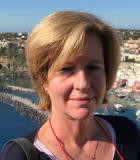
Funzione/Ruolo
Professoressa ordinaria di Farmacologia presso l’Università degli Studi di Milano
Percorso professionale
Dopo la Laurea in Scienze biologiche presso l’Università degli Studi di Milano nel 1983 e un periodo di ricerca presso il Dipartimento di Farmacologia, Chemioterapia e Tossicologia medica della stessa Università, si reca negli Stati Uniti al National Institute of Health (NIH, Bethesda) dove rimane per tre anni e consegue un PhD in Neuropharmacology. Rientrata in Italia, prosegue la sua formazione e le sue ricerche prima come ricercatrice, poi come professoressa associata di Farmacologia al Dipartimento di Farmacologia, Chemioterapia e Tossicologia Medica dell’Università degli Studi di Milano. Dal 2017 è professoressa ordinaria di Farmacologia nella stessa università: docente di farmacologia per Corsi di laurea triennali e magistrali in Scienze Biologiche e in Scienze del Farmaco; docente in Master di II livello e in Scuole di Specializzazione della Facoltà di Medicina e Chirurgia e responsabile del laboratorio di “Terapia del dolore, farmaci d’abuso e neuroimmunologia” costituito da giovani scienziati italiani e stranieri.
Risultati scientifici
I suoi interessi scientifici si concentrano sullo studio dei meccanismi alla base dell’insorgenza, del mantenimento e della risoluzione del dolore infiammatorio cronico e del dolore neuropatico, con lo scopo di identificare nuovi approcci terapeutici più efficaci e sicuri. Il suo gruppo di ricerca ha dimostrato che alla base della cronicizzazione del dolore esiste una interazione patologica tra neuroni, cellule immunitarie, glia e microglia nel sistema nervoso centrale e periferico. La ricerca verte proprio sull’identificazioni dei meccanismi cellulari e molecolari e sui determinanti principali che sottendono ai processi di neuro-infiammazione nel sistema nervoso, con focus sull’equilibrio delle citochine pro e antinfiammatorie. Recentemente ha dimostrato come la somministrazione di cellule staminali, per le loro proprietà intrinseche, rappresenti un importante strumento per modulare l’attività di cellule residenti e quindi anche la neurotrasmissione del dolore. Queste cellule si comportano infatti come diretti trasportatori di fattori trofici, immunomodulatori e omeostatici in grado di modificare la trasmissione degli stimoli nocicettivi. Nella ricerca di nuovi target farmacologici per il trattamento del dolore è stata identificata anche una nuova famiglia di chemiochine: le Prokineticine.
Paola Sacerdote si è inoltre sempre occupata di approfondire la farmacologia di base e clinica degli analgesici più utilizzati in medicina del dolore, cioè gli oppioidi. Il suo gruppo di ricerca è stato il primo a caratterizzarne gli effetti sul sistema immunitario, rivelando il rischio di immunosoppressione associata alla terapia. Da molti anni lavora con centri di Terapia del Dolore in Italia e nel mondo, per migliorare l’utilizzo clinico degli oppioidi, per capirne il potenziale d’abuso e individualizzare la terapia personalizzata al paziente.
Attività editoriali e pubblicazioni
È autrice di circa 190 pubblicazioni scientifiche, e ha partecipato a Consensus Conferences nel campo del dolore e degli oppioidi che hanno portato a importanti pubblicazioni molto utilizzate dai Terapisti del dolore. Ha scritto capitoli per numerosi libri a diffusione nazionale e internazionale.
Di seguito un elenco delle principali pubblicazioni scientifiche:
(2017) Brini A, Amodeo G, Ferreira LM, Milani A, Niada S, Moschetti G, Franchi S, Borsani E, Rodella LF, Panerai AE, Sacerdote P. Therapeutic effect of human adipose-derived stem cells and their secretome in experimental diabetic pain. Scientific Reports, 7(1):9904.
(2017) Franchi S, Amodeo G, Gandolla M, Moschetti G, Panerai AE, Sacerdote P. Effect of Tapentadol on splenic cytokine production in mice. Anesthesia and Analgesia, 124:986-995.
(2016) Castelli M, Amodeo G, Negri L, Lattanzi R, Maftei D, Gotti C, Pistillo F, Onnis V, Congu C, Panerai AE, Sacerdote P, Franchi S. Antagonism of the prokineticin system prevents and reverses allodynia and inflammation in a mouse model of diabetes. Plos One, 11(1):e0146259.
(2014) Maftei D, Marconi V, Florenzano F, Giancotti LA, Castelli M,vMoretti S, Borsani E, Rodella LF, Balboni G, Luongo L, Maione S, Sacerdote P, Negri L and Lattanzi R. Controlling the activation of the Bv8/Prokineticin system reduces neuroinflammation and abolishes thermal and tactile hyperalgesia in neuropathic animals. British Journal of Pharmacology, 171:4850-65.
(2014) Moretti S, Castelli M, Franchi S, Raggi MA, Mercolini L, Protti M, Somaini L, Panerai AE, Sacerdote P. D-9-Tetrahydrocannabinol-induced anti-inflammatory responses in adolescent mice switch to proinflammatory in adulthood. Journal of Leukocyte Biology, 96:523-34.
(2013) Sacerdote P, Franchi S, Moretti S, Castelli M, Procacci P, Magnaghi V, Panerai AE. Cytokine Modulation is Necessary for Efficacious Treatment of Experimental Neuropathic Pain. Journal of Neuroimmune Pharmacology, 8:202-11.
(2013) Sacerdote P, Niada S, Franchi S, Arrigoni E, Rossi A, Yenagi V, De Girolamo L, Panerai AA, Brini AT. Systemic administration of human Adipose-derived Stem Cells (hASCs) reverts nociceptive hypersensitivity in an experimental model of neuropathy. Stem Cells And Development, 22:1252-63.
(2012) Franchi S, Valsecchi AE, Borsani E, Procacci P, Ferrari D, Zaffa C, Sartori P, Rodella LF, Vescovi A, Maione S, Rossi F, Colleoni M, Sacerdote P, Panerai AE. Intravenous Neural Stem Cells abolish nociceptive hypersensitivity and trigger nerve regeneration in experimental neuropathy. Pain, 153:850-861.
(2012) Sacerdote P, Franchi S, Panerai AE. Non-Analgesic Effects of Opioids: Mechanisms and Potential Clinical Relevance of Opioid-Induced Immunodepression. Current Pharmaceutical Design,18(37):6034-42.
(2009) Giannini E, Lattanzi R, Nicotra A, Campese Af, Grazioli P, Screpanti I, Balboni G, Salvadori S, Sacerdote P, Negri L. The chemokine Bv8/prokineticin 2 is up-regulated in inflammatory granulocytes and modulates inflammatory pain. Proceedings of the National Acadademy of Sciences USA, 106:14646-51.
(2008) Gironi M, Martinelli-Boneschi F, Sacerdote P, Solaro C, Zaffaroni M, Cavarretta R, Moiola L, Bucello S, Radaelli M, Pilato V, Rodegher M, Cursi M, Franchi S, Martinelli V, Nemni R, Comi G, Martino G. A pilot trial of low-dose naltrexone in primary progressive multiple sclerosis. Multiple Sclerosis, 14: 1076-83.
(2008) Pergolizzi J, Böger RH, Budd K, Dahan A, Erdine S, Hans G, Kress HG, Langford R, Likar R, Raffa RB, Sacerdote P. Opioids and the management of chronic severe pain in the elderly: consensus statement of an international expert panel with focus on the six clinically most often used WHO step III opioids (buprenorphine, fentanyl, hydromorphone, methadone, morphine, oxycodone). Pain Practice. 8:287-313.

Area Economia e Finanza
Competenze: economia del lavoro, economia delle organizzazioni
Parole chiave: CEO, coronavirus, Covid-19, Covid-19: impatto sugli ssetti organizzativi e manageriali delle imprese, Covid-19: impatto sulla richiesta di competenze nelle risorse umane, decentralizzazione, management, produttività, selezione
Regione: ESTERO
Funzione/Ruolo
"Thomas S. Murphy" Associate Professor di Business Administration presso la Harvard Business School, Faculty Associate presso NBER, CEPR, CEP and Ariadne Labs
Percorso professionale
Dopo aver conseguito la laurea in Economia e Commercio presso l'Università di Roma La Sapienza, prosegue la sua formazione con il Master in Economia presso l’Università Pompeu Fabra di Barcellona, e il Dottorato in Economia presso la London School of Economics. Dal 2009 and 2014 è Assistant Professor presso la Harvard Business School, e diviene Associate Professor nella stessa istituzione nel 2014.
Risultati scientifici
L’attività di ricerca di Raffaella Sadun si svolge nel campo dell’economia delle organizzazioni, con particolare attenzione all’impatto della management e dalla struttura decisionale dell’impresa sulla produttività. La sua ricerca ha documentato le determinanti economiche e culturali delle scelte manageriali, sia nel settore privato che quello pubblico. Ha contribuito alla creazione di due progetti, la World Management Survey (www.worldmanagementsurvey.org) e l’Executive Time Use Survey (www.executivetimeuse.org), dedicati alla raccolta di dati sull’adozione di processi manageriali e sul comportamento degli Amministratori Delegati su scala internazionale. I suoi articoli hanno contribuito a definire l’importanza del management e dei/delle managers sulla produttività dell’impresa. In questo ambito, la sua ricerca ha documentato le sostanziali differenze che caratterizzano le imprese familiari dal punto di vista del management (minore adozione di processi), struttura decisionale (maggiore concentrazione del controllo decisionale al livello dell’AD), e del comportamento dell’AD (minori ore lavorate rispetto a managers non di famiglia). Un altro filone di ricerca è dedicato allo studio del management negli ospedali: la sua ricerca mostra l’importanza dell’adozione di processi manageriali sulla qualità della cura offerta dagli ospedali, e suggerisce diversi approcci per il miglioramento della gestione di queste strutture pubbliche.
Attività editoriali e pubblicazioni
Raffaella Sadun è autrice di numerose pubblicazioni, tra cui:
(2018) Bandiera O, Prat A, Lemos R and Sadun R. Managing the Family Firm: Evidence from CEOs at Work. Review of Financial Studies, 31(5):1605-1653.
(2017) Sadun R, Bloom N and Van Reenen J. Why Do We Undervalue Competent Management? Neither Great Leadership Nor Brilliant Strategy Matters Without Operational Excellence. Harvard Business Review,95, 5:120–127.
(2015) Tsai T, Ashish K, Atul J, Gawande A, Huckman RS, Bloom N. and Sadun R. Hospital Board and Management Practices Are Strongly Related to Hospital Performance on Clinical Quality Metrics.Health Affairs, 34, 8:1304–1311.
(2015) Bloom N, Lemos R, Sadun R and Van Reenen J. Does Management Matter in Schools?Economic Journal (Royal Economic Society)125, 584:647–674.
(2015) Sadun R. Does Planning Regulation Protect Independent Retailers?Review of Economics and Statistics, 97, 5: 983–1001.
(2014) Bloom N, Garicano L, Sadun R and Van Reenen J. The Distinct Effects of Information Technology and Communication Technology on Firm Organization. Management Science 60, 12:2859–2885.
(2015) Bandiera, Oriana, Luigi Guiso, Andrea Prat, and Raffaella Sadun. "Matching Firms, Managers, and Incentives." Journal of Labor Economics 33, no. 3 (July 2015): 623–681.
(2012) Bloom N, Sadun R. and Van Reenen J. The Organization of Firms Across Countries. Quarterly Journal of Economics, 127, 4. (Slides from 2008 , Harvard Business School Working Paper, No. 12-005, August 2011.)
(2012) Bloom N, Sadun R. and John Van Reenen J. Americans Do IT Better: US Multinationals and the Productivity Miracle. American Economic Review, 102, 1: 167–201. (Slides ; Summary ; The Economist ; Financial Times ; New York Times .)
(2012) Bloom N, Genakos C, Sadun R. and Van Reenen J. Management Practices across Firms and Countries. Academy of Management Perspectives, 26, 1: 12–33.
(2010) Bloom N, Sadun R. and Van Reenen J. Recent Advances in the Empirics of Organizational Economics. Annual Review of Economics, 2: 105–137.
Riconoscimenti e premi
Raffaella Sadun è fellow di National Bureau of Economic Research, Centre for Economic Policy Research, International Growth Centre, Ariadne Labs. Ha ricevuto la Kauffman Foundation Junior Faculty Fellowship in Entrepreneurship Research nel 2012. E’ stata keynote speaker al Partners Meeting della Bill and Melinda Gates Foundation nel 2015, e del New England Journal of Medicine Catalyst Event nel 2017.

Funzione/Ruolo
Non-resident Senior Fellow e storica militare presso Brookings Institution (Washington); Senior Associate Fellow dell’Istituto per gli Studi di Politica Internazionale (ISPI).
Percorso professionale
Nel 2004, consegue il PhD presso l'Università di Milano, con uno studio sulla relazione controversa tra il fascismo e la Croce rossa italiana.
Ha collaborato con il Pentagono e con il segretario alla Difesa James Mattis come sua consulente sulla Libia. Ha lavorato come advisor sul Maghreb per il Gruppo Terna, il primo operatore di rete per la trasmissione di energia elettrica in Europa.
Nel settembre 2016, testimonia davanti alla Commissione degli affari esteri della Camera dei Rappresentanti americana sul terrorismo in Libia.
Attualmente è Senior Fellow di Brookings Institution e Senior Associate Fellow dell’Istituto per gli Studi di Politica Internazionale (ISPI).
Risultati scientifici
Specialista in tattiche e strategie di contro-guerriglia. È una storica militare esperta in colonie africane: i suoi studi hanno riguardato la Libia e il Corno d'Africa, ma anche l'Afghanistan. Partecipa come lecturer a numerose conferenze e congressi di storia militare, e ha tenuto alcune lezioni all'Accademia Navale della Marina americana ad Annapolis.
Nel 2006 sviluppa per la Rai-National Television italiana le serie La Storia del Fascismo e nel 2009 La Seconda Guerra Mondiale, distribuite da "Il Corriere della Sera". Ha pubblicato cinque libri storici e sta pubblicando l'ultimo con l'Istituto Navale di Annapolis sulle operazioni di contro-insurrezione italiana in Libia ed Etiopia (1922-1940).
Attività editoriali e pubblicazioni
Libri:
[2019] Saini Fasanotti F, VINCERE! The Italian way of COIN: Libya and Ethiopia. 1922-1941, USNI, Annapolis.
[2015] Saini Fasanotti F, L'Esercito alla macchia. La controguerriglia italiana dal Brigantaggio alla Seconda Guerra Mondiale (1860-1943), Ufficio Storico dello Stato Maggiore della Difesa, Roma.
[2014] Saini Fasanotti F, Afghanistan. Dall'Impero dei Durrani alla Resolute Support Mission, MursiaEditore, Milano.
[2012] Saini Fasanotti F, Libia 1922-1931. Le operazioni militari italiane, Ufficio Storico dello Stato Maggiore dell'Esercito, Roma.
[2010] Saini Fasanotti F, Etiopia 1936-1940. Le operazioni di polizia coloniale attraverso le fonti dell'Esercito italiano,Ufficio Storico dello Stato Maggiore dell'Esercito, Roma.
[2006] Saini Fasanotti F, La gioia violata. Crimini contro gli italiani 1940-1946,EdizioniAres,Milano.
Articoli:
Scrive regolarmente per diversi Think Tank di primo piano, e ha pubblicato molti saggi e articoli su riviste storiche e geopolitiche,come anche su periodici di politica estera e riviste specializzate.
[2019] Saini Fasanotti F, Libya and the Franco-Italian rivalry, in Geopolitical Intelligence Services
[2019] Saini Fasanotti F, The Rise of Populacracy, in The National Interest
[2019] Saini Fasanotti F, Between false myths and real threats, in Formiche (Agosto-Settembre).
[2017] Saini Fasanotti F, Libya, a nation suspended between past and future, in Studia Diplomatica LXVIII-4, Egmont Royal Institute for International Relations.
[2016] Saini Fasanotti F, The Italian war industry on the threshold of the Great War: between mobilization and innovation, pp. 332-345, in "Neutral Italy 1914-1915", Roma, Rodorigo Editore.
[2014] Saini Fasanotti F, Libyan Troops (1922-1931).The Trainingduring the Reconquest, inRivista Militare(quarterly).
Riconoscimenti e premi
Finalista e Premio Speciale nella sezione storico-scientifica del 44° Premio Acqui-Storia.

Sport
Competenze: atletica leggera, comunicazione sportiva, lancio del martello, lavoro sportivo, leadership sportiva, politiche per lo sport, prevenzione degli abusi sessuali nello sport, prevenzione del bullismo nello sport, prevenzione delle molestie sessuali nello sport, sport e giovani, sport e scuola
Parole chiave: CONI (Comitato Olimpico Nazionale Italiano), donne e sport, giochi olimpici, giovani e sport, Made in Italy, Olimpiadi, parità di genere
Regione: Lazio
Funzione/Ruolo
Ex atleta, campionessa di lancio al martello. Già Vicepresidente vicaria CONI (Comitato Olimpico Nazionale Italiano)
Percorso professionale
Silvia Salis inizia la sua carriera nel settore sportivo praticando atletica leggera e poi lancio del martello, specialità con cui partecipa ai Giochi Olimpici di Pechino del 2008 e a quelli di Londra del 2012, e arriva finalista ai Campionati del Mondo di Daegu, Corea del Sud (2011). Sempre nel lancio del martello vince la Medaglia d'Oro ai Giochi del Mediterraneo di Pescara (2009) e la Medaglia di bronzo ai Giochi del Mediterraneo di Mersin (2013). Il palmares include anche 10 titoli italiani.
Al termine della carriera agonistica, avvia la carriera da dirigente con numerosi incarichi: dal 2016 è Consigliera Federale nella Federazione Italiana di Atletica Leggera (FIDAL) e Delegata Federale presso Casa Atletica Italiana, che promuove il "marchio Italia" nel mondo. Nel 2017 è ideatrice di "Allenamente", per sostenere percorsi di studi di giovani Atleti Azzurri. Dal 2017 è Membro del Consiglio Nazionale del Comitato Olimpico Italiano e della Commissione Atleti del CONI. Nel 2018 è parte del tavolo di lavoro per il Fondo Maternità per le atlete. Dal 2021 al 2024 è Vicepresidente Vicaria del CONI e Rappresentante di Giunta Nazionale nel Coordinamento delle Associazioni Benemerite. Dal 2022 è Componente dell'ufficio del Safeguarding della Federazione Ginnastica e della Federazione Danza Sportiva. Dal 2022 è Componente dell'Advisory Board della Fondazione Lottomatica, e Componente del Comitato d'Onore della Fondazione Villa Menarini. Dal 2010 è membro del Gruppo Sportivo Fiamme Azzurre, prima come atleta, poi come Responsabile della comunicazione.
Il 30 maggio 2025 viene eletta sindaca della città di Genova.
Ha all'attivo esperienze nel mondo del giornalismo e dei social media.
Silvia Salis è laureata in Scienze politiche.
Attività editoriali e pubblicazioni
Silvia Salis è autrice del libro La Bambina più Forte del Mondo (casa Editrice Salani, Genova 2022), i cui ricavati di vendita sono destinati all'Ospedale Giannina Gaslini di Genova.
Riconoscimenti e premi
Silvia Salis nel 2022 è indicata tra le 100 donne più influenti d'Italia dalla rivista FORBES e tra i 40 under 40 "che stanno cambiando il paese" dalla rivista FORTUNE.
Nel 2023 le è stata conferita l'onorificenza di Commendatore dell'Ordine al Merito della Repubblica d'Italia e il titolo di "Ambasciatrice di Genova nel Mondo".

Funzione/Ruolo
Direttrice Gestione Iniziative e Progetti presso Essity.
Percorso professionale
Dopo la Laura Magistrale in Ingegneria Gestionale conseguita presso l’Università di Pisa, trascorre 7 anni in Procter&Gamble, principalmente nella categoria UK Beauty Care, ricoprendo diversi ruoli di supply chain tra cui Operations, Initiatives e Quality management, in una realtà dinamica e competitiva, maturando una significativa esperienza in gestione della supply chain, project management e sviluppo del prodotto e industrializzazione attraverso i principi di Early Management.
Nel 2013 entra in Essity, nel settore Operational Excellence e Initiatives Management, guidando trasformazioni produttive e di portafoglio ad alto impatto sul business italiano e poi europeo.
Risultati scientifici
Valeria Salvadori è specializzata in principi di Lean Manufacturing (TPM), capacità di coaching, capacità di comunicazione e influenza, conoscenza del business e innovazione di prodotto e gestione dell'industrializzazione.

Area Economia e Finanza
Competenze: comunicazione finanziaria, comunicazione non-finanziaria d'impresa, corporate governance, economia aziendale, economia circolare, gestione dei rischi, Responsabilità Sociale d'Impresa (RSI)
Parole chiave: modelli di business sostenibile, sistemi di controllo interni, sostenibilità
Regione: Lombardia
Funzione/Ruolo
Professoressa Ordinaria di Economia Aziendale all’Università degli Studi di Brescia.
Percorso professionale
Dopo aver conseguito la laurea in Economia Aziendale presso l’Università Bocconi nel 1976, prosegue la sua formazione presso la stessa Università dove nel 1978 acquisisce il Diploma “CoPAS – Corso di Pianificazione e Analisi Strategica” e nel 1982 assume la posizione di ricercatrice confermata. Dal 1988 al 1991 è Professoressa Associata di “Economia d’Azienda” alla Facoltà di Economia dell’Università degli Studi di Bologna e successivamente Professoressa Associata alla Facoltà di Scienze Politiche dell’Università degli Studi di Milano. Dal 1994 è Professoressa Ordinaria di Economia Aziendale presso l’Università degli Studi di Brescia. È stata presidente del Nucleo di Valutazione dell’Università di Brescia dal 1995 al 2012, responsabile scientifica di Centri di ricerca, responsabile di progetti di ricerca con bandi competitivi di carattere internazionale e nazionale. È affiliata a numerose accademie di riconosciuto prestigio in ambito economico aziendale, nonché membro del Gruppo di Lavoro ASviS –Alleanza Italiana per lo Sviluppo Sostenibile per il goal n. 12 (Produzione e Consumo Responsabile) e dell’UNI – Ente di Normazione Nazionale – per la Commissione Tecnica CT057 sull’Economia Circolare, collegato alla ISO/TC323 in materia di Circular Economy. Svolge anche attività di consulenza in campo economico aziendale, è stata membro di organi di corporate governance di società quotate e ha svolto perizie di valutazione su incarico del Tribunale.
Risultati scientifici
L’attività di ricerca di Daniela Salvioni si sviluppa nel campo dell’Economia Aziendale, con particolare attenzione alle tematiche di amministrazione e controllo, responsabilità sociale e comunicazione istituzionale d’impresa. Attualmente la sua ricerca è rivolta in particolare all’approfondimento delle relazioni tra corporate governance, responsabilità sociale e sostenibilità d’impresa nel contesto economico globale. In tale ambito, un filone di ricerca riguarda i nuovi modelli di business connessi all’economia circolare. Un altro filone di analisi si concentra sul ruolo dei comitati di sostenibilità interni agli organi di governance, per l’efficace realizzazione delle condizioni di successo sostenibile delle imprese.
Attività editoriali e pubblicazioni
Daniela Salvioni è autrice di più di centoventi pubblicazioni scientifiche, tra cui:
[2022] Salvioni D. M., Bosetti L., Fornasari T., Implementing and Monitoring Circular Buseness Models: An Analysis of Italian SMEs, Sustainability, vol. 14 (1), 1-33.
[2020] Salvioni D. M., Almici A., Circular Economy and Stakeholder Engagement Strategy. Symphonya. Emerging Issues in Management (symphonya.unicusano.it), (1), 26-44.
[2019] Gennari F., Salvioni D. M., CSR committees on boards: the impact of the external country level factors, Journal of Management and Governance, 23 (3),1-26.
[2018] Salvioni D.M., Corporate governance, ownership and global markets. In: Brondoni S. M. (ed.), Competitive business management. A global perspective, Routledge-Giappichelli Studies in Business and Management, Routledge, Abingdon and New York, Giappichelli, Turin, 47-68.
[2017] Salvioni D. M., Franzoni S., Cassano R., Sustainability in the higher education system: an opportunity to improve quality and image, Sustainability, vol. 9, n. 914, 1-27.
[2016] Salvioni D. M., Gennari F., Corporate Governance, Ownership and Sustainability, Corporate Ownership & Control, Vol. 13, No. 2, 604-612.
[2016] Salvioni D. M., Hotel chains and the sharing economy in global tourism, Symphonya. Emerging Issues in Management, n. 1/2016, 31-44.
[2015] Salvioni D. M., Gennari F., Bosetti L., Almici A., The Audit Committee in the EU Emerging Countries, in Boubaker S., Nguyen D.K. (ed.), Corporate Governance and Corporate Social Responsibility: Emerging Markets Focus, World Scientific Publishing, 211-234.
[2014] Salvioni D. M., Gennari F., Corporate governance, sustainability and capital markets orientation, International Journal of Management and Sustainability, vol. 3, 469-483.
[2013] Salvioni D.M., Astori R., Sustainable Development and Global Responsibility in Corporate Governance, Symphonya. Emerging Issues in Management, n. 1, 1-25.
[2012] Salvioni D. M., Governance, Risk Management and Business Effectiveness in Global Firm. In: Tipuric D., Dabic M. (ed.). Management, Governance, and Entrepreneurship – New Perspectives and Challenges, Darwen, Access Press UK
[2009] Salvioni D. M. (ed.), Corporate governance, controllo e trasparenza, vol. unico, II° ed., Milano, FrancoAngeli, 1-630.
Riconoscimenti e premi
1986 Nomina a Socio Onorario AICE - Associazione Italiana Cost Engineers, per il contributo offertoall'avanzamento degli studi in materia dal volume: [1985] Salvioni D.M., "La gestione delle grandi commesseindustriali. Previsione e controllo", Milano, Giuffrè, 1-204.
2012 Referee nominata dal Rettore dell’Università Ca’ Foscari di Venezia - in base alla fama scientifica e allacompetenza, riconosciuta internazionalmente – nell’ambito del procedimento di valutazione dei prodotti scientifici di Ateneo.
2015 Premio best paper at the QUAESTI Virtual Multidisciplinary Conference tenutasi a dicembre 2015 riconosciuto al paper: Salvioni D.M. e Cassano R. “Improvement of the performance management in the school system”.
2017 Referee nominata dal Rettore dell’Università di Roma Tor Vergata nell’ambito del Bando per Progetti di Ricerca Scientifica di Ateneo “Mission: Sustainability”.
2017 Referee nominata dal Rettore dell'Università degli Studi dell'Insubria per la promozione dell'eccellenza nei propri progetti di ricerca.

Funzione/Ruolo
Dermatologa
Percorso professionale
Dopo la laurea in Medicina e Chirurgia all'Università di Torino nel 2010, prosegue la sua formazione con una specializzazione in Dermatologia conseguita nel 2016, seguita da un dottorato di ricerca in medicina molecolare. Martina Sanlorenzo inizia la sua carriera da ricercatrice già dal 2011 a Torino, nel 2012 è Medical fellow all'Ayder Refferal Hospital di Mekelle, in Etiopia. L'anno successivo è Research fellow presso l'Ortiz lab, del Dipartimento di Dermatologia della University of California a San Francisco e sempre dal 2013 è anche Medical fellow nel centro Melanoma and cutaneous oncology, presso la medesima università californiana.
Nel 2016 inizia la sua attività di ricerca all'Istituto di Ricerca sul Cancro alla'Università Medica di Vienna, città in cui si trasferisce e avvia un'attività medica privata.
Risultati scientifici
Martina Sanlorenzo nel 2016 ha vinto il premio "L'Oreal Italia per le donne e la scienza" in partnership con Unesco grazie al suo progetto intitolato "Interazione tra farmaci a bersaglio molecolare e immunoterapia nel trattamento del melanoma metastatico: modello preclinico per la valutazione del potenziale sinergismo". Proprio attraverso questo premio è stato possibile per la ricercatrice condurre studi di ricerca clinica che si propongono di integrare due approcci terapeutici, da una parte le terapie che colpiscono le cellule del melanoma (uno dei tumori più aggressivi e difficilmente curabili) e dall'altra quelle che mirano a potenziare la risposta del sistema immunitario contro il tumore.
Attività editoriali e pubblicazioni
È autrice di numerose pubblicazioni nazionali ed internazionali, tra cui:
(2016) Dapavo P, Vujic I, Fierro MT, Quaglino P, Sanlorenzo M. The infliximab biosimilar in the treatment of moderate to severe plaque psoriasis. Journal of the American Academy of Dermatology, 75(4):736-9.
(2016) Posch C, Moslehi H, Sanlorenzo M, Green G, Vujic I, Panzer-Grümayer R, Rappersberger K, Ortiz-Urda S. Pharmacological inhibitors of c-KIT block mutant c-KIT mediated migration of melanocytes and melanoma cells in vitro and in vivo. Oncotarget.
(2016) Ribero S, Balagna E, Sportoletti Baduel E, Picciotto F, Sanlorenzo M, Fierro MT, Quaglino P, Macripo G. Efficacy of electrochemotherapy for eruptive legs keratoacanthomas. Dermatology and Therapy, 29(5):345-348.
(2016) Posch C, Sanlorenzo M, Vujic I, Oses-Prieto JA, Cholewa BD, Kim ST, Ma J, Lai K, Zekhtser M, Esteve-Puig R, Green G, Chand S, Burlingame AL, Panzer-Grümayer R, Rappersberger K, Ortiz-Urda S. Phospho-proteomic analysis reveals increased CK2αkinase activity in NRAS(Q61) mutant melanoma. Journal of Investigative Dermatology, 136(10):2041-8.
(2016) Sanlorenzo M, Vujic I, Posch C, Ma J, Lin K, Lai K, Lee D, Vujic M, Oses-Prieto JA, Chand S, Rodriguez-Peralto JL, Burlingame A, Ortiz-Urda S. Oncogenic KIT mutations in different exons lead to specific changes in melanocyte phospho-proteome. Journal of Proteomics, 144:140-7.
(2016) Vujic I, Sanlorenzo M, Esteve-Puig R, Vujic M, Kwong A, Tsumura A, Murphy R, Moy A, Posch C, Monshi B, Rappersberger K, Ortiz-Urda S. Acyl protein thioesterase 1 and 2 (APT-1, APT-2) inhibitors palmostatin B, ML348 and ML349 have different effects on NRAS mutant melanoma cells. Oncotarget, 7(6):7297-306.
(2015) Sanlorenzo M, Vujic I, Ortiz-Urda S. Time-Dependent Measurement of Adverse Events-Reply. JAMA Dermatology, 151(12):1392-1393.
(2015) Sanlorenzo M, Ribero S, Osella Abate S, Mariani S, Strignano P, Salizzoni M, Savoia P, Fierro MT, Quaglino P. Genetic mutations in primary malignant melanoma of the esophagus: case report and literature review. Giornale Italiano di Dermatologia e Venereologia.
(2015) Posch C, Cholewa BD, Vujic I, Sanlorenzo M, Ma J, Kim ST, Kleffel S, Schatton T, Rappersberger K, Gutteridge R, Ahmad N, Ortiz-Urda S. Combined Inhibition of MEK and Plk1 has Synergistic Anti-Tumor Activity in NRAS Mutant Melanoma. Journal of Investigative Dermatology, 135(10):2475-83.
(2015) Ribero S, Gualano MR, Osella-Abate S, Scaioli G, Bert F, Sanlorenzo M, Balagna E, Fierro MT, Macripò G, Sapino A, Siliquini R, Quaglino P. Histological regression in primary melanoma with sentinel lymph node status: a systematic review and meta-analysis. JAMA Dermatology, 151(12):1301-1307.
Riconoscimenti e premi
Tra i numerosi riconoscimenti ottenuti, nel 2015 riceve l'Euroderm Excellence e nel 2016 vince il premio L'Oreal-UNESCO Italy - For Women in Science 2015-2016.

Funzione/Ruolo
Direttrice di Ricerca presso la sede di Monserrato, Sardegna, del Consiglio Nazionale delle Ricerche
Percorso professionale
Serena Sanna si laurea in Matematica nel 2003 presso l'Università di Cagliari. Dopo 3 mesi diventa collaboratrice scientifica dell'Istituto di Ricerca Genetica e Biomedica (IRGB) del CNR a Cagliari, nel 2005 si trasferisce per due anni presso il dipartimento di Biostatistica alla School of Public Health, dell'Università del Michigan, partner scientifico dell'IRGB. Nel 2007, torna in Italia all'IRGB come Research Investigator, continuando la sua collaborazione con l'Università del Michigan, dove torna per un periodo di sei mesi nel 2010. Nel 2011 diventa tutor dei dottorandi di ricerca dell'Università di Sassari e nello stesso anno ottiene il ruolo permanente all'Istituto di Ricerca Genetica e Biomedica (IRGB) del CNR a Cagliari. Nel 2016 ottiene il dottorato di ricerca in Scienze Mediche dall'Università di Groningen, in Olanda, dove attualmente svolge il ruolo di Assistant Professor presso l'University Medical Center Groningen.
Nel 2019 diventa prima ricercatrice del CNR e del 2020 Direttrice di Ricerca presso la sede del CNR di Moserrato, Sardegna.
Risultati scientifici
Nell'ambito del progetto ProgeNIA, genetica delle malattie legate all'invecchiamento che raccoglie più di sei mila individui, residenti dalla regione dell'Ogliastra in Sardegna, e attraverso l'utilizzo di tecnologie all'avanguardia per la caratterizzazione del genoma, è stato possibile per la ricercatrice individuare alcuni dei fattori genetici che contribuiscono all'insorgenza delle malattie comuni (quali le patologie cardiovascolari) o che modificano fattori di rischio (per esempio il colesterolo e la pressione sanguigna). La ricercatrice utilizza metodi di statistica inferenziale per massimizzare l'informazione genomica ottenuta, riducendo in questo modo i costi sperimentali di circa cinque volte, rispetto ai metodi tradizionali. E' attualmente ancora impegnata come co-investigatrice per il progetto ProgeNIA, e in particolare per il sequenziamento genetico della popolazione Sarda tramite i sequenziatori di nuova generazione (NGS), dei macchinari molto costosi che permettono di sequenziare il genoma di un individuo in tempistiche notevolmente inferiori rispetto ai sequenziatori tradizionali (alcuni giorni invece che diversi anni). L'obiettivo di questo progetto è quello di individuare l'intero spettro di varianti genetiche presenti nella popolazione Sarda e studiarne poi il loro ruolo nell'insorgenza delle malattie complesse e nella modificazione della sintomatologia associata.
Attività editoriali e pubblicazioni
Serena Sanna è autrice di numerose pubblicazioni, fra cui:
(2015) Sidore C, Busonero F, Maschio A, Porcu E, Naitza S, Zoledziewska M, Mulas A, Pistis G, Steri M, Danjou F, Kwong A, Ortega del Vecchyo VD, Chiang CWK, Bragg-Gresham J, Pitzalis M, Nagaraja R, Tarrier B, Brennan C, Uzzau S, Fuchsberger C, Atzeni R, Reinier F, Berutti R, Huang J, Timpson NJ, Toniolo D, Gasparini P, Malerba G, Dedoussis G, Zeggini E, Soranzo N, Jones C, Lyons R, Angius A, Kang HM, Novembre J, Sanna S, Schlessinger D, Cucca F, Abecasis GR. Genome sequencing elucidates Sardinian genetic architecture and augments GWAS findings: the examples of lipids and blood inflammatory markers. Nature Genetics, 47:1272-1281.
(2013) Orrù V, Steri M, Sole G, Sidore C, [....], Schlessinger D, Abecasis GR, Fiorillo E, Sanna S, Cucca F. Genetic Variants Regulating Immune Cell Levels in Health and Disease. Cell, 155(1):242-256.
(2011) Sanna S, Li B, Mulas A,Sidore C, Kang HM, Jackson AU, Piras MG, Usala G, Maninchedda G, Sassu A, Serra F, Palmas MA, Wood WH 3rd, Njølstad I, Laakso M, Hveem K, Tuomilehto J, Lakka TA, Rauramaa R, Boehnke M, Cucca F, Uda M, Schlessinger D, Nagaraja R, Abecasis GR. Fine mapping of five loci associated with low-density lipoprotein cholesterol detects variants that double the explained heritability. PLoS Genetics, 7(7):e1002198.
(2008) Uda M, Galanello R, Sanna S, Lettre G, Sankaran VG, Chen W, Usala G, Busonero F, Maschio A, Albai G, Piras MG, Sestu N, Lai S, Dei M, Mulas A, Crisponi L, Naitza S, Asunis I, Deiana M, Nagaraja R, Perseu L, Satta S, Cipollina MD, Sollaino C, Moi P, Hirschhorn JN, Orkin SH, Abecasis GR, Schlessinger D, Cao A. Genome-wide association study shows BCL11A associated with persistent HbF and amelioration of the phenotype of β-thalassemia. Proceeding of the National Academy Society of the United States of America, 105(5):1620-5.
(2008) Willer CJ, Sanna S, Jackson AU, Scuteri A, et al . Newly identified loci that influence lipid concentrations and risk of coronary artery disease. Nature Genetics, 40(2):161-9.
La lista completa delle pubblicazioni è disponibile online: https://scholar.google.nl/citations?hl=en&user=6hjWp7sAAAAJ&view_op=list_works&sortby=pubdate
Riconoscimenti e premi
Nel 2008 riceve il premio Best Young Scientist award dalla European Society of Human Genetics (ESHG)
Nel 2009 e 2010, due delle sue pubblicazioni (Peufer et al 2009; and Sanna et al 2010) sono state selezionate fra le migliori pubblicazione di scienziati del CNR per quegli anni.
Nel 2013 è stata riconosciuta come Migliore giovane ricercatrice del CRN in biomedicina.
Nel 2014, 2015, 2016, 2017 e 2018, è nella lista degli Highly Cited Scientists della Thomson Reuters, NY, che include l'1% degli scienziati del suo settore.
Nel 2018 riceve il premio “Guido Dorso” dalla associazione Guido Dorsoe dal Senato italiano come migliore ricercatrice del sud Italia.

Funzione/Ruolo
Ricercatrice presso l'Osservatorio Astronomico INAF di Roma
Percorso professionale
Dopo aver conseguito la laurea in Fisica nel 2005 presso l'Università La Sapienza di Roma, prosegue la sua formazione prima attraverso un dottorato di ricerca in Astronomia nello stesso ateneo nel 2009, poi con un master di specializzazione in Scienza e Tecnologie Spaziali all'Università Tor Vergata nel 2012. Già dal 2006 è research assistant dell'Osservatorio Astronomico di Roma, mentre nel 2010 è visiting scientist del Max Planck Institute for Extraterrestrial Physics (MPE), in Germania. Nel 2012 svolge un tirocinio presso la Thales Alenia Space. Continua le sue ricerche all'interno dell'Osservatorio Astronomico di Roma in cui oggi è ricercatrice.
Risultati scientifici
Paola Santini studia l'evoluzione delle galassie a partire dalla loro formazione nelle primissime fasi di vita del nostro Universo. Misurandone e interpretandone i segnali, cerca di comprendere i meccanismi fisici alla base della loro evoluzione, e spiegare come l’Universo è arrivato ad essere quello che osserviamo oggi. Alcune delle domande a cui cerca di dare risposta sono, ad esempio, come e quanto rapidamente le galassie formano le loro stelle, come e perché a un certo punto smettono di formarne, e come questi processi variano nel tempo. A tal scopo, si avvale delle migliori immagini a disposizione acquisite da strumenti all’avanguardia da spazio e da terra nell’ambito di importanti survey extragalattiche, risultato di grosse collaborazioni internazionali. Sfrutta principalmente osservazioni ottiche, infrarosse e submillimetriche. Con i suoi studi getta uno sguardo direttamente sul passato remoto del nostro Universo, osservando la debolissima luce proveniente da galassie che si trovano in epoche differenti dell'evoluzione cosmica.
Attività editoriali e pubblicazioni
Paola Santini è autrice e coautrice di oltre 200 pubblicazioni scientifiche. L'elenco aggiornato è disponibile su ADS Public Library.
Riconoscimenti e premi
Nel 2015 vince il premio Giovani Ricercatori Italiani istituito dal Gruppo 2003 (un gruppo di scienziati italiani che lavorano per la valorizzazione dei giovani) per la ricerca scientifica.

Area Politica internazionale
Competenze: geopolitica del Nord Africa e del Medio Oriente, politica estera dell'Italia, politica estera europea, Sahel centrale, Tunisia
Parole chiave: crisi della democrazia, democrazie, Medio Oriente e Nord Africa, mobilitazioni, sicurezza, stato, terrorismo, Unione Europea
Regione: Lazio
Funzione/Ruolo
Professoressa associata di Scienza Politica e Relazioni Internazionali presso Università L’Orientale, Napoli.
Percorso professionale
Consegue la laurea cum laude nel 2001 presso l'Università di Bologna in Scienze Internazionali e diplomatiche e un Master in Studi del Vicino e Medio Oriente presso la School of Oriental and African Studies (SOAS) di Londra nel 2003. Nel 2008 completa il dottorato di ricerca in Analisi e interpretazione della società europea presso Università Federico II, Napoli.
Vanta diverse fellowship e collaborazioni con vari Istituti di ricerca e Università: durante il dottorato collabora con il Centre for European Policy Studies (CEPS) e con la Stiftung fur Wissenschaft und Politik (SWP), nel 2008 è desk officer nella European Research Area dell’Università di Bologna, nel 2011/12 è fellow di Brookings Institution, nel 2010 lavora all’ISPI sull’Atlante geopolitico Treccani e nel 2013 entra a far parte della Transatlantic Academy del German Marshall Fund (GMF US).
L’esperienza acquisita la porta al Ministero degli Affari Esteri come consulente del vice-ministro degli Esteri su Mediterraneo e Medio Oriente. Nel 2015-2016 lavora alla Johns Hopkins University -SAIS Europe- di Bologna come associate fellow.
Nel 2012 diventa ricercatrice, prima junior e poi senior, presso l’Università L’Orientale di Napoli, dove attualmente è professoressa associata di Scienza politica e relazioni internazionali. E’ inoltre Associate Fellow dell’Institute of Middle East, Central Asia and Caucasus Studies (MECACS) all'Università di St. Andrews e consulente del World Food Programma a Roma, nella Analysis and Early Warning Unit.
Risultati scientifici
Dal 2012 al 2015 ha coordinato il progetto EUSPRING finanziato da Compagnia di San Paolo, Volkswagen Stiftung e Riksbanken Jubileumsfond all’interno del programma Global Challenges to Europe su Cittadinanza e relazioni Stato-società in Nord Africa dopo le rivolte arabe del 2011.
Dal 2015 al 2019 coordina STREETPOL, progetto finanziato dal Ministero della Ricerca italiano all’interno del programma SIR su Proteste nel mondo arabo dal 2011 in poi.
Attività editoriali e pubblicazioni
[2019] Santini R.H, Polese A, (eds.), Rethinking statehood in the Middle East and North Africa. Security, sovereignty and new political orders, Routledge, pp. 234.
[2019] Santini R.H, Cimini, G, The politics of security reform in post-2011 Tunisia: assessing the role of exogenous shocks, domestic policy entrepreneurs and external actors, “Middle Eastern Studies”, vol. 55, n.1, pp. 225-241.
[2019] Santini R.H, Cimini G, Intended and unintended consequences of security assistance in post-2011 Tunisia, in Contemporary Arab Affairs, vol. 12, n.1, 2019, pp. 91-106.
[2019] Santini R.H, Costantini I, ‘Saudi Arabia’s space shaping: making or unmaking a region’, in Giusti S, Mirkova I (eds.), The EU in a Trans-European space. External relations across Europe, Asia and the Middle East, Springer pp. 113-131.
[2019] Santini R.H, Pontiggia S, Informality and state-society relations in post-2011 Tunisia, in Polese A, Russo A, Strazzari F, (eds.), Governance beyond the law. The immoral, the illegal, the criminal,Palgrave.
[2018] Santini R.H, Limited statehood in post-revolutionary Tunisia. Citizenship, economy, security,Palgrave.
[2018] Santini R.H, Tholens S, Security Assistance in a Post-Interventionist Era: the impact on hybrid political orders in Tunisia and Lebanon, in Small Wars and Insurgencies.
[2018] Santini R.H, Polese A, Limited statehood and its security implications on the fragmentation of political orders in the Middle East and North Africa, in Small Wars and Insurgencies.
[2018] Santini R.H, The EU and post-Arab Uprisings’ citizenship: a fuzzy model or contrasting ideologies, in Mejier R, Butenschon N (eds.), The Middle East in transition: the centrality of citizenship, Edward Elgar.
[2018] Santini R.H, Il 2011 e il re-balancing del Golfo arabo: trasformazioni geopolitiche della regione del Medio
Oriente e Nord Africa, in Civiltà del Mediterraneo (numero monografico).
[2017] Santini R.H, A New Regional Cold War in the Middle East and North Africa: Regional Security Complex Theory Revisited, in The International Spectator, November
[2017] Santini R.H, Moro FN, Between hierarchy and heterarchy: Post Arab uprisings’ civil-military relations and the Arab state, in Mediterranean Politics.

Area STEM: Psicologia e neuroscienze
Competenze: biotecnologie, intelligenza artificiale, leadership, neurologia, neuroscienze, psichiatria, Start-up, strategie di salute pubblica
Parole chiave: Alzheimer, Parkinson, precision neurology, salute delle donne, salute mentale, salute pubblica, Tecnologia medica (MedTech)
Regione: ESTERO
Funzione/Ruolo
Chief Medical Officer, Fondatrice e Presidente di Women’s Brain foundation, Vice Presidente di Euresearch, Consulente presso Innosuisse.
Percorso professionale
La dottoressa Antonella Santuccione Chadha è una medica, rinomata per la sua competenza in neuroscienze e psichiatria, nonché per la sua leadership nella gestione organizzativa, nella ricerca e nello sviluppo clinico. È la fondatrice e presidente della Women's Brain Foundation, un'organizzazione senza scopo di lucro dedicata all'utilizzo della medicina di precisione per esplorare l'impatto del sesso e del genere sulle malattie mentali e cerebrali.
Oltre al suo ruolo presso la Women's Brain Foundation, è vicepresidente e membro del consiglio di amministrazione di Euresearch, un'agenzia svizzera che supporta le attività di ricerca e innovazione in tutta Europa. È anche un consulente esperta presso Innosuisse, l'Agenzia Svizzera per l'Innovazione che supporta PMI, start-up, istituzioni di ricerca e altre organizzazioni svizzere nelle loro attività di ricerca e sviluppo.
La sua leadership e la sua guida strategica sono state fondamentali per il successo di varie start-up, e ha fornito preziosi consigli a presidenti, CEO, consigli di amministrazione e colleghi junior.
La dottoressa Chadha ha un background professionale diversificato, avendo lavorato in università europee, aziende farmaceutiche come Roche e Biogen, l'agenzia di regolamentazione svizzera per l'approvazione di prodotti terapeutici. Ha anche ricoperto il ruolo di direttrice medica e CEO ad interim di Altoida, un'azienda specializzata in diagnostica digitale basata sull'intelligenza artificiale per la neurologia di precisione. I suoi ruoli di leadership in queste organizzazioni l'hanno vista guidare grandi team in contesti aziendali, accademici e ospedalieri.
Risultati scientifici
La dottoressa Antonella Santuccione Chadha è una neuroscienziata di spicco e promotrice di policy che hanno significativamente promosso la comprensione delle malattie cerebrali, delle differenze per sesso e genere in medicina e dell'intelligenza artificiale nell'assistenza sanitaria. La sua ricerca ha influenzato la conoscenza scientifica, lo sviluppo di farmaci e le politiche sanitarie globali.
Differenze di Sesso e Genere nelle Malattie Cerebrali
- Malattia di Alzheimer e Parkinson: La dottoressa Santuccione Chadha è stata fondamentale nel dimostrare come il sesso biologico e il genere influenzino il rischio di malattia, la progressione e le risposte al trattamento. La sua ricerca evidenzia i meccanismi di malattia specifici per sesso nell'Alzheimer e nel Parkinson, sostenendo approcci di medicina di precisione (Nature Reviews Neurology, 2018; Nature Medicine, 2024).
- Differenze di Sesso nella Ricerca Clinica: Ha contribuito a colmare le lacune di genere in neurologia, migliorando la progettazione degli studi clinici e garantendo l'inclusione di dati stratificati per sesso nella ricerca e nelle politiche sanitarie (European Journal of Neurology, 2020).
Meccanismi delle Malattie Neurodegenerative e Approcci di Trattamento Innovativi
- Patologia dei Prioni e della Beta-Amiloide: Le sue prime scoperte hanno fatto luce su come le proteine prioniche e la beta-amiloide contribuiscano alla neurodegenerazione, influenzando la ricerca sui trattamenti per l'Alzheimer (Journal of Cell Biology, 2005; Molecular Psychiatry, 2012).
- Biologia dei Tumori Cerebrali: Ha contribuito a identificare le cellule staminali cerebellari come cellule iniziatrici del medulloblastoma, una scoperta chiave nella ricerca sul cancro al cervello (Oncogene, 2010).
Intelligenza Artificiale nella Salute Cerebrale
- IA per l'Assistenza Sanitaria Specifica per Sesso: Ha aperto la strada alle applicazioni dell'IA che rilevano e correggono i pregiudizi di genere nella salute digitale, modellando la ricerca e le politiche sull'IA biomedica (NPJ Digital Medicine, 2020).
- IA per la Previsione dell'Alzheimer: Il suo lavoro ha contribuito a modelli di IA specifici per sesso per la previsione della malattia di Alzheimer, migliorando la diagnosi precoce e i risultati dei pazienti (Alzheimer's & Dementia, 2024).
Medicina di Precisione e Strategie di Salute Pubblica
- Capitale Cerebrale e Politiche Pubbliche: Ha introdotto il concetto di "Capitale Cerebrale", collegando l'investimento nella salute cerebrale alla crescita economica e all'innovazione (Innovation in Aging, 2022; The Brookings Institution, 2022).
- COVID-19 e Differenze di Sesso: La sua ricerca ha scoperto differenze di sesso nelle risposte immunitarie ai vaccini COVID-19, contribuendo a modellare le strategie di vaccinazione (Contemporary Clinical Trials, 2022).
Direzioni Future: Sviluppo di Farmaci Specifici per Sesso e Impatto Politico
- Modelli In Vitro per la Sperimentazione di Farmaci: Sta guidando gli sforzi per sviluppare modelli in vitro specifici per sesso per le malattie cerebrali, rivoluzionando lo sviluppo di farmaci (Nature Reviews Neurology, in fase di revisione).
- Impatto Economico della Salute Cerebrale delle Donne: La sua ricerca in corso esamina l'onere finanziario delle disparità di sesso in neurologia, sostenendo investimenti sanitari equi dal punto di vista del genere (International Journal of Geriatric Psychiatry, in fase di revisione).
Attività editoriali e pubblicazioni
La dottoressa Antonella Santuccione Chadha ha apportato contributi significativi alla neuroscienza, alla medicina di precisione, alla malattia di Alzheimer e alla ricerca informata su sesso e genere attraverso un ampio portfolio di pubblicazioni scientifiche, libri e policy papers. Ha scritto e co-firmato oltre 50 articoli peer-reviewed in prestigiose riviste, tra cui Nature Medicine, The Lancet, European Journal of Neurology e Alzheimer’s Dementia, coprendo argomenti come la malattia di Alzheimer, la malattia di Parkinson, il capitale cerebrale, l'intelligenza artificiale nell'assistenza sanitaria e la medicina specifica per sesso.
Il suo lavoro pionieristico include policy papers sulla salute cerebrale delle donne, la demenza e le condizioni neurologiche in collaborazione con istituzioni come The Economist Impact, l'Agenzia Europea per i Medicinali (EMA) e l'Istituto Europeo di Salute delle Donne. Ha anche contribuito a linee guida e discussioni normative sul trattamento della malattia di Alzheimer e sul ruolo di sesso e genere nello sviluppo dei farmaci.
La dottoressa Santuccione Chadha è anche autrice di diversi libri che sfidano i pregiudizi nelle neuroscienze e nell'assistenza sanitaria, tra cui Una Bambina Senza Testa (Edizioni Mondo Nuovo, 2021), Sex and Gender Differences in Alzheimer’s Disease (Elsevier, 2021), Sex and Gender Biases in Digital Health (Elsevier, 2022) e Precision Medicine for the Next Pandemic (Elsevier, 2024). Queste opere riflettono il suo impegno nell'integrare approcci sensibili al genere nell'innovazione scientifica e nelle soluzioni sanitarie.
Inoltre, detiene un brevetto relativo ai disturbi neurologici, sottolineando ulteriormente il suo impatto sulla medicina traslazionale e sullo sviluppo terapeutico. Attraverso le sue pubblicazioni, la ricerca e la difesa, la dottoressa Santuccione Chadha continua a guidare i progressi scientifici e politici verso un sistema sanitario più equo e basato sulla precisione.
Riconoscimenti e premi
I suoi successi le sono valsi numerosi riconoscimenti, tra cui l'inserimento nella lista delle 100 donne più influenti nel mondo degli affari in Svizzera dal 2018 e la nomina di Donna dell'Anno in Svizzera nel 2019. Nel 2021, la dottoressa Antonella Santuccione Chadha ha ricevuto anche il World Sustainability Award per i suoi contributi all'avanzamento della medicina di precisione e il "Premio Medicina Italia" nel 2021 per i suoi sforzi nella gestione della pandemia. Nel 2022, è stata insignita del Veuve Clicquot Bold Woman Award in Svizzera. Più recentemente, nel 2024, ha ricevuto il "Women Empowering Award" ed è stata riconosciuta per i suoi contributi all'avanzamento scientifico svizzero con il progetto "Katherinenturm". Nel 2025 è stata inclusa tra i leader pionieri nella salute delle donne e nella FemTech.

Funzione/Ruolo
Professoressa ordinaria di Astrofisica presso l'Università della Calabria (Arcavacata di Rende, Italy)
Percorso professionale
Dopo aver conseguito il dottorato di ricerca in Fisica all'Università della Calabria, Sandra Savaglio diventa Fellow e Senior Research Scientist presso alcuni importanti centri di ricerca internazionali come la John Hopkins University, lo European Southern Observatory (Monaco di Baviera) e lo Space Telescope Science Institute (Baltimora). Lavora anche in Germania, all'Istituto Max-Planck per la Fisica Extraterrestre. Alla ricerca affianca l'insegnamento dell'Astrofisica presso la John Hopkins e l'Università Tecnica a Monaco di Baviera. Nel 2004 finisce sulla copertina della rivista Time Magazine, scelta come simbolo della fuga dei cervelli europei verso gli Stati Uniti. Quasi 10 anni dopo, nel 2014, rientra in Italia: il Consiglio d'amministrazione dell'Università della Calabria decide di procedere alla chiamata diretta della studiosa. Savaglio accetta, ed oggi è professoressa ordinaria di Astrofisica nella sede universitaria di Arcavacata (Cosenza).
Risultati scientifici
I principali interessi di ricerca di Sandra Savaglio riguardano la cosmologia osservativa, l'arricchimento chimico dell'universo e dei fenomeni esplosivi, in particolare le galassie lontane e le galassie che ospitano le esplosioni più energetiche dell'universo mai osservate finora: i lampi gamma (Gamma Ray Burts, GRB), che possono durare da pochi millisecondi a diverse decine di minuti. Per fare ciò utilizza i più potenti telescopi a raggi ultravioletti, infrarossi e ottici. Nel 2006 ha creato il database pubblico GRB Host Studies (GHostS), che contiene informazioni relative alle galassie che ospitano lampi gamma utilizzato dal 2007 al 2015 per oltre 33 studi di altissimo livello. GHostS rappresenta la più grande e completa banca dati di questo tipo al mondo.
Attività editoriali e pubblicazioni
Sandra Savaglio ha scritto due libri di divulgazione: Tutto l’universo per chi ha poco spazio-tempo (Mondadori, 2018) e, con Mario Caligiuri, Senza Attendere (Rubettino, 2006).
E' autrice, o co-autrice, di oltre 200 pubblicazioni su riviste scientifiche e atti di congressi internazionali, tra cui:
(2015) Greiner J, Savaglio S, et al. A very luminous magnetar-powered supernova associated with an ultra-longγ-ray burst, Nature, 523, 189.
(2012) Savaglio S et al. Supersolar metal abundances in two galaxies at z ~ 3.57 revealed by the GRB 090323 afterglow spectrum, Monthly Notices of the Royal Astronomical Society.
(2009) Savaglio S, Glazebrook K, Le Borgne D. The Galaxy Population Hosting Gamma-Ray Bursts, The Astrophysical Journal.
(2006) Savaglio S. GRBs as cosmological probes: cosmic chemical evolution, New Journal of Physics.
(2005) Savaglio S et al. The Gemini Deep Deep Survey. VII. The Redshift Evolution of the Mass-Metallicity Relation, The Astrophysical Journal.
(2004) Glazebrook K, Abraham RG, McCarthy PJ, Savaglio S, et al. A high abundance of massive galaxies 3-6 billion years after the Big Bang, Nature, 430, 181.
(2004) Savaglio S & Fall SM. Dust Depletion and Extinction in a Gamma-Ray Burst Afterglow, The Astrophysical Journal.
(2003) Savaglio S, Fall SM & Fiore F. Heavy-Element Abundances and Dust Depletions in the Host Galaxies of Three Gamma-Ray Bursts, The Astrophysical Journal.
(1999) Savaglio S. The LyαForest of the Quasar in the Hubble Deep Field South, The Astrophysical Journal Letters.
(2000) Savaglio S, Carbone V. Scaling in Atletics World Records, Nature, 404, 244.
Riconoscimenti e premi
Nel 2008 riceve il premio internazionale "Pythagoras" conferito a scienziati che si sono distinti per i traguardi ottenuti nel campo della Fisica e della Matematica. Nel 2010 e 2011 vince i premi internazionali dedicati a personalità importanti di origine calabrese "Made in Calabria e Calabria in the World". Nel 2014 viene insignita del premio internazionale "Prime Donne", conferito a donne capaci di valorizzare la presenza femminile nella società. Nel 2015 le è attribuito il premio internazionale "Pericle d'Oro" e riceve anche il premio internazionale "Frescobaldi". Nel 2016 riceve il premio internazionale "Vittorio De Sica".

Funzione/Ruolo
Artificial Intelligence Projects and Customer Relationship Manager presso 3RDPLACE | AI models of Datrix group
Percorso professionale
Si laurea in Chimica Fisica nel 2014 presso l'Università Federico II di Napoli e prosegue la sua formazione con un Dottorato in Chimica Teorica e Computazionale. Nel periodo 2011- 2014 lavora presso il Centre for Advanced Biomaterials for Health Care dell'Istituto Italiano di Tecnologia, IIT@CRIB. Nel 2014 è visiting researcher presso l' École Nationale Supérieure de Chimie de Paris, France e l' Institute for Molecular Sciencedi Nagoya in Giappone. Dal 2014 al 2017 è prima researcher e poi senior researcher presso il Department of Drug Discovery and Development, dell'Istituto Italiano di Tecnologia IIT@D3.
Risultati scientifici
Attività editoriali e pubblicazioni
Marika Savarese è autrice di diverse pubblicazioni su riviste internazionali, fra cui:
Excited State Proton Transfer and Intramolecular Charge Transfer in 1, 3 diketone Molecules: a Density Functional Theory Based investigation. Marika Savarese*, Éric Brémond, Nadia Rega,Carlo Adamo, Ilaria Ciofini, Chem. Phys. Chem., 2016; DOI: 10.1002/cphc.201500908.
Computational Insights into Excited-State Proton-Transfer Reactions in Azo and Azomethine Dyes. Marika Savarese*, Éric Brémond, Ludmil Antonov, Ilaria Ciofini, Carlo Adamo, Chem. Phys.Chem., 2015; 16, 3966.
Modeling of charge transfer Processes to understand photophysical signatures: The case of Rhodamine 110. (Editor's Choice) Marika Savarese*, Umberto Raucci, Carlo Adamo, Paolo Antonio Netti, Ilaria Ciofini, Nadia Rega Chem. Phys. Lett., 2014; 610, 148.
Exploring the limits of recent exchange–correlation functionals in modeling lithium/benzene interaction. Marika Savarese*, Éric Brémond, Carlo Adamo Theo. Chem. Acc., 2016; 145, 1.
Studies on the Enantioselective Iminium Ion Trapping of Radicals Triggered by an Electron-Relay Mechanism. Ana Bahamonde, John J Murphy, Marika Savarese, Éric Brémond, Andrea Cavalli, Paolo Melchiorre, J. Am. Chem. Soc., 2017, 139, 4559.
Fluorescence Lifetimes and Quantum Yields of Rhodamine Derivatives: New Insights from Theory and Experiment. Marika Savarese, Anna Aliberti, Ilaria De Santo , Edmondo Battista, Filippo Causa , Paolo Antonio Netti , Nadia Rega J. Phys. Chem., A 2012; 116, 7491

Funzione/Ruolo
Docente di Storia del Mediterraneo moderno e contemporaneo all’Università di Napoli L’Orientale
Percorso professionale
Si laurea in Storia all’Università di Firenze con 110 e lode. Dopo un’esperienza come archivista all’Archivio Contemporaneo del Gabinetto G.P. Vieusseux, consegue il Ph.D. all’Istituto Universitario Europeo di Firenze (European University Institute, Department of History and Civilisation).
Fin dagli anni del dottorato sottopone i temi della ricerca a confronto intellettuale e comparazione attraverso l’ideazione e curatela di numerosi workshop, seminari, convegni. All’attività accademica affianca iniziative di comunicazione e divulgazione della storia.
Aderisce all’Associazione Italiana di Public History (nata nel 2017) convinta che la disseminazione attraverso vari media degli esiti della ricerca e delle fonti sia non solo un dovere civile dello storico e più ampiamente degli operatori culturali, ma anche la strada maestra per creare cittadinanza attiva e sensibilità alla corretta conservazione e valorizzazione del patrimonio.
Membro del Direttivo SISEM (Società Italiana per la Storia dell'Età Moderna), è consultant scholar nell’ambito del progetto di tutela “Palio di Siena”, su incarico del MIC-DG Archeologia, belle arti e paesaggio, Servizio VI, Tutela del patrimonio demoetnoantropologico e immateriale.
Associata all’Istituto di Storia sull’Europa Mediterranea (ISEM-CNR) per attività di ricerca sui progetti REIRES (Research Infrastructure on Religious Studies) e Tra Mediterraneo e Atlantico: letterati, cronisti, missionari, diplomatici e pionieri, dall’estate 2020 è docente presso l’Università di Napoli L’Orientale.
E' membro del Consiglio Direttivo dell’Associazione per la memoria e la scrittura delle donne “Alessandra Contini Bonacossi” e Scientific advisor dell’Istituto Life Beyond Tourism (Fondazione Romualdo Del Bianco, Firenze).
Risultati scientifici
I suoi centri di interesse sono le forme di controllo dello spazio urbano, l’associazionismo popolare e femminile, i rituali cittadini e le eredità immateriali nella diacronia lunga, l’uso didattico e la valorizzazione delle fonti. Più recente l’attenzione per la public history e le forme del ‘racconto’ museale, in particolare in relazione alla storia delle donne.
Attività editoriali e pubblicazioni
Aurora Savelli è redattrice della rivista “Storia delle Donne” e autrice di numerose pubblicazioni, fra cui le seguenti:
[2019] Savelli A., Online resources for the history of religion: a look at National History Museums and at the House of European History. In “RIME. Rivista dell’Istituto di Storia dell’Europa Mediterranea”, vol. 5/I n.s., 2019, pp. 89-110.
[2019] Savelli A. (cocuratrice, con Gagliardi I.), La didattica della storia di genere: esperienze, metodologie, percorsi, monografico di “Ricerche Storiche”, 2019/n. 2. Con interventi di A. Savelli; A. Chiaiese; L. Gazzetta e F. Bellucci; E. Serafini; I. Biemmi; M. Pacini; M. Calogiuri e D. De Donno; A.F. Celi, M.A. Mannella, L. Vietina; V. Niri; M. Macchi; S. Follacchio; C. Pavone.
[2019] Savelli A. Pratiche di devozione e di governo: appunti su una biografia di Caterina Medici Gonzaga (1593-1629). In: (a cura di): Guerrini M.T., Lagioia V., Negruzzo S., Nel solco di Teodora. Pratiche, modelli e rappresentazioni del potere femminile dall'antico al contemporaneo, Milano, Franco Angeli, pp. 166-179.
[2018] Savelli A. (cocuratrice, con Gagliardi I.), La storia delle donne in percorsi di Public History, monografico di “Storia delle donne” n. 14/2018. Con interventi di: I. Gagliardi e A. Savelli; P. González Marcén e M. Sánchez Romero; I.G. Mastrorosa; M.P. Casalena; C. Da Milano; M. López Fernandez Cao e A. Fernández Valencia; D.E. Clover , N. Taber, K. Sanford; A. Schoenweger; T. Rochat.
[2016] Savelli A., Sodalizi. Forme dell’associazionismo urbano a Siena tra Otto e Novecento, “Nuovi Quaderni di Ricerche Storiche”, Pisa, Pacini [anche e-book].
[2016] Savelli A., Il primato della patria: Baldovina Vestri (1840-1931), l’ultima garibaldina. In «Rassegna Storica Toscana», LXI, n. 1, pp. 93-124.
[2015] Savelli A., Esempi e modelli femminili nella Firenze dell’Ottocento. Gesualda, Cesira e Antonietta Pozzolini. In: Luceri F. (a cura di), Pietro Siciliani e Cesira Pozzolini. Filosofia e Letteratura, Atti del convegno (Galatina, 18-19 settembre), Lecce, Edizioni Grifo, pp. 219-236.
[2013] Savelli A., Contrade, corporazioni e confraternite in età moderna: le fonti del vivere associati. In: Paoli M.P. (a cura di), Nel laboratorio della storia. Una guida alle fonti dell'età moderna, Roma, Carocci, pp. 169-203 (il volume ha avuto due ristampe, nel 2014 e nel 2015 nella collana “Studi superiori”).
[2012] Savelli A., Vigni L. (a cura di), Una città al femminile. Protagonismo e impegno di donne senesi dal Medioevo a oggi, Siena, Nuova Immagine Editrice.
[2012] Savelli A. (a cura di), Toscana rituale. Politica e festa civica dal secondo dopoguerra, Atti del convegno (Firenze, 16 giugno 2009), Pisa, Pacini Editore.
[2009] Savelli A., Tra interessi dinastici e equilibri locali: Caterina Medici Gonzaga Governatrice dello Stato Nuovo (1627-1629). In: Aglietti M. (a cura di), Nobildonne, monache e cavaliere dell’Ordine di S. Stefano. Modelli e strategie femminili nella vita pubblica della Toscana granducale, Atti del convegno (Pisa, 22-23 maggio 2009), Pisa, ETS, pp. 33-56.
[2008] Savelli A., Siena. Il popolo e le contrade (secc. XVI-XX), Firenze, Olschki.
Riconoscimenti e premi
Menzione speciale al “Prix d’histoire locale européenne Étienne Baluze” per la tesi di dottorato Vero popolo, onorata cittadinanza. Comunità di contrada e appartenenza territoriale a Siena (secc. XVI-XXI).

Funzione/Ruolo
Professoressa ordinaria di Storia moderna all'Università degli Studi di Catania.
Percorso professionale
Lina Scalisi si laurea in Scienze Politiche presso l’Università di Catania nel 1992 e ottiene il dottorato in storia moderna nel 1998 presso lo stesso Ateneo. Ricercatore dal 2003, nel 2006 diviene professoressa associata e, dal 2016, ordinaria presso il Dipartimento di Scienze Umanistiche di Catania.
Nel corso della sua carriera ha rivestito numerosi incarichi di governance d’Ateneo ed è stata coordinatrice della classe di Scienze Umanistiche e Sociali della Scuola Superiore dell’Università di Catania. Dal 1998 al 2010 è stata direttrice dell’Istituto Meridionale di storia e scienze sociali - Sicilia. Dal 2013 è Académica correspondiente de la Real Academia de la Historia di Madrid. E’ componente del collegio dei docenti del dottorato in Storia della Scuola Normale Superiore di Pisa e del comitato scientifico di riviste nazionali ed europee. È Presidente dell’Accademia delle belle arti di Catania e vicepresidente del Teatro Stabile di Catania.
Risultati scientifici
Le sue ricerche hanno trattato le storie di comunità e la storia socio-religiosa, con particolare attenzione ai cambiamenti nelle istituzioni civili ed ecclesiastiche della società europea dopo la svolta del Concilio di Trento e al rapporto tra potere politico e autorità religiosa; i temi di storia urbana e di storia dell'aristocrazia nell’Europa dell’età moderna. Particolare interesse ha infine rivolto ai temi dello sviluppo, dell’ambiente e delle migrazioni contemporanee e alla storia della storiografia.
Attività editoriali e pubblicazioni
È autrice di numerosi saggi e monografie tra cui:
[2020] Curatela del II volume in II Tomi de La storiografia della Nuova Italia, Edizioni di storia e letteratura, Roma: 1056 ISBN 9788893593939.
[2020] Regolate cure e disordinati mali, in Arianna Rotondo, Memoria, storie e metafore della malattia. La narrazione come metodo, Algra Editore, Viagrande: 17-34 ISBN 97888934413749.
[2019] (con Carlos Hernando Sanchez) Fra le mura della modernità: le rappresentazioni del limite dal Cinquecento ad oggi, Viella, Roma, 2019: 428 ISBN 9788833132587.
[2019] “Da Palermo a Colonia”. Carlo Aragona Tagliavia e la questione delle Fiandre (1577-1580), Viella, Roma: 156 ISBN: 9788833132297.
[2019] Un Secolo di fuoco. Il Seicento e l’Etna nel Compendio di Natale di Pace, Domenico Sanfilippo Editore, Catania: 175 ISBN 9788885127630.
[2018] Carlo d’Aragona e Antonio del Nobile. Difese militari, imprese economiche,vocazioni territoriali, in A. Camara Munoz – M. A. Vasquez, «Ser hechura de»: ingeniería, fidelidades y redes de poder en los siglos XVI y XVII, Ediciones del Umbral y laFundación Juanelo Turriano, Madrid. 135-146 ISBN 8494892525.
[2018] Curatela del I volume de La Storiografia della Nuova Italia: Introduzione alla storia della storiografia italiana, Edizioni di Storia e Letteratura, Roma: 272 ISBN 9788893592390.
[2018] La restaurazione in Italia, in «Moderna. Semestrale di teoria e critica della letteratura», XX, 1-2:15-22 ISSN.
[2018] “Que pueda llegar a corte”. Il duca di Terranova tra Lepanto e il futuro, in J.A.G. Berrendero, J. Hernandez Franco, E. Alegra Carvajal, Ruy Gómez deSilva, principe de Eboli. Su tiempo y su contexto, Iberoamericana Vervuert, Madrid: 285-303 ISBN 9788416922758.
[2017] La Sicilia del Rinascimento. Susanna Gonzaga, contessa di Collesano, in A.Carrasco Martinez (a cura di), La nobleza y los reinos. Anatomia del poder en la Monarquia de Espana (siglos XVI-XVII), Iberoabericana Vervuert, Madrid: 151-177 ISBN 9788416922093.
[2017] Le catene della gloria. L’uso politico della genealogia di Luigi Guglielmo Moncada, «Magallanica», 3/6: 64-85 ISSN 2422-779X.
[2017] Il Dapifero di Antonino Collurafi. Storia di un’opera perduta (1639-1644), «Mediterranea. Ricerche storiche», 40: 295-314 ISSN 1824-3010.

Funzione/Ruolo
Ricercatrice Senior presso IRES Piemonte, Istituto di Ricerche Economiche e Sociali
Percorso professionale
Dopo la laurea in Fisica, ottenuta nel 1996 presso l’Università di Torino, vince una borsa di studio per svolgere attività di ricerca e specializzazione all’estero. Si reca presso il Dipartimento di Biofisica Molecolare dell’Università di Utrecht (NL) per collaborare alla realizzazione di un microscopio confocale a doppio fotone con tecniche di imaging basate sul time-gating.
Nel 1998 intraprende il dottorato di ricerca in Neuroscienze e si occupa di plasticità neuronale durante lo sviluppo e di investigare le basi molecolari dei processi di apprendimento emotivo. Dal 2000 al 2002 è host Research Fellow presso il Brain Science Institute del RIKEN (Giappone). Nel 2002 ottiene il Dottorato di Ricerca con una tesi sul rimodellamento sinaptico della corteccia cerebellare durante lo sviluppo, utilizzando tecniche di imaging e di elettrofisiologia.
Dal 2002 al 2009 è stata Post-Doc e ricercatrice a contratto presso l'Istituto Nazionale di Neuroscienze dell’Università di Torino con ruoli di responsabile di progetto, titolare di fondi di ricerca e coinvolta in attività di docenza.
È stata successivamente Funzionaria presso la Commissione Europea svolgendo attività di ricerca nell'Istituto per la Salute e la Protezione del Consumatore del Joint Research Centre di Ispra.
Attualmente è ricercatrice senior presso un'istituzione pubblica, coinvolta in attività di ricerca policy-oriented. È referente per i temi dell’innovazione digitale in sanità all'interno dell’unità di ricerca dedicata alla salute pubblica.
Risultati scientifici
Uno dei suoi principali contributi scientifici è la scoperta, insieme al suo team di ricerca, del coinvolgimento di una specifica area del cervelletto nell’apprendimento emotivo (2004) e la scoperta del ruolo di un circuito cerebellare “feed-forward” nel mantenere la risoluzione temporale per l’integrazione sinaptica dopo l’apprendimento emotivo (2008).
Attività editoriali e pubblicazioni
Attualmente è Associate Editor per la rivista Frontiers in Public Health, Digital Health.
Ha all’attivo numerose pubblicazioni scientifiche. Elenco completo qui: https://orcid.org/0000-0002-2261-8683

Funzione/Ruolo
Presidente di Nedcommunity; Professoressa ordinaria di Economia degli intermediari finanziari, Università di Parma, dove insegna Risk Management and Value Creation in Banks e Economia degli intermediari finanziari; Affiliate professor presso SDA Bocconi School of Management, dove è coordinatrice e docente di corsi di corporate governance, controlli interni e compliance nelle banche
Percorso professionale
Laureata in Economia Aziendale presso l’Università Bocconi, dal 1994 al 1998 è ricercatrice di Economia del mercato mobiliare presso l'Istituto di Economia degli Intermediari Finanziari della stessa Università. Dal 1998 è professoressa associata e poi straordinaria di Economia degli intermediari finanziari nell’Università degli Studi di Lecce. Presiede i Corsi di Laurea in Management Aziendale, in Economia e legislazione per le aziende e in Economia dell’Ambiente e della Cultura. Dal 2003 è professoressa ordinaria nell’Università di Parma e dal 2013 al 2016 Presidente del Consiglio Unificato dei Corsi di Studio del Dipartimento di Economia. Nel 2008 e nel 2016 è stata invitata a tenere seminari rispettivamente presso le Università di Bangor (North Wales, UK) e Sankt Gallen (Svizzera). Nel 2010 ha frequentato un ITP(InternationalTeachersProgramme) presso la Kellogs School of Management di Chicago.
Attualmente, è inoltre membro dell’Editorial Board della rivista Journal of Management and Governance e Direttore del Laboratorio di Ricerca in Corporate Governance e Controlli Interni nelle Banche del Dottorato in “Banca e Finanza” dell’Università di Roma Tor Vergata. E’ membro del Collegio dei Docenti del Dottorato in Economia e Management dell’Innovazione e della Sostenibilità (EMIS) delle Università di Ferrara e di Parma. E’ membro di ECGI, European Corporate Governance Institute.
È Presidente di Nedcommunity, Associazione italiana degli amministratori non esecutivi e indipendenti, e membro del board di ecoDa, the European Confederation of Directors’ Associations (Bruxelles). È amministratrice indipendente nelle società quotate Credito Emiliano S.p.A., INWIT S.p.A. e Servizi Italia S.p.A. E’ membro del Consiglio Direttivo di ARGIS, Associazione di Ricerca per la Governance dell'Impresa Sociale, e del Collegio dei Probiviri di AIFRM, Associazione italiana financial industry Risk Managers.
Risultati scientifici
L’attività di ricerca di Paola Schwizer si svolge nel campo dell’economia dei mercati e degli intermediari finanziari, con un focus particolare sulle tematiche della gestione del rischio, della corporate governance e dell’internal governance. In questo ambito, ha lavorato sui profili di misurazione dei sistemi di governance, pubblicando un modello, basato sulla fuzzy data analysis, per la riconduzione a unità di profili quantitativi e qualitativi della composizione e del funzionamento dei consigli di amministrazione. Mediante l’applicazione di tale metodologia, è stato possibile cogliere, in un unico indice basato anche su un modello esperto, le dinamiche comportamentali e sociali presenti nei singoli organi, fattore fondamentale ai fini del reale e sostanziale apprezzamento dell’efficacia della corporate governance. Si è inoltre dedicata, in tempi recenti, al tema della risk culture delle banche, contribuendo alla costruzione di un sistema di indicatori di risk assessment già applicato da diverse maggiori banche italiane. Ha partecipato a un progetto di ricerca per la Commissione Europea volto a misurare l’efficacia della normativa introdotta a livello comunitario sulle remunerazioni manageriali di banche e asset manager. Ha infine coordinato diversi progetti di ricerca volti a rappresentare il livello di conformità delle banche rispetto ai principi e alle regole in materia di risk management e controlli interni, monitorandone nel tempo l’evoluzione e i profili di coerenza con i modelli di business e presentandone, di volta in volta, i risultati a regolatori e supervisori del sistema finanziario. Quale presidente dell’Associazione italiana degli amministratori non esecutivi e indipendenti, ha contribuito allo sviluppo della base associativa e all’internazionalizzazione dell’attività, ottenendo l’adesione alla Confederazione europea di tali associazioni quale membro ufficiale per l’Italia. Ha organizzato numerosi eventi e promosso diverse pubblicazioni, ai fini della diffusione della cultura della governance, della definizione di best practice, della valorizzazione e dello sviluppo delle competenze degli amministratori.
Attività editoriali e pubblicazioni
(2018) Schwizer P, Soana MG. L’analisi di sostenibilità, in Regalli M, Soana MG, Tagliavini G, “Analisi finanziaria”, McGraw-Hill Education, ISBN-13: 978-8838694578.
(2017) Carretta A, Fiordelisi F, Schwizer P (eds). Risk Culture in Banking. Palgrave Macmillan. Series: Palgrave Macmillan Studies in Banking and Financial Institutions. ISBN 978-3-319-57591-9 (eBook ISBN 978-3-319-57592-6).
(2017) Cosma S, Mastroleo S, Schwizer P. Assessing corporate governance quality: substance over form. Journal of Management and Governance, DOI 10.1007/s10997-017-9395-3.
(2017) Schwizer P. Gli esami non finiscono mai. Il nuovo Fit & Proper Test per gli amministratori bancari alla prova della fattibilità, Bancaria, 3:2-13.
(2016) Schwizer P. Una questione di consapevolezza, Internal Audit, Anno XIII, Aprile-Giugno, pp. 14-16.
(2016) Schwizer P. Corporate governance: why are banks so special?, in Carretta A, Sargiacomo M. (eds), “Doing banking in Italy. Governance, Risk, Accounting and Auditing issues”, McGraw Hill Education, London UK, ISBN 9780077179991, pp. 29-51.
(2016) Schwizer P. Internal controls: tools and processes, in Carretta A, Sargiacomo M. (eds), “Doing banking in Italy. Governance, Risk, Accounting and Auditing issues”, McGraw Hill Education, London UK, ISBN 9780077179991, pp. 79-109.
(2015) Carretta A, Farina V, Fiordelisi F, Schwizer P, Stentella Lopes SF. Don’t Stand So Close to Me: The role of supervisory style in banking stability, Journal of Banking and Finance, 52: 180–188.
(2015) Carretta A, Farina F, Schwizer P. Risk culture and banking supervision, in Bracchi G, Masciandaro D, Filotto U. (a cura di) “European Banking 3.0. Bank Industry and Supervision in the Behavioural Finance Revolution”, 20th Report on the Italian Financial System, EDIBANK, Bancaria Editrice, Roma, ISBN 978-88-449-1058-7, pp. 301-318.
(2015) Carretta A, Schwizer P. (eds), Governance 2.0. Stili di vigilanza, buona governance e cultura dei rischi per la finanza di domani, Bancaria Editrice, Roma, ISBN 978-88-449-1024-2.
(2015) Fiordelisi F, Soana MG, Schwizer P. Reputational losses and operational risk in banking. The European Journal of Finance, 20, 2:105–124, http://dx.doi.org/10.1080/1351847X.2012.684.
(2015) Schwizer P. (2015), Le nuove regole di corporate governance e dei controlli interni: quale impatto sulla gestione delle banche?, Banca Impresa Società, Anno XXXIV, n. 1, ISSN 1120-9453, pp. 7-18.
(2015) Schwizer P, Carretta A, Soana MG. Can high quality independent directors reduce ceo overconfidence?, in Bracchi G, Masciandaro D, Filotto U. (a cura di) “European Banking 3.0. Bank Industry and Supervision in the Behavioural Finance Revolution”, 20th Report on the Italian Financial System, EDIBANK, Bancaria Editrice, Roma, ISBN 978-88-449-1058-7, pp. 139-151.
Riconoscimenti e premi
SDA Bocconi, Award “Best Innovative Custom Programs 2016”.
Award “2015 Ambrogio Lorenzetti” for excellence in board membership.
Award “Excellence in Innovation 2012”.
Award “Best Case & Best Seller 2011”.
Award “Excellence in Innovation and Creativity 2011”.
Award “Excellence in Innovation 2008”.
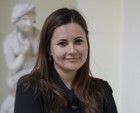
Area Politica internazionale
Competenze: Asia centrale, Asia orientale, politica estera e di sicurezza della Cina, relazioni internazionali, relazioni tra Cina e spazio post-sovietico, relazioni tra Russia e Cina
Parole chiave: Asia centrale, Asia orientale, Cina, Covid-19, sicurezza
Regione: Lombardia
Funzione/Ruolo
Assegnista di ricerca, Dipartimento di Lettere e Filosofia, Università di Trento
Percorso professionale
Giulia Sciorati è assegnista di ricerca post-dottorato presso il Dipartimento di Lettere e Filosofia dell'Università di Trento, dove lavora a un progetto interdipartimentale sull'impatto della Belt and Road Initiative e della pandemia da Covid-19 sulla politica estera della Cina ( BRIICoPIC ), diretto dalla professoressa Sofia Graziani. Giulia Sciorati è anche Research Fellow per il China Programme dell'Istituto per gli Studi di Politica Internazionale (ISPI). Ha conseguito un dottorato di ricerca in Studi Internazionali presso la Scuola di Studi Internazionali dell'Università di Trento nel settembre 2020. La sua tesi ha indagato i driver della politica antiterrorismo cinese nello Xinjiang dal 1996 al 2017 attraverso un approccio realista neoclassico. Durante i suoi studi, è stata visiting researcher presso l'Università di Oxford, Nottingham e l'Istituto europeo di studi asiatici (EIAS). I suoi interessi di ricerca includono la politica estera e di sicurezza della Cina, le relazioni della Cina con l'Asia centrale e la teoria del soft power.
Risultati scientifici
Si occupa di questioni di sicurezza con particolare riferimento alle politiche di antiterrorismo e ai fattori che influenzano le politiche decisionali a livello di leadership governativa in Cina. Un secondo filone di ricerca si concentra sulla proiezione regionale della politica estera cinese con particolare attenzione alla Nuova Via della Seta e il suo impatto sulle relazioni della Cina con i Paesi centrasiatici.
Attività editoriali e pubblicazioni
[2021, in corso di pubblicazione] Looking East? An Analysis of Kazakhstan’s Geopolitical Code after Participation in China’s Belt and Road Initiative, Eurasiatica: Studies on the Balkans, Anatolia, Iran, the Caucasus and Central Asia.
[2021] Post-Pandemic Asia: A New Normal for Regional Security?, with A. Berkofsky, Milan, Ledizioni.
[2020] Mapping China’s Global Future: Playing Ball or Rocking the Boat?, with A. Berkofsky, Milan, Ledizioni.
[2020] Pandemic Trust: China-Italy Relations During Covid-19, Panorama: Insights into Asian and European Affairs, 22(2): 39-50.

Area Economia e Finanza
Competenze: economia finanziaria, finanza
Parole chiave: coronavirus, Covid-19, Covid-19: impatto della DAD sul rendimento accademico, Covid-19: impatto sulla violenza domestica, Covid-19: impatto sulle donne, economia internazionale, finanza, geopolitica, mercati finanziari
Regione: Lombardia
Funzione/Ruolo
Presidente di Global Thinking Foundation. esponsabile delle Pubblicazioni e Membro del Consiglio Direttivo di ASSIOMF orex. Membro onorario di ACI FX International.
Percorso professionale
Dal 2016 è Presidente di Global Thinking Foundation, fondazione no profit dedicata alla diffusione dell’Educazione finanziaria per adulti e donne, al contrasto alla violenza economica e al supporto al diritto allo studio per ragazzi meritevoli e non abbienti.
Socia Fondatrice di ASSIOM FOREX, già Vice Presidente di ASSIOM e attiva in Associazione dal 1993. È stata Segretaria Generale ASSIOM FOREX dal 2009 al 2016 ed è attualmente Direttrice Responsabile delle Pubblicazioni e Membro del Consiglio Direttivo.
E’ stata Chairman Board of Education di ACI FX International dal 2012 al 2015, ora Honorary Member ACI International. Membro della Consulta Esperti , VI Commissione Finanze Camera dei Deputati.
Ha collaborato con diverse Università italiane, attualmente è docente a livello volontario associativo ASSIOM FOREX per Trading Avanzato, Finanza Islamica, Basilea3 e Rischio Sovrano/Rischio Corporates al Master Eraclito 2000. Regolarmente speaker per PFEXPO, ITalian Trading FORUM, Salone del Risparmio e TOL Expo. Docente per Feduf , Economix per le settimane dell’Educazione Finanziaria.
Risultati scientifici
Ha dedicato la sua carriera di oltre 30 anni all’attività di Trader e poi Manager in primarie banche italiane sui mercati internazionali, all’approfondimento delle dinamiche geopolitiche globali e alle relative correlazioni economico-finanziarie, ricoprendo ruoli di responsabilità in sala operativa e manageriali nelle CapoGruppo di Unicredit Group, Gruppo Intesa e Credito Emiliano.
L’impegno nel Trading sui mercati internazionali e nelle Analisi strategiche l’hanno portata a un naturale coinvolgimento e impegno manageriale nel Debt Capital Market, Credit Analysis e Relazioni Internazionali e anche a Roma come Responsabile Relazioni Internazionali con UE, Banche Centrali, Multilaterals & Authorities, consolidando la sua passione per la Geopolitica e i Mercati Internazionali.
Attività editoriali e pubblicazioni
Claudia Segre ha scritto l’introduzione di Parole di Economia e Finanza. Glossario di Educazione Finanziaria, Global Thinking Foundation in collaborazione con Maurizio Bernardo, Giunti, 2016.
Autrice di articoli su tematiche finanziarie e di geopolitica, collabora da anni con una sua rubrica con: ITForum NewLetter, First on Line (Blog), Wall Street Italia, Donna Moderna, La Verità e altri newspaper. Spesso presente su media italiani ed esteri : RaiNew24, CFN CNBC, Rai 3, Le Fonti TV e Radio24 Investire Informati.
Riconoscimenti e premi
2017 : Best 100 CV Excellent Women against Stereotypes, for Economy & Finance, Fondazione Bracco supported by EU Commission
2016 : ASSIOM FOREX Cavanna Lifetime Achievement Award
2011 : 1000 CV Excellent Fondazione Bellisario
2005 Best Dealer Hungarian Market – MTS NewEurope
1999 Best Political Format “Geopolitics Atlas” RaiNews24

Funzione/Ruolo
Ex atleta, campionessa di calcio. Commentatrice tecnica e opinionista TV.
Percorso professionale
Katia Serra inizia la sua carriera come calciatrice (centrocampista laterale) esordendo in Serie B nel 1986 con la società Bazzano, successivamente diventata Bologna CF. Gioca in numerose società calcistiche nazionali di serie A, chiudendo la carriera nel campionato spagnolo nel 2010 (seconda calciatrice italiana a giocare all’estero). Carriera condizionata dai numerosi interventi chirurgici iniziati già in età adolescenziale e dai frequenti infortuni. Il suo palmares include 1 Scudetto, 3 Coppa Italia, 1 Super Coppa Italiana, 1 Italy Women's Cup, segnando complessivamente 125 gol. Ha indossato la maglia azzurra (25 presenze e 1 gol).
Nel 2002 consegue la Laurea in Scienze Motorie successivamente al Diploma I.S.E.F, diventa Personal Trainer e nel calcio ottiene le abilitazioni di allenatrice UEFA A, Direttore Sportivo (votazione 110 con Lode, prima e unica donna), Match Analyst oltre ad acquisire certificazioni sulla gestione manageriale.
Contestualmente alla carriera in campo, ricopre diverse esperienze lavorative nel calcio, come preparatrice atletica e allenatrice giovanile. Da allenatrice è Campionesse d’Italia U.15 con la rappresentativa dell’Emilia Romagna nel 2002. Come dirigente è dapprima Delegata del Settore Giovanile per il femminile al C.R.E.R. 1999 - 2003 (prima nella storia) poi ricopre diversi ruoli nell'AIC (Associazione Italiana Calciatori) come referente delle calciatrici diventandone la prima Consigliera (2009-2011) e successivamente la prima Responsabile del Settore Femminile (2013-2020), contribuendo a costruire e garantire diritti e tutele fino al raggiungimento del professionismo. Della FICG (Federazione Italiana Giuoco Calcio) è Consigliera Federale (2006-2009), formatrice degli allenatori (2015-2021) e componente della Commissione di sviluppo del Calcio Femminile (2015-2019). Dal 2015 allena la nazionale di calcio delle Parlamentari.
Terminata l’attività agonistica, si cimenta come commentatrice in un ruolo precluso ad una donna. Così dal 2010 è commentatrice tecnica e opinionista in programmi TV per la Rai, con una parentesi a Sky Italia nella stagione 2018/19. Ha commentato numerosi Europei e Mondiali sia femminili che maschili, anche giovanili, ed è stata ospite fissa a trasmissioni cult (Il Grande Match, 90°Minuto, Dribbling Europei, Sabato Sprint, La Giostra del Gol). È stata la prima e unica donna voce tecnica della Nazionale italiana U.21 (2021-2023)e della nazionale A maschile nella vittoriosa finale Italia-Inghilterra di Wembley (2021), oltre ad aver Commentato i recenti MONDIALI del QATAR per RADIO RAI (2022), dopo un percorso virtuoso che l’ha vista pioniera nelle partite dei campionati di Serie A Tim (per Sky), della Tim Cup, della Serie B, della Lega Pro, della Primavera e della nazionali italiane giovanili. Per il calcio femminile commenta il campionato di Serie A e la Nazionale Italiana.
Dal 2018 è titolare dell'insegnamento "Modelli di gestione del calcio femminile" presso il Corso di studi in Scienze motorie, indirizzo Calcio, all'Università telematica San Raffaele di Roma e Milano e dal 2023 è docente di “Sport, comunicazione e genere”al Master di Comunicazione e Marketing dello Sport dell’ALMA MATER di Bologna.
Collabora con aziende come testimonial e in qualità di consulente degli aspetti tecnici del calcio.
Attività editoriali e pubblicazioni
Spot televisivo della birra nastro azzurro - Filmaster - “Partitone, perché no?”, 1998
Articoli per il mensile di AIC “Il Calciatore”, 2011-2020
Libro “Il Calcio è donna”-storie e volti delle protagoniste azzurre, Aic Editore, 2013
“Cocomeri libri e palloni” - scritto da Sandro Santori, contiene il racconto intitolato “Katia” editore Libri di Sport, 2006
Una vita in fuorigioco. Cronache dal mondo che tutti pensano di conoscere. Con i contributi di Arrigo Sacchi, Lele Adani e Damiano Tommasi. Fabbri Editore, 2023.
2023 Spot radiofonico per TeamSystem Premium partner delle nazionali italiane di calcio – Klein Russo agenzia, produzione audio Eccetera, producer Two Men Band.
Riconoscimenti e premi
2024 47° Microfono d’argento, Premio Sport e Giornalismo
2021 Cittadinanza onoraria di Anzola Dell'Emilia
2007 Miglior Calciatrice Oscar del Calcio nazionale
2002 Medaglia di bronzo al valore atletico CONI

Funzione/Ruolo
Ricercatrice in Filosofia Politica, Dipartimento di Sociologia e Ricerca Sociale all'Università di Milano-Bicocca.
Percorso professionale
Dopo la laurea in Filosofia all’Università di Torino, consegue il master in Sociologia delle migrazioni all’Università “La Sapienza” di Roma e un dottorato in Studi Culturali all’Università di Palermo. Opera come ricercatrice presso l’associazione Parsec di Roma e per numerose organizzazioni nazionali e internazionali tra cui Save the Children, Open Society Foundations, Action Aid, Consorzio Nova, Room to Read. A partire dal 2012 lavora presso il Dipartimento di Sociologia e Ricerca Sociale dell’Università di Milano-Bicocca, prima come assistente di ricerca e poi come assegnista di ricerca e dal 2019 come ricercatrice in Filosofia Politica. Attualmente è titolare dell’insegnamento “La politica e le politiche”, è docente e membro del comitato di coordinamento del corso di perfezionamento post-laurea “Violenza contro le donne e i minori: conoscere e contrastare il fenomeno”, e co-cordinatrice del corso “Formare le operatrici/gli operatori sociali per il contrasto alla violenza di genere”.
Risultati scientifici
È impegnata nelle attività di ricerca e formazione del Centro di ricerca ADV – Against Domestic Violence e nelle attività di costruzione del network UN.I.RE - UNiversità In REte contro la violenza di genere - progetto finanziato con il contributo della Presidenza del Consiglio dei Ministri - Dipartimento per le Pari Opportunità.
Attività editoriali e pubblicazioni
Giorgia Serughetti è editorialista del quotidiano Domani e scrive per riviste e quotidiani quali InGenere, Leggendaria, il Mulino, il Manifesto.
[2020] Serughetti G, Who are « the people » in Italy’s multiple populisms?. REVUE TUNISIENNE DE SCIENCE POLITIQUE, vol. 2 (4): 71-95.
[2020] Serughetti G, Donne vulnerabili, soggetti resilienti: le vittime di tratta richiedenti asilo, tra bisogni di protezione e domande di riconoscimento. In I. Fanlo Cortés, & D. Ferrari (a cura di), I soggetti vulnerabili nei processi migratori. Giappichelli: 17-48.
[2020] Serughetti G, The #MeToo Movement in Italy: Chronicle of a Death Foretold?. In A.M. Noel, & D.B. Oppenheimer (a cura di), The Global #MeToo Movement : How Social Media propelled a Historic Movement and the Law responded. Full Court Press: 143-156.
[2020] Serughetti G, Democratizzare la cura / Curare la democrazia, Nottetempo.
[2020] Belliti D, Serughetti G, L'educazione per prevenire la violenza di genere e promuovere l'agency delle donne: lo stato delle politiche pubbliche in Italia. SICUREZZA E SCIENZE SOCIALI, 3: 33-48.
[2019] Serughetti G, Prostituzione: violenza o lavoro? Riflessioni su volontarietà, costrizione e danno nel dibattito sulle alternative politico-normative. AG-ABOUT GENDER, vol. 8 (15): 164-195.
[2019] Serughetti G, La violenza contro le donne e il problema dell’identità collettiva nel femminismo. POLITICA & SOCIETÀ, vol. 8 (3): 383-405.
[2019] Serughetti G, Uomini che pagano le donne. Dalla strada al web, i clienti nel mercato del sesso contemporaneo, 2. ed. Ediesse.
[2019] Serughetti G, “Superare la Merlin”: prostituzione, discorso pubblico e azione legislativa. NOTIZIE DI POLITEIA, vol. 35 (133): 198-216.
[2018] Serughetti G, Smuggled or Trafficked? Refugee or job seeker? Deconstructing rigid classifications by rethinking women’s vulnerability. ANTI TRAFFICKING REVIEW, 11: 16-35.
[2017] Cecilia D’Elia, Serughetti G, Libere tutte. Dall’aborto al velo, donne nel nuovo millennio, Minimum fax.
[2016] Serughetti G, Prostitution and surrogacy: Theoretical and practical issues of (neo) prohibitionism. STUDI SULLA QUESTIONE CRIMINALE, 11(2): 43-63.

Funzione/Ruolo
Capo gruppo del laboratorio di ricerca Synthetic and Systems Biology for Biomedicine dell'Istituto Italiano di Tecnologia, con sede a Napoli, presso l'Università Federico II.
Percorso professionale
Dopo aver conseguito la Laurea in Biotecnologie per la Salute e la Laurea magistrale in Biotecnologie Mediche (Cum laude e menzione alla carriera) presso l’Università di Napoli Federico II, Velia Siciliano ha svolto un Dottorato di Ricerca in Genetica Umana presso il Telethon Institute of Genetics and Medicine, Napoli, Italia. Nel 2012 si è trasferita a Boston dove ha svolto attività di Postdoctoral fellow nel dipartimento di Bioingegneria e al centro di Biologia Sintetica del MIT. Nel 2015 in seguito alla vincita di una borsa di studio per giovani ricercatori indipendenti conferita dall’università Imperial College London, si sposta a Londra dove inizia una linea di ricerca indipendente nel dipartimento di medicina.
A settembre 2017 viene reclutata dall’Istituto Italiano di Tecnologia-IIT con il programma Tenure Track dopo un’iniziale valutazione da parte di una commissione scientifica internazionale. In IIT Velia Siciliano sviluppa una nuova linea di ricerca, Synthetic and Systems Biology for Biomedicine. Contemporaneamente mantiene una posizione di ricercatrice onoraria all’Imperial College London che le consente di continuare le attività di ricerca iniziate a Londra.
Risultati scientifici
Velia Siciliano ha recentemente vinto il più prestigioso fondo di ricerca, l’ERC Starting Grant, un finanziamento di 1.5 milioni di euro dalla comunità europea. E’ inoltre partner di altri finanziamenti: un ERC Advanced (coordinato dal Prof. Di Leonardo, Università la Sapienza, Roma) e il Cosy-BIo (FET-grant, europeo. Coordinato dal Prof. Di Bernardo).
E’ co-inventrice di 1 brevetto (MIT), è stata relatrice in più di 13 conferenze, è membro del comitato scientifico per la scuola estiva di Synthetic and Systems Biology (https://ssbss2018.icas.xyz/), per il Mammalian Syntehtic bIology workshop, ed è chair della conferenza di Cell Therapies + Bioengineering (https://www.aiche.org/sbe/conferences/cell-therapies-and-bioengineering-conference/2018).
Velia Siciliano fa della Global Young Academy of Science dal 2018, ed è stata riconosciuta come una tra i 10 ricercatori under 40 più promettenti in Italia da Fortune (https://www.fortuneita.com/2019/07/14/40-under-40-i-10-giovani-ricercatori-da-tenere-docchio/), e una della 1000 donne con più impatto in Italia per scienza e innovazione (https://startupitalia.eu/unstoppablewomen). Infine è tra le 20 finaliste di Donna D (La Repubblica) per donna del 2019.
Attività editoriali e pubblicazioni
Velia Siciliano è Review Editor per Nanobiotechnology, Frontiers in Molecular Biosciences, Bioengineering e Biotechnology and Materials ed è stata invitata a far parte del comitato editoriale di BioDesign Research, una rivista internazionale, peer-reviewed, open-access, parte della famiglia Science Partner Journal (SPJ); è ad-hocreviewer per più riviste.
[2020] Tedeschi F, Siciliano V.,Mammalian synbio sensors,in Hanbook of Cell Biosensor, Springer.
[2019] Dipalo M, Caprettini V, Bruno G, Caliendo F, Garma L, Melle G, Dukinova M, Siciliano V, Santoro F, De Angelis F. Membrane Poration Mechanisms at the Cell–Nanostructure Interface, Advanced Biosystems, 3(12): 1900148.
[2019] Pennacchio FA, Caliendo F, Iaccarino G, Langella A, Siciliano V, Santoro F. 3D-patterned scaffolds modulate the biointerface at the nanoscale, Nano Letters, 19 (8), 5118-5123.
[2019] Cella F. Siciliano V., Protein-based parts and devices that respond to intracellular and extracellular signals in mammalian cells, Current Opinion in Chemical Biology, 52, 47-53.
[2019] Caliendo F., Dukhinova M., Siciliano V., Engineered cell-based therapeutics: synthetic biology meets immunology, Frontiers in Bioengineering and Biotechnology.
[2018] Cella F., Wroblewska L., Weiss R, Siciliano V. Engineering of protease sensitive RNA-Binding protein in mammalian cells, Nature Communications, 7, 43.
[2018] Siciliano V., Di Andreth B., Monel B., Beal J., Huh J.,Clayton K.,Wroblewska L.,McKeon Am., Walker BD.,Weiss R. Engineering modular intracellular protein sensor-actuator devices. Nature Communications, 9(1):1881.
[2015] Wroblewska L, Endo K, Kitada T, Siciliano V, Saito H, Weiss R. Engineering mammalian cells with RNA-encoded synthetic translational circuits. Nature Biotechnology, 33(8):839-41.
[2014] Stanton B, Siciliano V, Ghodasara A, Wroblewska L, Clancy K, Trefzer A, Chesnut J, Weiss R, Voigt C. Systematic transfer of prokaryotic sensors and circuits to mammalian cells. ACS Synthetic BiologyDec 19;3(12):880-91.
[2013] Siciliano V, Garzilli I, Fracassi C, Ventre S, Criscuolo S, di Bernardo D. miRNAs confer phenotypic robustness to gene networks by suppressing biological noise: a synthetic biology approach. Nature Communications, 4:2364.
[2012] Menolascina F, Siciliano V, di Bernardo D. Engineering and Control of Biological Systems: A New Way to Tackle Complex Diseases and Biotechnological Innovation. FEBS Letter, 586(15):2122-8.
Riconoscimenti e premi
2014 Premio per innovazione scientifica in synthetic biology. Synberc fall retreat
2016 Proof-of concept grant, Synbicite (UK)
2018 Premio Giovani Innovatori MIT Italia
2018 Premio Galilei, 2032 Rotary International
2019 Premio Mortari Award, Merck
Nel settembre 2021 viene nominata fra le 50 donne italiane di maggiore ispirazione per il mondo della tecnologia con il riconoscimento InspiringFifty for Italy.

Funzione/Ruolo
Professoressa ordinaria di Storia contemporanea presso il Dipartimento di studi Umanistici dell’Università di Pavia.
Percorso professionale
Elisa Signori si laurea con lode in Lettere nel 1976 all’Università di Pavia. E’ alunna e perfezionanda presso il Collegio Ghislieri, borsista della Fondazione Einaudi di Torino, dell’Accademia dei Lincei, Stagiaire presso l'Ufficio Studi e Ricerche del Dipartimento della Pubblica Educazione del Canton Ticino (Svizzera), borsista del CNR presso l’Historische Seminar dell’Università di Basilea, dal1981è ricercatrice presso l’Università di Pavia. Qui svolge la sua attività fino ad oggi, percorrendo tutti i gradi della carriera, da professoressa associata a ordinaria. Tra il 2013 e il 2020 insegna Storia contemporanea anche presso l’Università della Svizzera italiana.
Risultati scientifici
Signori ha dedicato gran parte dei suoi studi allo studio del fascismo e dell’antifascismo, sia in Italia che all’estero, in Francia, Svizzera, Stati Uniti. Ha studiato la storia della Svizzera nei suoi rapporti con l’Italia tra Otto e Novecento, il fenomeno dell’antisemitismo in Italia e in Europa, i flussi di migrazioni intellettuali e la formazione delle élites in Europa nel sec.XX.
Si è occupata anche di storia della Lombardia contemporanea e di storia dell’Università.
Attività editoriali e pubblicazioni
Elisa Signori è autrice di numerose pubblicazioni, di cui si trova lista completa a questo indirizzo https://iris.unipv.it/
Di seguito, una selezione delle più rilevanti:
Signori (2020). Anni di svolta. L’Università di Pavia, i progetti postbellici e il piano De Carlo, in Costruire le Università. Aspetti architettonici e urbanistici tra ragioni economiche e scelte politiche, a cura di M.A.Romani, A.Monti, O.Selvafolta e Andrea Silvestri, Bologna Il Mulino, pp.181-206.
Signori (2019), Contro gli studenti ebrei stranieri di Pisa. Un ostracismo in anticipo, in Vite sospese. 1938: Università e ebrei a Pisa, a cura di M. Emdin, B. Henry , I. Pavan, UPI University Press Italiane, Pisa, pp. 89-106
Signori (2018), Svizzera e Italia allo specchio: lo sguardo dei rifugiati italiani durante la seconda guerra mondiale in Lugano città aperta, collana Pagine storiche Luganesi, Edizioni Città di Lugano, Lugano, pp.203-219
Signori (2017), L’Ateneo di Pavia nel sistema universitario del Regno d’Italia (1860-1913) in Almum Studium Papiense, Vol.2, Dall’età austriaca alla nuova Italia. II. Dalla Restaurazione alla Grande guerra, Milano, Cisalpino, 2017, pp. 1043-1080.
Signori (2017), University students after Italian Unification. Riots, organizations and political engagement (1860-1885) in Pieter Dhondt (ed.), Student Revolt, City and Society in Europe – From the Middle Ages to the Present, New-York, London, Routledge, pp.152-169.
Signori (2017), Perchè la guerra? Voci e argomenti della comunità accademica italiana 1914-1918 in Minerva armata. Le università e la Grande guerra, a cura di G.P.Brizzi e E.Signori, Bologna, Clueb, pp.19-38.
Signori (2017), Guglielmo Ferrero: l’interventismo, la federazione latina, la tragedia della pace, in La Grande guerra e l'idea di Europa, a cura di C. Lacaita, Milano, Angeli, pp. 81-110.
Signori (2016), El fascismo italiano y la universidad: el caso de Pavia, in La universidad europea bajo las dictaturas, “Ayer” , n. 101, pp.23-50.
Signori (2009) , Fra le righe. Carteggio fra Carlo Rosselli e Gaetano Salvemini, FrancoAngeli, Milano, pp.334.
Signori (2006) Frammenti di vita e d’esilio. Giulia Bondanini, una scelta antifascista, L’Avvenire dei lavoratori ed., Zürich, pp.176.
Signori (2002), Minerva a Pavia. L'ateneo e la città tra guerre e fascismo, Pavia, Milano-Bologna, Cisalpino ed., pp.342.
Signori (1996) , G. Salvemini, A. Tasca, Il dovere di testimoniare .Carteggio, a cura e con introduzione di E.Signori, Roma-Napoli, Bibliopolis ed., pp.344.
Riconoscimenti e premi
A Elisa Signori sono stati assegnati il premio “Nuova Antologia”e il premio “Angelini".

Funzione/Ruolo
Professoressa ordinaria all’Università La Sapienza di Roma
Percorso professionale
Insegna Storia dell’Analisi economica e Macroeconomia, corso avanzato, all’Università La Sapienza di Roma. Ha partecipato e/o diretto numerose ricerche a livello nazionale ed europeo nei campi dell’economia e della politica economica, del mercato del lavoro e delle politiche sociali, del welfare e dell’economia di genere. Ha partecipato a numerosi convegni e workshop, nazionali e internazionali in qualità di invited speaker.
Membro di diverse associazioni, tra cui: SIE, Storep, EAEPE, IWPLMS.
Argomenti di ricerca in corso: problemi dell’Unione monetaria Europea; politica industriale, innovazione e crescita; relazioni industriali, dialogo sociale e distribuzione del reddito; economia di genere: il settore della cura come volano della crescita.
Risultati scientifici
Nel campo della politica economica si è interessata ai problemi dell’economia italiana, della sua struttura industriale e della sua collocazione internazionale. Suoi contributi recenti riguardano l’Euro e i difficili rapporti tra Germania e i paesi del Sud Europa.
Connesso a questi temi vi è il problema della politica industriale. L’analisi dei processi di innovazione e dello sviluppo mette in luce come non esista una politica industriale buona per tutti i paesi: le istituzioni politiche e sociali, il grado di sviluppo (inteso come ricchezza e complessità del tessuto industriale), le capacità dell’amministrazione pubblica determinano la scelta delle misure di politica industriale compatibili con ciascuna specifica realtà.
In materia di lavoro e relazioni industriali si mostra come l'interazione fra le riforme del lavoro, le politiche di austerità e le riforme strutturali nei settori della tassazione, delle pensioni e del welfare abbia aggravato la precarietà, la disuguaglianza e la povertà. L'analisi evidenzia i costi che derivano dall’affidarsi esclusivamente a riforme volte ad accrescere la flessibilità del mercato del lavoro per rilanciare l'occupazione e la crescita. Si conclude che la ripresa del dialogo sociale e l’abbandono delle politiche di austerità a favore di un'efficace politica industriale possono fornire una ricetta migliore per superare la crisi e affrontare le sfide dell’innovazione tecnologica e della competizione globale.
I risultati di queste ricerche sono stati riportati in diverse pubblicazioni.
Attività editoriali e pubblicazioni
Annamaria Simonazzi ha svolto il compito di referee per riviste nazionali e internazionali. È condirettrice di Economia & Lavoro; membro del comitato editoriale di Labour e del comitato editoriale della newsletter www.ingenere.it.
Fra le pubblicazioni più recenti:
(di prossima pubblicazione) Fiorani G, Simonazzi A. Industrial Relations and social dialogue in turbulent times. Economia & Lavoro, 1, 52.
(di prossima pubblicazione) Simonazzi A. Engines of growth and development paths in the Euro-area, in Rosselli A, Sanfilippo E and Naldi N. (eds.) “Money, Finance and Crises in Economic History: The long-‐term impact of economic ideas”.
(2018) Celi G, Ginzburg A, Guarascio D, Simonazzi A. Crisis in the European Monetary Union: A Core-Periphery Perspective, Routledge, London.
(2017) Italy: Industrial Relations and Inequality in a Recessionary Environment, in Vaughan-Whitehead D. (ed.) “Inequalities and the World of Work: What Role for Industrial Relations and Social Dialogue?”, ILO, Geneva pp. 227-264.
(2017) Simonazzi A. Per la ripresa dello sviluppo nell’area dell’euro, Quaderni di Rassegna Sindacale, 3: 105-118.
(2017) Ginzburg A, Simonazzi A. Out of the crisis. A radical change of strategy for the euro zone. European Journal of Comparative Economics, 14, 1:13-37 .
(2016) Simonazzi A, Villa P. Europe at a crossroads: what kind of structural reforms? in Bäcker G, Lehndorff S, Weinkopf C. (eds) “Den Arbeitsmarkt verstehen, um ihn zu gestalten”, Springer VS, Berlino, ISBN 978-3-658-12159-4, pp. 273-282.
(2016) Guarascio D, Simonazzi A. A polarized country in a polarized Europe: an industrial policy for Italy’s renaissance. Economia e Politica Industriale, Journal of Industrial and Business Economics, ISSN 0391-2078, Econ Polit Ind DOI 10.1007/s40812-016-0042-9.
(2016) Barbieri T, Simonazzi A. The Middle Class in Italy: reshuffling, erosion, polarization in D. Vaughan-Whitehead (ed.), “European Middle class Disappearing – Evidence in the World of Work”, Edward Elgar-ILO, Cheltenham (UK)-Northampton (USA)-Geneva.

Funzione/Ruolo
Professoressa associata di Storia e Istituzioni dell’Asia, Dipartimento di Studi su Asia e Africa Mediterranea, Università Ca’ Foscari, Venezia.
Percorso professionale
Si laurea in Lettere all’Università di Firenze con una tesi di storia contemporanea e prosegue gli studi a Londra, dove ottiene il Ph.D nel 2004 allo University College London in Hebrew and Jewish Studies. Rientra in Italia dove comincia a collaborare con l’Università di Venezia, prima come docente a contratto, poi come assegnista (dal 2007) e poi come ricercatrice a tempo indeterminato (dal 2011). Come borsista, post-doc e/o visiting scholar, è stata ospite di atenei e centri di ricerca, negli USA (Brown University, American Jewish University), in UK (University of Oxford, Institute of Historical Research, London), in Francia (INALCO), Israele (Hebrew University of Jerusalem, Centre de Recherche Francais à Jérusalem), Cina (University of Nanjing). Dal 2004 insegna anche alla New York University di Firenze.
Risultati scientifici
Ha lavorato su diversi temi e filoni di ricerca nella storia sociale del conflitto israelo-palestinese e mantiene una agenda di ricerca molto attiva. Tra i suoi interessi, ci sono la storia della medicina e della sanità pubblica nella Palestina del Mandato britannico, il cinema israeliano, la nonviolenza e resistenza civile in Israele e Palestina e l’obiezione di coscienza militare in Israele.
Attività editoriali e pubblicazioni
Tra le pubblicazioni degli ultimi 10 anni si annoverano:
Monografie
[2018] Simoni M, Miccoli D, Foscarini G, Homelands and Diasporas: Perspectives on Jewish Culture in the Mediterranean and Beyond, Cambridge Scholars, Newcastle upon Tyne.
[2010] Simoni M, A Healthy Nation. Zionist Health Policies in British Palestine (1930-1939), Cafoscarina, Venezia.
[2010] Simoni M, At the Margins of Conflict. Social Perspectives on Arabs and Jews in British Palestine (1922-1948), Cafoscarina, Venezia.
Curatele e numeri speciali di riviste
[2013] Simoni M, Israelis and Palestinians Seeking, Building and Representing Peace, “Quest. Issues inContemporary Jewish History, 5.
Capitoli in volumi
[2018] Simoni M, Young Italian Jews in Israel, and back. Voices from a generation (1945-1953), pp. 173-200, in “Italian Jewish Networks between Europe and the Mediterranean”, Schwarz G, Ferrara C, Bregoli F (eds.), Palgrave Macmillan, New York.
Articoli in riviste scientifiche Peer-Reviewed
[2017] Simoni M, (ed.) Narcotici e storia globale, in Simoni, M, “Passato e Presente”, vol. 101, pp. 167-90.
[2016] Simoni M, Una storia di relazioni mancate. Giorgio La Pira e il conflitto israelo-palestinese, in Humanitas, vol. 71/5, pp. 724-32.
[2013] Simoni M, «Hello Pacifist». War resisters in Israel’s first decade, in Simoni M (ed.), “Israelis and Palestinians Seeking, Building and Representing Peace” “Quest. Issues in Contemporary Jewish History” 5, pp. 73-100.
[2013] Simoni M, «Spara e Prega!» Il cinema israeliano a trenta anni dalla guerra del Libano, in, Passato e Presente, vol. 31/88, pp. 111-30.
[2013] Simoni M, Imparare a separarsi. L’educazione di arabi e ebrei nella Palestina britannica (1922-1948), in “Qualestoria”, 40/2: 61-84.
[2012] Simoni M, Giovani, educazione e democrazia in Israele. La prospettiva di «New Outlook» negli anni Sessanta, in SMP Società Mutamento Politica, vol. 3/5, pp. 121-33.
[2012] Simoni M, Legrenzi M, Di Peri R, Mazzuccotelli F, Meier D, Il Libano prima e dopo il 1982, in Passato e Presente, vol. 87, pp. 19-37 e 249-62.
Riconoscimenti e premi
2009-10, Accademia dei Lincei (Roma) Premio “Alessandro Vaciago” per le scienze politiche e sociali

Area Politica internazionale
Competenze: produzioni culturali nel mondo arabo e nelle sue diaspore, storia dei movimenti sociali e politici in Medio Oriente e Nord Africa, storia politica e culturale del Nord Africa e del Medio Oriente, studi di genere
Parole chiave: donne, genere, Islam, Medio Oriente, mondo arabo, Nord Africa
Regione: ESTERO
Funzione/Ruolo
Direttrice Dipartimento di Lingua e Culture Arabe, Università di Sydney, NSW
Percorso professionale
Dopo la Laurea in Lingue e Letterature Orientali (Arabo) presso l’Università Ca’ Foscari di Venezia (2000), il Master sull’Immigrazione presso la stessa Università (2001), e il Master in Studi Interculturali presso l’Università di Padova (2001), ha conseguito il Dottorato in Civiltà, Culture e Tradizioni Arabo-Islamiche presso l’Università Ca’ Foscari di Venezia con una tesi sulla storia del femminismo egiziano (2006). Dal 2011 vive e insegna a Sydney, dove dirige il dipartimento di Lingua e Culture Arabe e insegna nel programma di Lingua e Cultura Araba, nel programma di International and Global Studies, di European Studies e di International and Comparative Literary and Translation Studies. Dal 2016 cura insieme a Paola Caridi il Programma Anime Arabe, un Focus sulla letteratura e la cultura araba al Salone del Libro di Torino.
Risultati scientifici
La sua ricerca nel campo della storia delle donne si concentra sullo studio del femminismo egiziano. Ha pubblicato una biografia sulle donne arabe, sulla leadership politica delle donne arabe e sul cinema iracheno contemporaneo.
Attività editoriali e pubblicazioni
Monografie
[2013] Sorbera L. (con Lorenzo Casini e Maria Elena Paniconi), Modernità arabe. Nazione, narrazione e nuovi soggetti nel romanzo egiziano, Mesogea, Messina.
Curatele
[2018] Sorbera L. (con Bronwyn Winter), Contending Legitimacy in World Politics, Taylor and Francis, London.
Monografici di Riviste
[2016] Sorbera L. (con Bronwyn Winter), "Legitimacy". Special issue of Global Discourse: An Interdisciplinary Journal of Current Affairs and Applied Contemporary Thought, 6(3).
[2014] Sorbera L. (con Maurizio Marinelli), "Imagining Revolution". Special issue of Post-Colonial Studies, 17(1).
[2013] Sorbera L. (con Leila El Houssi), "Femminismi nel Mediterraneo". Special Issue of Genesis. The Journal of the Italian Society of Women Historians, 12(1).
Articoli in riviste scientifiche (peer reviewed)
[2017] Sorbera L., "The Debate about Veiling and Unveiling. A transnational History?", Contemporanea, 20(4): 681-699.
[2016] Sorbera L., "Body Politics and Legitimacy: Towards a feminist epistemology of the Egyptian revolution", Global Discourse: An Interdisciplinary Journal of Current Affairs and Applied Contemporary Thought, 6(3): 493-612.
[2014] Sorbera L., "Challenges of thinking feminism and revolution in Egypt between 2011 and 2014", Postcolonial Studies, 17(1): 74-86.
[2014] Sorbera L., "Writing Revolution: New Inspirations, new questions", Postcolonial Studies, 17(1): 104-108.
[2013] Sorbera L., "Femminismo e rivoluzione in Egitto e Tunisia, in Linee di Conflitto. Il mondo arabo in trasformazione". Dossier, Afriche e Orientied (by Massimiliano Trentin) 15(1-2): 38-52.
[2013] Sorbera L. (con Leila El Houssi), "Femminismi nel Mediterraneo", Genesis. The Journal of the Italian Society of Women’s Historians, 12(1): 5-12.
[2013] Sorbera L., "Early Reflections of an Historian on Feminism in Egypt in Times of Revolution", Genesis. The Journal of the Italian Society of Women’s Historians, 12(1): 13-42.
Riconoscimenti e premi
Premio Franca Pieroni Bortolotti per la migliore tesi di dottorato in storia delle donne e di genere, conferito nel 2006 dalla Società Italiana delle Storiche.

Funzione/Ruolo
Professoressa emerita di Microbiologia Agraria presso l'Università degli Studi di Milano
Percorso professionale
Nel 1965 consegue la Laurea in Scienze Biologiche e prosegue la carriera accademica fino a diventare professoressa ordinaria di Microbiologia degli alimenti presso l'Università degli Studi del Molise. Dal 1993 al 2013 insegna Microbiologia agraria all'Università degli Studi di Milano. Assume diversi incarichi all'interno della governance universitaria: è Preside della Facoltà di Agraria dal 2004-2010 e durante tale mandato fonda la Facoltà di Agraria dell'Università di Makeni, in Sierra Leone. Dal 2005 al 2013 è Delegata del Rettore alla Cooperazione Internazionale allo Sviluppo. Claudia Sorlini è stata inoltre componente del Comitato Pari Opportunità dell'Ateneo di Milano (2007- 2010) e coordinatrice della sezione Donne e Scienza del Centro di Ricerca GENDERS - Gender & Equality in Research and Science (2006 - 2013). Dal 2013 assume incarichi esterni all'Università: nel 2014 fa parte della Steering Committee of the EU Scientific Programme for Expo 2015e dal 2013 del Comitato Women for EXPO (Ministero Affari Esteri).
Risultati scientifici
È esperta nel campo delle biotecnologie microbiche applicate al biorisanamento di siti inquinati, alla produzione di bioenergia (metano, idrogeno e fertilizzanti) e ai biofertilizzanti. Insieme al suo team ha messo a punto un sistema basato su cellule batteriche vitali per recuperare antiche statue di pietra e affreschi; un'immagine di queste indagini ha ottenuto la copertina dell'American Society for Microbiology Journal. Ha ottenuto un'esperienza specifica nella biodegradazione di inquinanti xenobiotici come plastiche, pesticidi, solventi ecc. ed è stata coinvolta nella promozione delle donne scienziato accogliendo giovani studentesse nei suoi progetti scientifici europei, e partecipando, come referente scientifico, ai progetti, come Stages (Structural Transformation to Achieve Gender Equality in Science, 2012-2013), che sostengono le pari opportunità di genere nella scienza.
Attività editoriali e pubblicazioni
Claudia Sorlini è autrice di circa 300 pubblicazioni su riviste internazionali e nazionali e capitoli di libri. Fra le più recenti:
(2018) Vigani G., Rolli E., Dell'Orto M, Michoud G, Soussi A., Raffafu N., Borin S., Sorlini C., Zocchi G., Daffonchio D. Root bacterial endophytes confer drought resistance and enhance expression and activity of a vacuolar H+ -pumping pyrophosphatase in pepper plants. Environmental Microbiology.
(2018) Sorlini C. Agricoltura e alimentazione: quale futuro? Notiziario della Banca Popolare di Sondrio, 137: 14-17.
(2016) Sorlini C. "Cambiamento climatico, una sfida da vincere". In Clima, il pianeta che cambia. Touring Club Italiano Milano, 7-9.
(2015) Expo 2015 EU Scientific Steering Committee. Fischler F., Wilkinson D., Benton T., Daniel H., Darcy-Vrillon B. Hefferman P., Kok E., Saarela M., Jakubczyc E., Sorlini C., Swinnen J., von Brown J. New ways of providing knowledge to tackle food and nutrition security: what should the EU do? European Union.
(2015) Sorlini C., Dendena B., Grassi S. "The mutifaceted nature of the agrifood world". In The many faces of sustainability, a cura di Veca S., Feltrinelli, Milano, 3-29.
Riconoscimenti e premi
Nel 2015 riceve dal Capo dello Stato, Sergio Mattarella, l'onorificenza dell'Ordine al Merito della Repubblica Italiana, per "ricompensare benemerenze acquisite verso la Nazione nel campo delle lettere, delle arti, della economia e nel disimpegno di pubbliche cariche e di attività svolte a fini sociali, filantropici ed umanitari, nonché per lunghi e segnalati servizi nelle carriere civili e militari".
Nello stesso anno è insignita dell'Ambrogino D'Oro, Civica benemerenza del Comune di Milano. Ha inoltre ricevuto il Premio "Donne che ce l'hanno fatta" di Pechino, 20 - Making women world congressper il suoimpegno tra arte, scienza, cultura e sociale e il Premio Tecnovisionarie: donne che vedono il futuro di EXPO Women Global Forum - Women & Tech per aver dato un contributo accademico rilevante e aver coordinato progetti europei e nazionali sulle tematiche dell'ambiente, dell'agricoltura e delle bioenergie. Per il suo impegno inoltre nella cooperazione internazionale, con un master e un progetto di ricerca sull'agricoltura in zone aride e la supervisione della Facoltà di Agraria di Makeni (Sierra Leone), che ha contribuito a istituire.

Area STEM: Scienze biomediche e biotecnologie
Competenze: biostatistica, metodi di ricerca
Parole chiave: analisi dei dati, autotrapianto, biostatistica, cancro, coronavirus, Covid-19, Covid-19 in persone con sclerosi multipla, risonanza magnetica, sclerosi multipla, vaccini nelle persone con sclerosi multipla
Regione: Liguria
Funzione/Ruolo
Professoressa ordinaria di Statistica media all'Università degli studi di Genova
Percorso professionale
Dopo aver conseguito la laurea in Fisica con indirizzo Biofisico presso l'Università degli studi di Genova nel 1992, prosegue la sua formazione attraverso una specialità in Fisica Medica, Analisi statistica dei dati medici e Imaging Biomedico presso l'Università di Pisa. Nel 1998 consegue la specializzazione in Statistica Medica all'Università degli Studi di Milano. Dal 1998 entra a far parte come borsista del gruppo di Epidemiologia Clinica dell'Istituto Nazionale per la Ricerca sul Cancro (IST) di Genova, dove si occupa di Sperimentazioni Cliniche in ambito oncologico. Per 10 anni collabora come consulente statistico con la Neuroimaging Reserach Unit dell'ospedale San Raffaele di Milano e si dedica alla ricerca sulla Sclerosi Multipla. Dal 2005 è Professoressa, prima associata, poi ordinaria di Statistica medica all'Università degli Studi di Genova.
Risultati scientifici
Il lavoro di ricerca di Maria Pia Sormani si focalizza sullo studio delle problematiche metodologiche legate all'uso della risonanza magnetica nella sclerosi multipla, che ha approfondito durante i dieci anni passati collaborando con la Neuroimaging Research Unit presso l'Ospedale San Raffaele di Milano e sulla definizione del disegno di studio per testare nuovi farmaci in questa patologia. Recentemente si è occupata di studi sull'efficacia dell'autotrapianto autologo di cellule ematopoietiche nei casi di sclerosi multipla aggressiva. Su questo argomento ha presentato una meta analisi al Congresso Europeo di Sclerosi Multipla (ECTRIMS) che dovrebbe costituire la base per pianificare e condurre uno studio randomizzato su questa terapia. Partecipa anche allo studio MESEMS, il primo studio mondiale che valuta il trapianto di cellule staminali nella sclerosi multipla, diretto dal prof Uccelli della Clinica Neurologica dell'Università di Genova. Altre aree di ricerca riguardano il trapianto di midollo osseo nelle leucemie, la definizione di endpoint nella Distrofia Muscolare di Duchenne e lo studio di endpoint surrogati in studi di cancro alla mammella, in collaborazione con il San Martino-IST di Genova.
Attività editoriali e pubblicazioni
Fa parte del comitato editoriale di Multiple Sclerosis Journal e Multiple Sclerosis and Related Disorders. Ha pubblicato più di 350 articoli su riviste peer reviewed.
Riconoscimenti e premi
Nel 2016 viene premiata tra le 38 top scientist italiane dall'osservatorio ONDA (Osservatorio Nazionale sulla Salute della Donna).

Funzione/Ruolo
Professoressa associata di Organizzazione aziendale all’Università degli studi di Milano.
Percorso professionale
Laureata in Scienze politiche, inizia il suo percorso accademico a Milano, dapprima all’Università Cattolica, successivamente a "La Statale". Fino ad aprile 2022 è stata presidente del Collegio didattico interdipartimentale del Corso di laurea in “Management pubblico e della sanità”, con sede presso la Facoltà di Scienze politiche, economiche e sociali.
È componente del Collegio del Dottorato di Ricerca in “Diritto ed Economia della Società Digitale” presso l’Università Uninettuno di Roma ed è membro del Comitato ordinatore del Master di 2° livello in Cybersecurity (Università degli studi di Milano).
È co-fondatrice e direttrice del Centro di Ricerca ICONA, istituito presso l’Università degli Studi di Milano, dove ha la responsabilità scientifica di progetti di consulenza e formazione su temi del cambiamento organizzativo
È componente del laboratorio Jean Monnet, Centro di ricerche diretto dal prof. Massimo Florio.
Fa parte della Scientific Commission "Public Enterprises / Public Services", istituita in ambito CIRIEC (Centre International de Recherches et d'Information sur l'Economie Publique, Sociale et Coopérative), Bruxelles.
Presidente e componente di commissioni di aggiudicazione, nell’ambito di gare indette da amministrazioni pubbliche, è anche pubblicista iscritta all'Albo professionale dei Giornalisti della Lombardia.
Risultati scientifici
L’attività di ricerca di Maddalena Sorrentino si focalizza sui fenomeni collegati al cambiamento organizzativo, alle implicazioni derivanti dall’adozione delle tecnologie dell’informazione e della comunicazione (ICT) e dei sistemi informativi. Ha partecipato a numerosi network e progetti di ricerca in Italia e all’estero. I suoi contributi scientifici sono pubblicati su riviste internazionali, capitoli di libro e atti di convegni.
Attività editoriali e pubblicazioni
Maddalena Sorrentino fa parte del Comitato editoriale di varie riviste internazionali: Government Information Quarterly, Information Polity, Transforming Government, Information Systems and e-Business Management.
È autrice di oltre 200 saggi, tra cui:
(2021) Castelnovo W, SorrentinoM. “The Nodality Disconnect of Data-Driven Government”. Administration & Society53 (9): 1418-1442.
(2020) Sorrentino M. “Public enterprises and the public mission. A multidimensional lens” In: L. Bernier, M. Florio, P. Bance (Eds.) The Routledge Handbook of State-Owned Enterprises, London: Routledge, pp. 73-90.
(2018) Castelnovo W, Sorrentino M. “Engaging with complexity in a public programme implementation”. Public Management Review 20(7):1013-1031.
(2018) Castelnovo W, Sorrentino M. “The digital government imperative: a context-aware perspective”. Public Management Review 20(5): 709-725.
(2018) Sorrentino M, Sicilia M, Howlett M. "Understanding co-production as a new public governance tool”. Policy and Society 37(3): 277-293.
(2017) Sorrentino M, Guglielmetti C, Gilardi S, Marsilio M. “Health Care Services and the Coproduction Puzzle. Filling in the Blanks”. Administration & Society 49 (10): 1424-1449.
(2013) Sorrentino M, De Marco M. “Implementing e-government in hard times: when the past is wildly at variance with the future”. Information Polity 18(4): 331-342.
(2013) Sorrentino M, Simonetta M. “Incentivising inter-municipal collaboration: the Lombard experience”. Journal of Management and Governance 17(4):887–906.
(2012) Sorrentino M, Passerini K. “Evaluating e–government initiatives: the role of formative assessment during implementation”. Electronic Government, an International Journal 9(2): 128-141.
(2010) Ferro E, Sorrentino M. “Can intermunicipal collaboration help the diffusion of E-Government in peripheral areas? Evidence from Italy”. Government Information Quarterly 27(1): 17-25.
(2007) De Marco M, Sorrentino M. “Sowing the seeds of IS cultivation in public sector organisations”. Journal of Information Technology 22(2):184-194.
(2005)Sorrentino M. “Taking care of invisible technology”. European Journal of Information Systems 14 (5): 507-509.

Funzione/Ruolo
Professoressa ordinaria di Ricerca operativa e Presidente della International Federation of Operational Research Societies, Università di Brescia
Percorso professionale
Dopo la laurea in Matematica nel 1980 presso l'Università degli Studi di Milano, prosegue la sua formazione frequentando la Scuola di Perfezionamento in Matematica. Nel 1983 consegue il diploma, diventando ricercatrice operativa. Dal 1983 al 1987 è professoressa associata della facoltà di Scienze Matematiche, Fisiche e Naturali dell'Università di Udine. Diviene poi titolare di un incarico di collaborazione all'Istituto per le Applicazioni della Matematica e dell'Informatica del CNR, dal 1986 al 1987. Dal 1994 è professoressa ordinaria di Ricerca Operativa della facoltà di Economia dell'Università di Brescia. Dal 2002 al 2008 è Preside della stessa facoltà. Dal 1 novembre 2016 è Prorettrice Vicaria dell'Università di Brescia.
Risultati scientifici
L'attività di ricerca di Maria Grazia Speranza è orientata allo studio di modelli di programmazione matematica a variabili miste intere, cioè di modelli di ottimizzazione in cui si vuole minimizzare o massimizzare una funzione le cui variabili sono vincolate a un insieme prefissato e devono in parte assumere valori interi. Tali modelli sono stati applicati a diversi problemi reali, in particolare nell'area della finanza, dove la decisione da prendere riguarda come investire un capitale in titoli con l'obiettivo di minimizzare il rischio dell'investimento garantendo un dato rendimento medio, e nell'area del trasporto e della logistica, dove la decisione riguarda ad esempio scelte di localizzazione o di distribuzione con l'obiettivo di minimizzare i costi garantendo un dato livello di servizio. Le ricerche più recenti riguardano il valore della collaborazione e la mobilità sostenibile.
Attività editoriali e pubblicazioni
Maria Grazia Speranza è responsabile editoriale di numerose riviste scientifiche come Transportation Science e EURO Journal on Transportation and Logsistic. È inoltre autrice di oltre 150 pubblicazioni, tra cui:
((2018) Archetti C, Christiansen, M, Speranza MG. Inventory routing with pickups and deliveries, European Journal of Operational Research, 268:314–324.
(2018) Speranza MG. Trends in transportation and logistics, European Journal of Operational Research, 264: 830–836.
(2017) Guastaroba G, Savelsbergh M, Speranza MG. Adaptive kernel search: A heuristic for solving mixed integer linear programs, European Journal of Operational Research, 263: 789-804.
(2017) Archetti C, Boland N, Speranza MG. A matheuristic for the multi-vehicle inventory routing problem, Informs Journal on Computing, 29:377-387.
(2016) Guastaroba G, Vigo D, Speranza MG. Intermediate facilities in freight transportation planning: a survey, Transportation Science, 50:763-789.
È inoltre coautrice dei volumi:
S. Martello, M.G. Speranza, Ricerca operativa per l'economia e l'impresa, Esculapio, 2012.
R. Mansini, W. Ogryczak, M. G. Speranza, Linear and Mixed Integer Programming for Portfolio Optimization, EURO Advanced Tutorials on Operational Research, Springer, 2015.
Riconoscimenti e premi
Nel 2008-2009 è stata Vice-Presidente di IFORS (International Federation of Operation Research Societies). Nel 2011-2012 è stata Presidente dell'EURO (Association of European Operational Research Societies). Nel 2014 è stata Presidente della Transportation Science and Logistic Society di INFORMS (The Institute for Operations Research and the Management Science). E' membro dei comitati scientifici dei principali convegni internazionali nell'area dei trasporti e della logistica. E' chair del program committee del convegno IFORS che si terrà a Quebec City nel 2017. E' stata plenary speaker a numerosi convegni internazionali e in particolare a Optimization days 2005 a Montréal (insieme a John Nash) e alla 27th European Conference on Operational Research tenutasi a Glasgow nel 2015.

Area Storia e Filosofia
Competenze: filosofia, filosofia politica, filosofia sociale, religioni, storia del pensiero politico, studi di genere
Parole chiave: genere, populismo, post-coloniale/decoloniale, religione, secolarizzazione/post-secolarizzazione, sfera pubblica, società civile, teologia
Regione: ESTERO
Funzione/Ruolo
Professoressa di Teoria politica alla New York University di Firenze, attualmente Visiting alla facoltà di Studi Liberali presso la New York University di Shangai
Percorso professionale
Spini si laurea in Filosofia Politica presso l’Università di Firenze nel 1991. Nel 1995 si perfeziona in Storia dle Pensiero Politico presso la Scuola di Studi Superiori “Sant’Anna” di Pisa. Dal 1998 insegna Teoria politica alla Syracuse University di Firenze e alla New York University in Firenze. Fra il 2003 e il 2019 è più volte Professoressa a Contratto presso la Facoltà di Scienze Politiche dell’Università di Firenze in Filosofia Sociale, nel Corso di Laurea in Sociologia e Ricerca Sociale, dove insegna Filosofia sociale dal 2007 al 2011,e Filosofie della Sfera Pubblica dal 2003 al 2007.
Attualmente è Visintg Assistant Professor alla faclotà di Studi Liberali della New York University a Shangai.
Spini fa parte del Centro Studi «Confronti» (https://confronti.net), della Commissione Studi della Federazione Chiese Evangeliche in Italia (https://www.fcei.it/chiese-e-societa/)
e del Direttivo del Forum per i Problemi della Pace e della Guerra. (https://www.facebook.com/firenzeonlineforum/).
E' Presidente del Centro Culturale Protestante Pietro Martire Vermigli di Firenze (https://www.facebook.com/CentroCulturaleProtestanteVermigli/ e membro della società Italiana di Teoria Critica e della Società Italiana di Filosofia Politica.
Risultati scientifici
Le ricerche di Debora Spini si sono in un primo momento concentrate sulla teologia protestante e sul pensiero politico contrattualista nella prima modernità: l'interazione fra teologia e politica è una linea di ricerca tuttora presente nel suo lavoro. In seguito i suoi interessi si sono concentrati sulle trasformazioni della sfera pubblica nell'età della globalizzazione includendo un importante lavoro su Civil society in the European Unione il progetto GARNET Identity and Legitimacy coordinato da F. Cerutti e S. Lucarelli
Attualmente le sue ricerche concernono il ruolo dei gruppi religiosi nella sfera pubblica, secolarizzazione e post secolarizzazione, monoteismo e violenza, e ascesa del populismo xenofobo, con particolare attenzione ai problemi di genere. Spini ha inoltre lavorato sulla violenza di genere; ha organizzato varie conferenze su questo argomento per New York University in Florence, dando origine a una vasta rete di studios* e attivist*. Al momento si sta occupando del rapporto fra violenza di genere e migrazione, nel quadro del progetto Women and Migration coordinato da D. Willis e E. Toscano (New York University).
Ha anche sviluppato un interesse specifico sulla politica indiana in quanto terreno di sperimentazione specialmente significativo per molte contraddizioni della modernità; è spesso ospite di diverse istituzioni accademiche in India, per conferenze e convegni.
Attività editoriali e pubblicazioni
[2021]Civil religion, uncivil society. A reflection on Baba Sahib Dr. B.R. Ambedkar’s conception of a ‘religion for civil society’ in B.R. Ambedkar: The Quest for Justice edited by A. Rathore Singh, OUP.
[2020] Decolonizing Postsecularization, in «Annali di Studi Religiosi», 21, , pp. 167-179.
[2020] Post – secolarizzazione e regressione politica. Cosa possiamo imparare dal caso del populismo di destra, in «Iride», Gennaio 2020, pp. 369-381; Populismo e religione, in B. Henry, A. Loretoni, A. Pirni, M. Solinas, a cura di, Manuale di Filosofia politica, Milano, Mondadori, pp. 332-342.
[2019] Religion in the European Public Spheres, in L. Leonardi, G. Scalise, Social Challenges for Europe, pp. 127-141.
[2019] Unveiling Violence: Gender and Migration in the Discourse of Right Wing Populism in Women and Migration: Responses in Art and History, D. Willis, E. Toscano and K. Brooks Nelson (Openbook publishers, pp.135-154.
[2018] «Reformatio» and «Renovatio». A Relation between Sources and Future, in «Annali di Studi Religiosi», 19, pp. 95-111.
[2018] Elective Affinities and liaisons dangereuses. Luther’s Heritage and the New Spirit of Capitalism in «Journal of Interdisciplinary History of Ideas», vol. 7, n. 13 https://doi.org/10.13135/2280-8574/2836.
[2018] Dio del popolo o popolo di Dio. Appunti per un’analisi del rapporto fra populismo e religione in N. Urbinati, P. Blokker, M. Anselmi, a c.d, Populismo di Lotta e di Governo, Milano, Feltrinelli.
[2017] A call to loyalty. Women bodies, Playground and Battlefields, in «Soft Power. Revista Euro-americana de teoria y historia de la politica y del derecho».
[2016] La coscienza protestante, Claudiana, a c.d., (con Bein Ricco E.), Claudiana.
[2010] Civil society and international governance, a c.d., con Armstrong D, Bello V, Gilson J, Routledge.
[2006] La società civile post nazionale. Meltemi.

Funzione/Ruolo
Direttrice UOC Chirurgia Generale 3 – Azienda Ospedale Università Padova. Professoressa associata di chirurgia oncologica e Delegata alle Politiche per le Pari Opportunità all'Università degli Studi di Padova. Direttrice Fellowship in Chirurgia Oncologica per la Società Italiana di Chirurgia Oncologica. Co-fondatrice Women In Surgery Italia.
Percorso professionale
Professoressa associata di Chirurgia presso il Dipartimento di Scienze Chirurgiche, Oncologiche e Gastroenterologiche (DiSCOG) dell'Università di Padova e Direttrice dell'unità operativa di Chirurgia Generale 3 dell'Azienda Ospedaliera Universitaria di Padova.
Ha eseguito migliaia di interventi chirurgici ed è attivamente coinvolta in attività cliniche e assistenziali. Insegna nei corsi di Medicina e Chirurgia e Scienze Infermieristiche dell'Università di Padova, oltre che nella Scuola di Specializzazione in Chirurgia Generale e nel Master in Statistica ed Epidemiologia della stessa Università. Dal 2021 è anche docente del corso di dottorato in Oncologia e Immunologia clinica e sperimentale.
La sua professione medica è sempre stata accompagnata da un concreto interesse e impegno per la parità di genere. Nel 2015 ha co-fondato Women in Surgery Italia, l'associazione italiana delle chirurghe. Dal 2021 è Delegata della Rettrice dell'Università di Padova per le politiche di Pari Opportunità. Inoltre, nel 2022 ha partecipato al tavolo di lavoro sulle donne in salute del Ministero della Salute del Governo italiano.
Risultati scientifici
E' co-investigatrice in diversi progetti nazionali e internazionali sulla chirurgia oncologica gastrointestinale e sui sarcomi dei tessuti molli.
Attività editoriali e pubblicazioni
Autrice di oltre 250 articoli scientifici con h-index pari a 54. Membro del comitato editoriale dei journal Artificial Intelligence Surgery e BMC Gastroenterology.
Riconoscimenti e premi
BEST ORAL PRESENTATION AWARD International Hepato-pancreato-biliary association 11th World Congress. March 2014.SITO RESEARCH AWARD Italian Society of Transplant 38th National Congress. September 2014.
INTERNATIONAL AWARD Society for Clinical Vascular Surgery 43rd International Congress. March 2015.
Progetto PRIN 2022 “Artificial intelligence model predicting pathological response in patients with locally advanced rectal cancer after neoadjuvant treatment”
CARIPARO ECCELLENZA “ImmuneSARC: immune microevironment of liposarcomas”
TERZA MISSIONE “Prevenzione, sostenibilità e percorsi diagnostico-terapeutici in oncologia: il potere di formazione, divulgazione ed empowerment.”

Area STEM: Matematica
Competenze: analisi causale, con successive applicazioni in campo medico, finanziario e economico, modelli grafici markoviani, statistica, sviluppo di strumenti statistici per dati multivariati
Parole chiave: credit scoring, modelli per dati individuali in ambito biomedico e epidemiologico, modelli per la previsione di insolvenza delle piccole e medie imprese (PMI), responsabilità sociale di impresa
Regione: Umbria
Funzione/Ruolo
Professoressa ordinaria di Statistica all’Università degli Studi di Perugia.
Percorso professionale
Si laurea nel 1991 in Economia e Commercio presso l’Università degli Studi di Firenze, dove nel 1995 consegue il dottorato in Statistica Applicata. Dopo un’esperienza come Research Fellow presso la Open University di Milton Keynes (U.K.), vince nel 1996 il posto di Ricercatrice in Statistica all’Università degli Studi di Perugia, dove nel 2005 diventa Professoressa ordinaria.
Nel 2005 è consulente dell’Istituto Regionale per la Programmazione Economica della Toscana (IRPET) per una ricerca sull’analisi e previsione dei flussi turistici regionali.
Nel 2007 è Visiting Professor presso il Center of Research in Statistical Methodology della Università di Warwick (UK).
Nel 2007 consulente della Banca Mondiale per una indagine sulla percezione e comportamento degli abitanti di Teheran relativamente alle problematiche ambientali.
Nel 2008 consulente dell’IRPET per l’analisi della competitività delle Regioni europee.
Nel 2009 consulente del Ministero del Tesoro (Dipartimento UVAL) per per lo sviluppo di una metodologia per la definizione di aree urbane e rurali basata su variabili socioeconomiche.
Dal 2010 al 2012 fa parte del gruppo di ricerca europeo sugli aspetti economici e finanziari degli Investimenti Socialmente Responsabili, finanziato dalla fondazione svedese MISTRA.
Dal 2011 al 2013 partecipa al gruppo di ricerca “Identification of Graphical Markov Models with latent variables”, con incontri annuali presso l’ American Institute of Mathematics, Palo Alto.
Dal 2011 al 2014 fa parte del gruppo di ricerca svedese SIMSAM per lo studio degli effetti sulla salute della esposizione a fattori di rischio nell’infanzia.
Dal 2013 al 2016 è coordinatrice del Dottorato in Metodi matematici e statistici per l’economia e le scienze sociali.
Dal 2014 al 2019 è Delegata del Rettore per le Relazioni Internazionali dell’Università di Perugia, curando i rapporti con Atenei stranieri, con Ministeri italiani e con il CUN – Consiglio Universitario Italiano. Numerose le missioni all’estero.
Dal 2015 al 2019 è stata Affiliated Professor della Università di Umeå (SE).
Nel 2020, componente dell’Advisory Committee dell’ISTAT per il disegno e la implementazione della indagine nazionale sulla sieroprevalenza del COVID-19; attualmente coinvolta in due progetti di analisi di dati di pazienti affetti da COVID-19, in Toscana e in Lombardia.
Nel 2020 e nel 2021 è più volte ospite del programma SKY “I numeri della pandemia”. Dal 2020 fa parte del Rotary E-Club “Due Mondi” che si caratterizza per la organizzazione di incontri principalmemte online.
Attualmente insegna “Statistica” e “Metodi statistici per il Credit Scoring” e “Graphical Markov Models”.
Risultati scientifici
I principali risultati riguardano: (a) l’estensione dei modelli grafici markoviani a variabili con distribuzione normale asimmetrica; (b) lo studio della identificabilità puntuale o per intervallo di modelli statistici quando le informazioni sono parziali; (c) metodi parametrici di inferenza causale.
In relazione al punto (a) ha contribuito a formulare la prima estensione dei modelli grafici a variabili continue con distribuzione normale asimmetrica estesa (Extended Skew-Normal distribution). In relazione al punto (b) ha derivato le condizioni di identificabilità dei modelli grafici (gaussiani o per dati categoriali) con fattori di confondimento e dei modelli a risposta binaria o continua in presenza di fattori di selezione non ignorabili (informative missingness). In relazione al punto (c) ha inoltre derivato la scomposizione parametrica degli effetti causali in presenza di variabili intermedie binarie (causal inference with binary mediators).
I risultati sopra elencati sono stati frutto di collaborazioni scientifiche con ricercatori italiani e stranieri. Le applicazioni riguardano, in ambito microeconomico, l’analisi di dati per la previsione dell’insolvenza delle PMI, lo studio della relazione fra solvibilità e responsabilità sociale. In ambito medico e epidemiologico si è occupata della valutazione della efficacia di trattamenti medici in studi caso-controllo, e della stima della numerosità incognita di una popolazione elusiva mediante metodi cattura-ricattura.
Attività editoriali e pubblicazioni
Dal 2011 è nell’Editorial Board della rivista internazionale “Statistical Papers”.
Ha pubblicato numerosi contributi scientifici, fra cui i seguenti.
[2021] Raggi M., Stanghellini E., Doretti M. Path Analysis for Binary Random Variables. Sociological Methods and Research. Forthcoming.
[2019] Stanghellini E., Doretti M.. On marginal and conditional parameters in logistic regression models. Biometrika, 106(3):732-739.
[2018] Doretti M., Geneletti S., Stanghellini E. Missing Data: A Unified Taxonomy Guided by Conditional Independence. International Statistical Review, 86: 189-204.
[2014] Genbäck, M., Stanghellini E., De Luna X. Uncertainty Intervals for regression parameters with non-ignorable missingness in the outcome. Statistical Papers, 56(3): 829-847.
[2014] Nicolosi M., Grassi S., Stanghellini E. Item Response Models to Measure Corporate Social Responsibility. Applied Financial Economics, 24(22):1449-1464.
[2013] Stanghellini E., Vantaggi B. On the identification of discrete concentration graph models with one hidden binary variable. Bernoulli, 19(5A): 1920-1937.
[2011]. Hutton J.L., Stanghellini E. Modelling bounded health scores with censored skew-normal distributions. Statistics in Medicine, 30: 368–376.
[2009] Stanghellini E. Introduzione ai metodi statistici per il Credit Scoring. Springer Verlag Italia. Monografia.
[2005] Stanghellini E., Wermuth N. On the identification of path analysis models with one hidden variable. Biometrika, 92(2):337-350.
[2004] Stanghellini E., Van der Heijden P.G.M. A multiple-record systems estimation method that takes observed and unobserved heterogeneity into account. Biometrics, 60: 510-516.
[2003] Capitanio A., Azzalini A., Stanghellini E. Graphical Models for skew-normal variates. Scandinavian Journal of Statistics, 30: 129-144.
[1997] Stanghellini E. Identification of a single-factor model using graphical Gaussian rules. Biometrika 84: 241-244.
Riconoscimenti e premi
1997: Vincitrice ex-aequo del Premio per la migliore Tesi di Dottorato in Statistica (VII ciclo) della Società Italiana di Statistica.
1999: Assegnataria della Jemolo Fellowship presso il Nuffield College della Università di Oxford.
Dal 2010 è Elected Member dell’ International Statistical Institute.
2011: Vincitrice dello Square Grant dell’ American Institute of Mathematics.

Funzione/Ruolo
Director presso Private Equity Partners SGR Spa, società di gestione di fondi chiusi di diritto Italiano riservati a investitori istituzionali internazionali
Percorso professionale
Dopo la laurea con lode in Discipline Economiche e Sociali conseguita nel 1999 presso l'Università Commerciale Luigi Bocconi di Milano, Alessandra Stea perfeziona la propria formazione all'estero seguendo l'Analyst Training Program della Chase Manhattan Bank a New York. Successivamente opera come Analista e Investment Manager nell'ambito del mercato del Private Equity Italiano. Attualmente è membro del consiglio di amministrazione delle seguenti società: Private Equity Partners SGR Spa, Investindesign Spa, Italian Design Brands Spa, Gervasoni Spa, IFA Spa.
Risultati scientifici
Alessandra Stea oggi ricopre il ruolo di Director presso Private Equity Partners SGR Spa, con specializzazione in operazioni di acquisizione, fusione e cessione di aziende nel segmento mid-corporate. Nell'ambito di tale attività è stata acquisita una significativa competenza nella riorganizzazione e sviluppo delle società partecipate, nell'esecuzione di operazioni straordinarie societarie, nella strutturazione finanziaria di operazioni di leverage buy out ed expansion financing e nella realizzazione degli investimenti nei mercati di capitali. L'esperienza professionale è stata in particolare maturata nella gestione dei fondi chiusi JP Morgan Italian Fund III e Private Equity Partners Fund IV.
Ha seguito diverse operazioni di investimento, tra le quali: Da Sistemi Spa, Wire Industries Spa, Trevisan Spa, Icos Impianti Group Spa, Tecnowind Spa, Impresa Costruzioni G. Maltauro Spa, Alessandro Rosso Incentive Spa, Mecaer Aviation Group Spa, Manutencoop Facility Management Spa, Euticals Spa, Italian Design Brands Spa, Gervasoni Spa, Meridiani Srl, Cenacchi Srl.
A partire da maggio 2015, Alessandra Stea segue per Private Equity Partners Spa il progetto Italian Design Brands (IDB), volto a promuovere un polo del design italiano nel settore dei mobili e dell'arredamento di alta qualità, partecipando alla realizzazione di diverse operazioni coerenti nel settore.

Funzione/Ruolo
Ex atleta, campionessa di maratona.
Percorso professionale
Valeria Straneo è sempre stata un’amante della corsa di lunga durata che pratica fin da giovane. È nata con la sferocitosi ereditaria, una disfunzione genetica della membrana dei globuli rossi che porta anemia severa, splenomegalia, ittero, calcolosi biliare. Nel 2010, in seguito ad una forte crisi emolitica, viene operata e le vengono asportate milza e colecisti. Dopo essersi ripresa dall’operazione si scopre atleta fortissima del fondo prolungato: nel 2012 sigla l’attuale record italiano di maratona (2h23’44” a Rotterdam), vince diversi titoli italiani sulla mezza maratona e sui diecimila metri, partecipa a 2 Olimpiadi (Londra 2012, Rio 2016), vince un argento mondiale (Mosca 2013) e un argento europeo (Zurigo 2014). Tra il 2012 e il 2014 partecipa a diverse competizioni internazionali e vince la Stramilano, la Rock’n roll half-marathon di Lisbona, la mezza maratona ai Giochi del Mediterraneo a Mersin (Turchia) e si piazza 5° alla NYC Marathon.
Attività editoriali e pubblicazioni
Valeria Straneo ha scritto un libro autobiografico con Marco Tarozzi: Valeria fa "gli" Olimpiadi, Minerva Edizioni 2014; è autrice della rubrica Di corsa con Valeria sulla rivista Runners’ World.
Riconoscimenti e premi
2014, Medaglia d’argento al valore atletico (Coni)
2013, Medaglia di bronzo al valore atletico (Coni)
2013, Atleta dell’anno Fidal
2013, Atleta Piemontese dell’anno.

Funzione/Ruolo
Professoressa a contratto presso la Scuola di Scienze Politiche dell’università di Bologna, senior fellow a Chatham House, Londra e direttrice non-executive di società quotate sulla borsa di Londra
Percorso professionale
Dopo la laurea in Economia Politica presso l’Università Bocconi, continua la sua formazione con un Master presso l’Università di Oxford e il Dottorato di Ricerca in storia economica presso l’Università Bocconi. Dopo un periodo di ricerca post-dottorato presso l’Università di Cambridge e l’Università Bocconi, nel 1996 comincia a lavorare nella City di Londra come economista. Dal 2004 al 2017 dirige il dipartimento di economia internazionale di Chatham House a Londra. È stata visiting fellow all’Università di Harvard e all’Università di Toronto, all’Institute of Monetary Research, Hong Kong Monetary Authority e all’Asian Development Bank Institute a Tokyo.
Risultati scientifici
L’attività di ricerca di Paola Subacchi si concentra sul sistema monetario internazionale e lagovernance delle istituzioni finanziarie internazionali. Un ambito di questa attività riguarda l’internazionalizzazione della moneta cinese - il renminbi o yuan - e la sua recente inclusione nel sistema monetario internazionale. In questa ricerca si affronta la questione dei limiti della finanza cinese e del loro impatto sul renminbi che rimane una moneta con limitata circolazione internazionale e liquidità e che non riesce a contrastare l'egemonia del dollaro.
Attività editoriali e pubblicazioni
Le principali pubblicazioni (recenti) di Paola Subacchi sono:
(2017) Subacchi P. The People’s Money. How China is building a global currency. New York, NY: Columbia University Press
(2017) Pickford S, Subacchi P. The G7’s Task for Restoring Growth and Stability. Istituto Affari Internazionali, Roma
(2017) Subacchi P, Dongmin L, Haihong G, Qiyuan X, Yuanfang L, Shuan S, Oxenford M. The ‘Belt and Road’ Initiative and the London Market - the Next Steps. Renminbi Internationalisation, London: Chatham House.
(2017) Bayoumi T, Pickford S, Subacchi P. Managing Complexity: Economic Policy Cooperation after the Crisis, Washington DC: Brookings Institution Press.
(2016) Colagrossi M, Subacchi P. The productivity puzzle: why improving labor productivity is critical for Europe. Nomura Foundation, Tokyo.
(2016) Van den Noord P, Subacchi P. Increasingly Apart: Post-Crisis Growth Trajectories in the UK and Eurozone.Chatham House Briefing Paper, London, Chatham House.
Riconoscimenti e premi
Paola Subacchi è membro dell’Advisory Board di Wilton Park, Foreign and Commonwealth Office e del comitato esecutivo di W(omen)20, uno dei gruppi del G20. È consulente per l’internalizzazione di Queen Mary, University of London. Nel 2016 ha ricevuto l’onorificenza di Cavaliere dell’Ordine della Stella d’Italia.
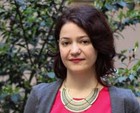
Area Politica internazionale
Competenze: politica estera di vicinato dell'Europa, politica estera russa, relazioni tra Russia e Turchia, relazioni tra UE e Russia
Parole chiave: abbattimento degli inquinanti, area post-sovietica, coronavirus, Covid-19, Covid-19: geopolitica dei vaccini, politica estera, Russia, soft power, Sputnik V, Ucraina, Unione Europea, vaccini
Regione: Lombardia
Funzione/Ruolo
Ricercatrice ISPI
Percorso professionale
Eleonora Tafuro Ambrosetti è research fellow presso l’Osservatorio Russia, Caucaso e Asia Centrale dell’ISPI. In precedenza è stata Marie Curie Fellow presso l'Università tecnica del Medio Oriente (METU) ad Ankara, in Turchia, dove ha anche conseguito un dottorato in Relazioni internazionali. Ha lavorato come ricercatrice presso l'ufficio di Bruxelles della Fondazione per le relazioni internazionali e il dialogo estero (FRIDE) e come assistente di ricerca presso il Centro per gli affari internazionali di Barcellona (CIDOB). Ha conseguito una laurea triennale in Relazioni internazionali presso l'Università del Salento, un Master in Studi europei presso l'Università di Roma Tre e un Master di ricerca in Relazioni internazionali presso l'Istituto di studi internazionali di Barcellona (IBEI). Partecipa a WIIS (Women in International Security), una rete internazionale dedicata ad aumentare l'influenza delle donne nel campo della politica estera e di difesa.
Risultati scientifici
Eleonora Tafuro Ambrosetti è esperta di potenze regionali (Russia e Turchia e loro relazioni con l’UE) e visioni non occidentali delle relazioni internazionali e soft power.
Attività editoriali e pubblicazioni
[2020] Lovotti C., Tafuro Ambrosetti E. e C. A. Hartwell, Russia in the Middle East and North Africa. Continuuity and Change, Routledge. Europa Regional Perspectives Book Series.
[2019] Cherif Y., Lovotti C. e E. Tafuro Ambrosetti, The Role of Russia in the Middle East and North Africa Region. Strategy or Opportunism?, EuroMeSco Joint Policy Study
[2019] Lovotti C. e E. Tafuro Ambrosetti, "How does the European Union perceive Russia's role in the MENA region?", EuroMeSco Joint Policy Study, 12.
[2018] Pishchivoka K. e E. Tafuro Ambrosetti Tensione Russia-Ucraina: cause e conseguenze dellincidente di Kerch, ISPI Analysis
[2017] Tafuro Ambrosetti E. “Linking Status with Soft Power: Call for a joint research agenda”, All Azimuth: a Journal of Foreign Policy and Peace, 7(1): 143-152.
Riconoscimenti e premi
Turkey-EU Future Fellow 2018, Stiftung Mercator
Young Leader, Meeting Russia fellowship 2018, Picreadi Moscow
Marie Curie fellow, 2014-2017, European Commission

Funzione/Ruolo
Professoressa ordinaria di Politica Economica al Politecnico di Milano
Percorso professionale
Si è laureata in Economia Politica presso l'Università Bocconi nel 1988, ha conseguito il Diploma in Advanced International Economic Policy Research presso l'Institute of World Economics di Kiel (Germania) nel 1991, e ha conseguito il dottorato in Scienze Economiche nel 1994.
È Professoressa Ordinaria di Politica Economica presso il Dipartimento di Ingegneria Gestionale del Politecnico di Milano. È anche membro della Giunta dello stesso Dipartimento, con delega agli accreditamenti internazionali, ed è membro del Comitato Scientifico dell’Osservatorio su Export Digitale del Politecnico di Milano. Insegna corsi di Economia, Economia Internazionale e Mercati Internazionali e Istituzioni Europee al Politecnico di Milano nei corsi di laurea triennale, magistrale e post-laurea (MBA, EMBA e PhD). Ha avuto incarichi di insegnamento in Economia Internazionale presso l'Università Bocconi e presso la Scuola Sant'Anna di Pisa, ed è stata numerose volte visiting scholar e visiting professor presso la Ford School of Public Policy dell'Università del Michigan, Ann Arbor (USA).
Sino a luglio del 2019 è stata membro del del comitato scientifico dell’Italian Trade Study Group. Attualmente è senior research fellow presso l'Istituto per gli Studi di Politica Internazionale (ISPI) di Milano, è membro del comitato scientifico dell'Italian Trade Agency (ex-ICE), del comitato scientifico della Fondazione Masi e dello European Trade Study Group. È membro del Comitato di Reggenza della sede di Milano della Banca d’Italia.
Risultati scientifici
È stata coordinatrice di ricerca di progetti di ricerca di rilevante interesse nazionale (PRIN) sull'integrazione europea e sulla posizione competitiva italiana, sul commercio internazionale e sulle politiche commerciali multilaterali. La sua attività di ricerca si concentra su questioni teoriche ed empiriche relative al commercio internazionale e all'integrazione economica tra paesi, in particolare attraverso la frammentazione della produzione internazionale e la partecipazione alle catene globali del valore.
Tra i recenti progetti di ricerca svolti o in corso vi sono: “The use of trade data to understand the market penetration of climate technologies”, progetto finanziato da EBRD; “Misure non tariffarie, standards e certificazioni nel commercio internazionale del 21° secolo, progetto di ricerca finanziato da Accredia; “Le esportazioni digitali delle imprese italiane”, rapporto dell’Osservatorio Export Digitale del Politecnico di Milano con la cooperazione di Italian Trade Agency; “The role of international fragmentation of production in global imbalances during the international financial crisis”, progetto di ricerca di base finanziato dal Politecnico di Milano; “International trade and network analysis”, progetto di ricerca di interesse nazionale finanziato dal MIUR. È membro dell’editorial board della rivista scientifica Plos One, ed è reviewer per numerose riviste scientifiche internazionali.
Attività editoriali e pubblicazioni
Lucia Tajoli ha al suo attivo oltre 100 pubblicazioni. Di seguito le più recenti:
[2021] Stephenson M., Faiz Shaul Hamid M., Peter A., Sauvant K.P., Seric A., Tajoli, L. "More and better investment now! How unlocking sustainable and digital investment flows can help achieve the SDGs", Journal of International business policy, 4(1): 152-165.
[2021] Tajoli L. e C. Piccardi, "The network of international trade in services", Applied network science, 1(68): 1-25.
[2021] Felice G. e L. Tajoli, "Trade balances and global value chains: Is there a link?", Structural change and economic dynamics, 59: 228-246.
[2020] Tajoli L., "Trasformazioni digitali e competitività internazionale delle imprese italiane", Rivista di politica economica, 1: 107-122.
[2020] Tajoli L., "Il mondo economico-finanziario: globale o frammentato?", in Lavori in corso. La fine di un mondo, atto II, a cura di A. Colombo e P. Magri, Ledizioni Ledipublishing, Milano, 51-79.
[2020] Stephenson M., Faiz Shaul Hamid M., Peter A., Sauvant K.P., Seric A., Tajoli L. How the G20 Can Advance Sustainable and Digital Investment, T20 Task Force 1.
[2019] Tantardini M., Ieva F., Tajoli L., Piccardi C., "Comparing methods for comparing networks", Scientific reports, 9(1):1-19.
[2019] Tajoli L., "Le guerre dei dazi: verso la fine della WTO?", in La fine di un mondo. La deriva dell'ordine liberale, a cura di A. Colombo e P. Magri, Ledizioni LediPublishing, Milano, 65-76.
[2018] Tajoli L., "La centralità dei paesi nelle catene globali del valore", in L'Italia nell'economia internazionale. Rapporto ICE 2017-2018. Italian Trade Agency ICE, Roma, 34-41.
[2018] Tajoli, L., De Lombaerde P., Iapadre P., McCranie A., "Using Network Analysis to Study Globalization, Regionalization and Multi-Polarity", Introduction to Special Section, Network Science, 6(4): 517-544.
[2018] Tajoli, L., Piccardi C., "Complexity, centralization, and fragility in economic networks", PLoS ONE, 13 (11): e0208265.
[2018] Tajoli, L., Felice, G., "Global value chains participation and knowledge spillovers in developed and developing countries: An empirical investigation", European Journal of Development Research, 30 (3): 505-532.

Funzione/Ruolo
Senior Research Fellow, Co-head Osservatorio Medio Oriente e Nord Africa, ISPI (Istituto per gli Studi di Politica Internazionale)
Percorso professionale
Valeria Talbot è Senior Research Fellow e Co-Head of dell’Osservatorio su Medio Oriente e Nord Africa dell’Istituto per gli Studi di Politica Internazionale (ISPI). È inoltre docente a contratto al Master in Middle Eastern Studies (MIMES) dell’Alta Scuola di Economia e Relazioni Internazionali (ASERI) dell’Università Cattolica del Sacro Cuore dove insegna Relazioni euro-mediterranee. Dal 2015 al 2017 è stata docente di Storia e Istituzioni del Medio Oriente presso l’Università IULM di Milano. Da alcuni anni coordina i corsi brevi dell’ISPI su “Europa e Mediterraneo” e “I paesi del Golfo: crisi, sfide e diversificazione economica”, dove svolge anche attività di docenza. Inoltre, ha effettuato docenze presso il Master Doing Business nel Mediterraneo e in Medio Oriente del Nuovo Istituto di Business Internazionale (NIBI) della Camera di Commercio di Milano e in altri corsi di formazione.
È invitata a conferenze e seminari in Italia e all’estero sulle tematiche di sua competenza, su cui viene inoltre intervistata dai media italiani e stranieri.
Dopo la laurea in Scienze Politiche presso l’Università di Catania, ha conseguito un Master of Philosophy in Relazioni internazionali presso il Graduate Institute of International Studies di Ginevra.
Risultati scientifici
I suoi principali filoni di ricerche si concentrano sulle dinamiche politiche e di sicurezza nell’area del Mediterraneo allargato, con un focus particolare sul ruolo degli attori esterni, sulle trasformazioni socio-politiche innescate dalle cosiddette Primavere arabe del 2011, sulla politica della Turchia in Medio Oriente e verso l’Asia, sulle monarchie del Consiglio di Cooperazione del Golfo (GCC) e sulla crisi intra Golfo.
Dal 2015 lavora attivamente alla realizzazione della Conferenza annuale Rome MED Dialogues che ISPI organizza con il Ministero degli Esteri. Tra le altre cose, si occupa del coordinamento scientifico del MED Report, che raccoglie le analisi di esperti italiani e internazionali sulle questioni dell’area del Mediterraneo e del Medio Oriente.
Dal 2016 Valeria Talbot cura il rapporto trimestrale “Focus Mediterraneo allargato” realizzato dall’ISPI per l’Osservatorio di Politica Internazionale del Parlamento italiano e del Ministero degli Esteri e della Cooperazione internazionale, per il quale negli anni ha contributo anche con lavori ad hoc sulla Turchia e sulle relazioni euro-mediterranee.
Dal 2013 al 2016 è stata coordinatrice scientifica per l’ISPI di Arab Trans, un progetto triennale finanziato dalla Commissione europea nell’ambito del Settimo programma quadro. Il progetto, che ha coinvolto un consorzio di dodici membri tra università e centri di ricerca europei e arabi, ha analizzato le trasformazioni socio-politiche in sette paesi arabi basandosi su dati dei survey condotti in sette paesi arabi (Algeria, Egitto, Giordania, Iraq, Libia, Marocco e Tunisia). Dal 2013 collabora alla realizzazione dell’Atlante geopolitico Treccani-ISPI. Dal 2010 al 2016 è stata coordinatrice scientifica del progetto Med&Gulf Executive Briefings, svolto in collaborazione con Intesa Sanpaolo e Promos Camera di Commercio di Milano, per le aziende e gli enti italiani interessati alle opportunità di business nell’area del Mediterraneo allargato.
Attività editoriali e pubblicazioni
Valeria Talbot ha coordinato e curato numerosi progetti di ricerca confluiti in diversi tipi di pubblicazione. Scrive commentary e articoli in italiano e inglese per ISPI e riviste online e cartacee.
Dal 2007 al 2011 è stata coordinatrice editoriale della rivista dell’ISPI Quaderni di Relazioni internazionali.
Tra le sue principali pubblicazioni:
[in corso di pubblicazione] Abbot P., Maggiolini P., Talbot V., Teti A., The EU’s Southern Neighbourhood Policy after the Arab Uprisings - A Failure Foretold,Palgrave.
[2019] Talbot, V., Lovotti, C. (a cura di), The Role of Russia in the Middle East and North Africa Region. Strategy or Opportunism?, EuroMeSCo Joint Policy Study n. 12
[2018] Talbot, V., Torelli, S. M. (a cura di), Building Trust: the Challenge of Peace and Stability in the Mediterranean, ISPI MED Report.
[2018] Talbot, V. (a cura di), Turkey: Towards a Eurasian Shift?, ISPI Report.
[2017] Talbot, V., Torelli S. M. (a cura di), Looking Ahead: Charting New Path for the Mediterranean, ISPI MED Report.
[2017] Talbot, V., Fasulo F., "The MENA Region: Where the Belt Joins the Road", in Amighini A. (a cura di), China’s Belt and Road: a Game Changer?, ISPI Report.
[2017] Talbot, V., Frappi C., La politica estera della Turchia, Rapporto per il Parlamento italiano e il Ministero degli Affari Esteri e della Cooperazione Internazionale.
[2017] Teti, A., Maggiolini, P., Talbot, V. and Abbot, P., "MENA Populations' Perceptions of Key Challenges, International context, and the Role of the European Union", Arab Transformations, Working Paper n. 9.
[2016] Talbot, V., Torelli, S. M. (a cura di), Leaving the Storm Behind: Ideas for a New Mediterranean. ISPI MED Report.
[2015] Talbot, V., Lovotti, C., Il rilancio della cooperazione euro-mediterranea, Rapporto per il Parlamento italiano e il Ministero degli Affari Esteri e della Cooperazione Internazionale.
[2015] Talbot, V. (a cura di), The Rising Gulf. The New Ambitions of the Gulf Monarchies, ISPI Report.
[2015] Talbot, V. (a cura di), The Uncertain Path of the New Turkey, ISPI Report.

Funzione/Ruolo
Professoressa Ordinaria all’Istituto Niels Bohr dell’Università di Copenhagen, Copenhagen, Danimarca
Percorso professionale
Irene Tamborra ha conseguito la Laurea Triennale in Fisica nel 2005 e la Laurea Magistrale in Fisica Teorica nel 2007, entrambe all’Università di Bari. Presso la stessa università, ha ottenuto il Dottorato di Ricerca con una tesi in Fisica Astroparticellare nel 2011. È stata Alexander von Humboldt Research Fellow presso il Max Planck Institute for Physics a Monaco di Baviera dal 2011 al 2013 e ricercatrice al Centro di Eccellenza GRAPPA dell’Università di Amsterdam dal 2013 al 2015. Si è trasferita all’Università di Copenhagen nel 2016 come Knud Højgaard Assistant Professor. È stata promossa Professoressa Associata nel 2017 e Professoressa Ordinaria nel 2021.
Risultati scientifici
La sua ricerca è all’intersezione tra l’astrofisica e la fisica delle particelle. Irene Tamborra ha proposto numerose idee per esplorare vari oggetti astrofisici tramite delle particelle elementari chiamate neutrini. La sua ricerca ha anche l’obiettivo di connettere la fisica che avviene all’interno delle sorgenti astrofisiche a livello microscopico alle osservazioni multi-messaggere su larga scala. Parte del lavoro di ricerca di Irene Tamborra è incentrato sulle oscillazioni di sapore dei neutrini, specialmente nel contesto delle sorgenti astrofisiche compatte e dell’universo primordiale, dove i neutrini sono estremamente abbondanti. Si occupa anche di esplorare l’origine degli elementi in ambito astrofisico e l’esistenza di nuova Fisica oltre quella prevista dal Modello Standard delle Particelle Elementari. Nel 2014, ha scoperto una nuovo fenomeno che avviene poco prima dell’esplosione di una supernova: LESA. LESA non è altro che una asimmetria macroscopica nell’emissione di neutrini e antineutrini elettronici ed è tuttora oggetto di intensa attività di ricerca.
Attività editoriali e pubblicazioni
Irene Tamborra è autrice di numerose pubblicazioni scientifiche. La lista completa è disponibile online, su Google Scholar.
Riconoscimenti e premi
Nel 2009 ha ricevuto il premio “Antonio Stanghellini” dalla Società Italiana di Fisica. Nel 2011 ha ricevuto la menzione di onore per il premio “Fubini” del’Istituto Italiano di Fisica Nucleare; nello stesso anno è diventata “Alexander von Humboldt Fellow”. Nel 2019 è stata eletta “Distinguished Associate Professor” dalla Fondazione Carlsberg, ha ricevuto il premio “MERAC” dalla Società Astronomica Europea e il premio “S. P. Duggal” dall’Unione Internazionale di Fisica Pura e Applicata. Nel 2020, ha ricevuto il premio per le “Donne in Fisica” dal Network Danese di Donne in Scienza. Irene Tamborra è membro dell’Unione Internazionale degli Astronomi, della Società Astronomica Europea e ricopre incarichi di rilievo in numerose commissioni internazionali.



